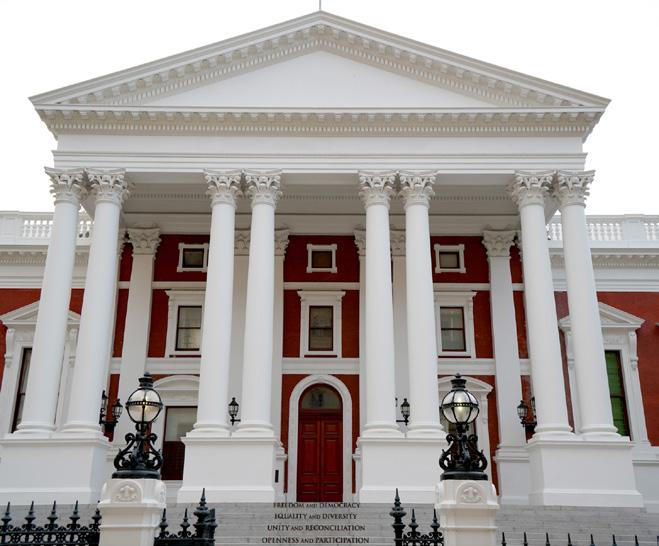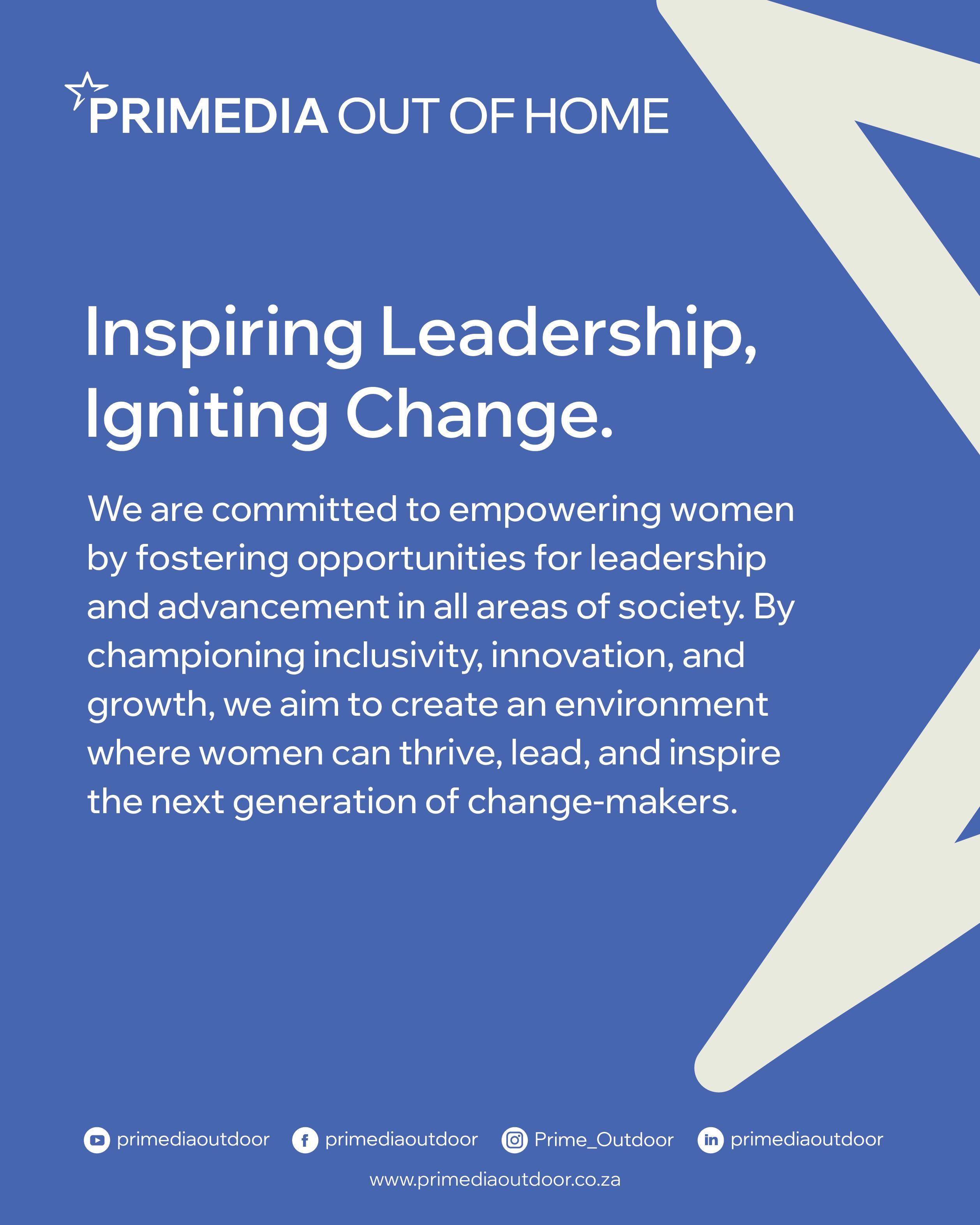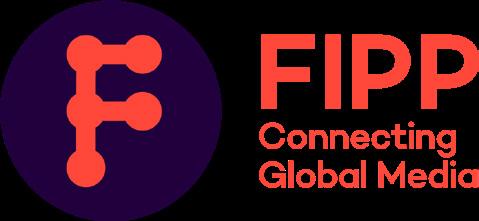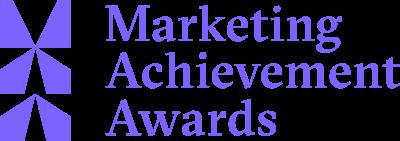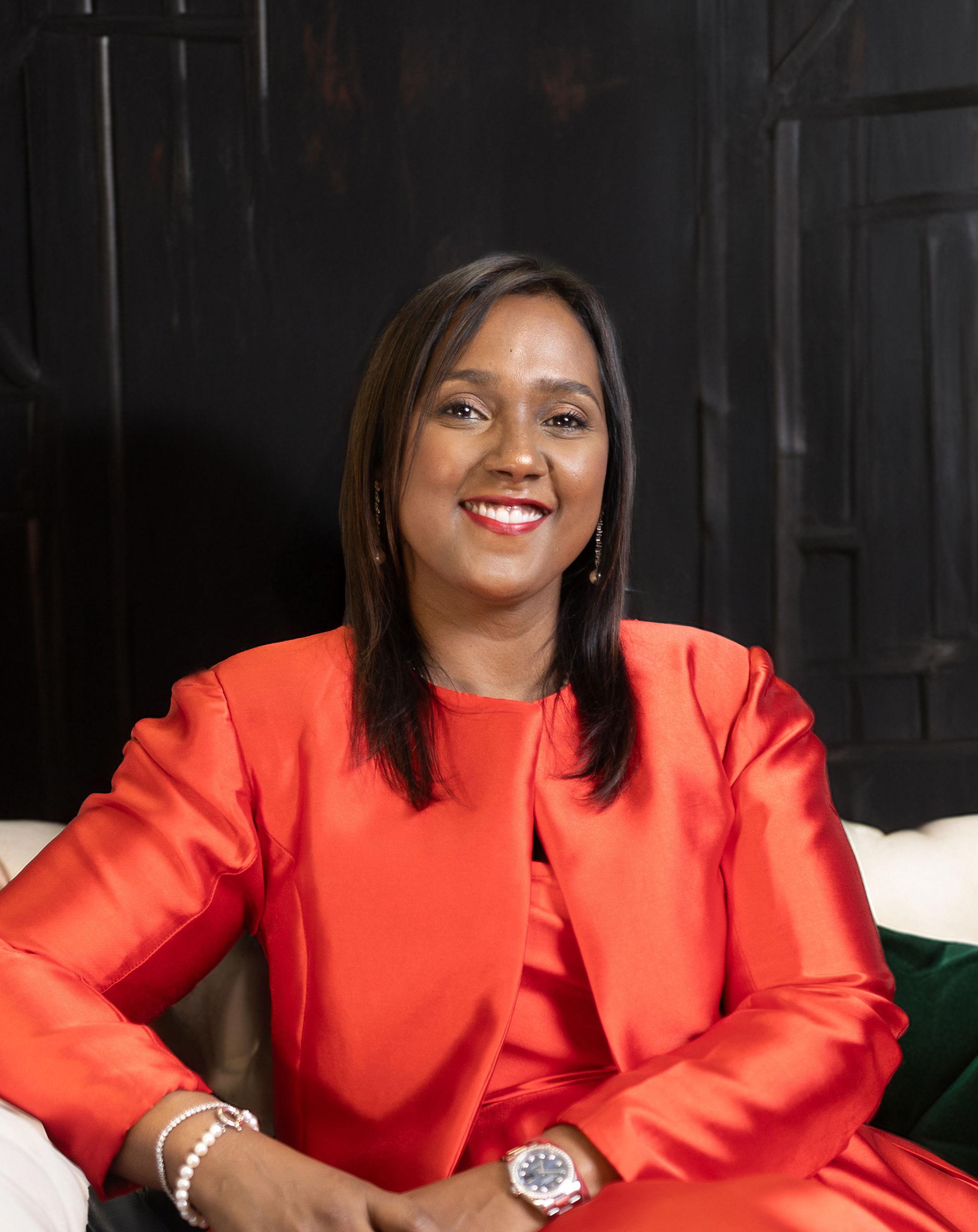

Proothveerajh
Hon Mmapaseka Steve Letsike
Deputy Minister DYWP
WOMEN IN LEADERSHIP
Hon Bernice Swarts
GROWING GOLD
South Africa wins big
The Chelsea Flower Show

800 DELEGATES | 60+ SPEAKERS | 40 EXHIBITORS
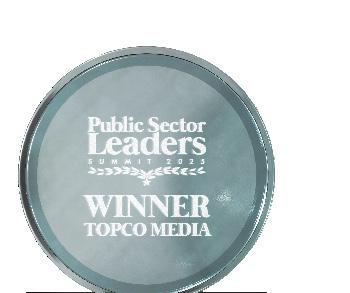
Hon. Senzo Mchunu gives his Ministral Address at Topco Media’s annual Future of Sustainabiliy Conference in 2024
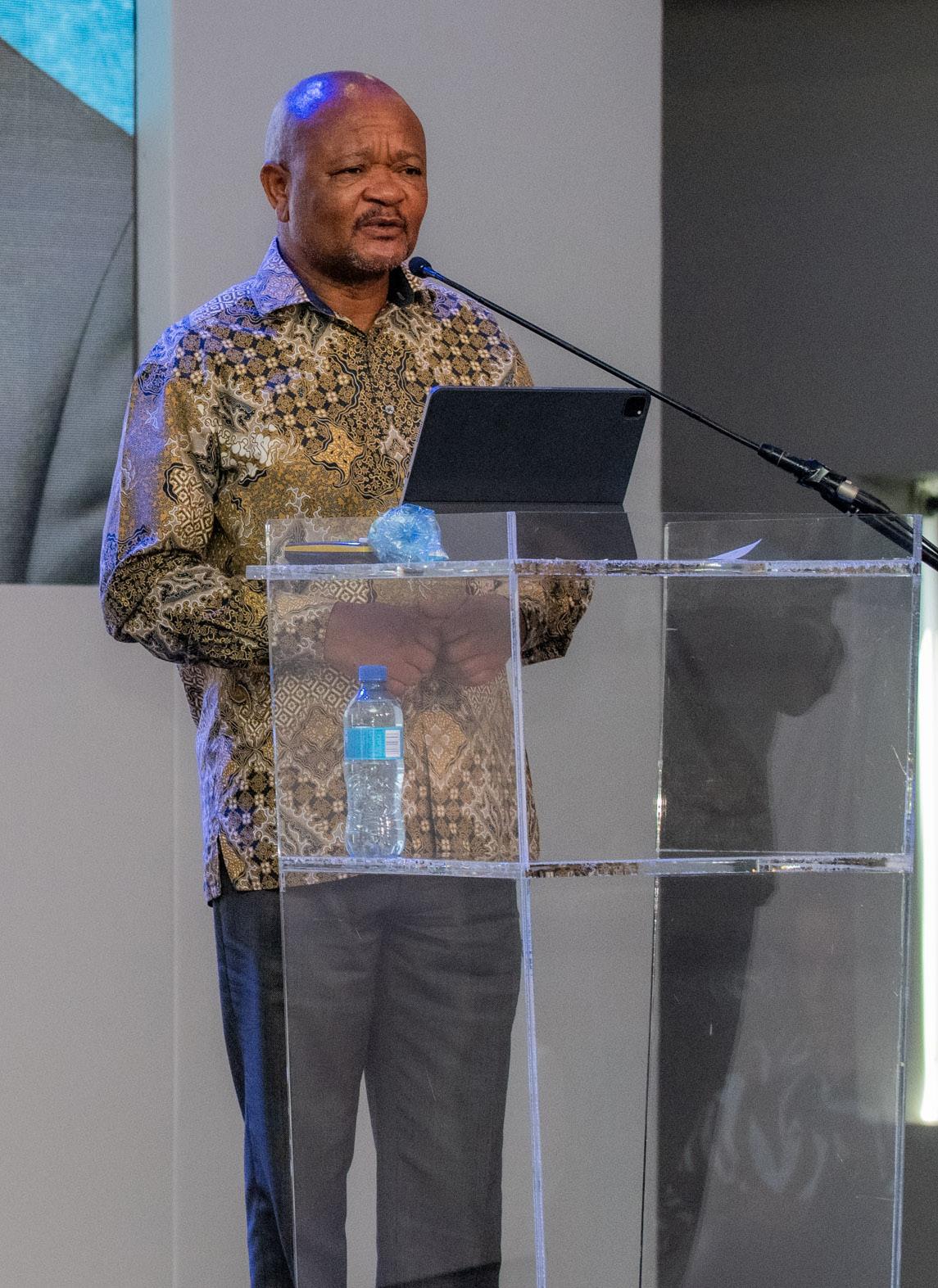

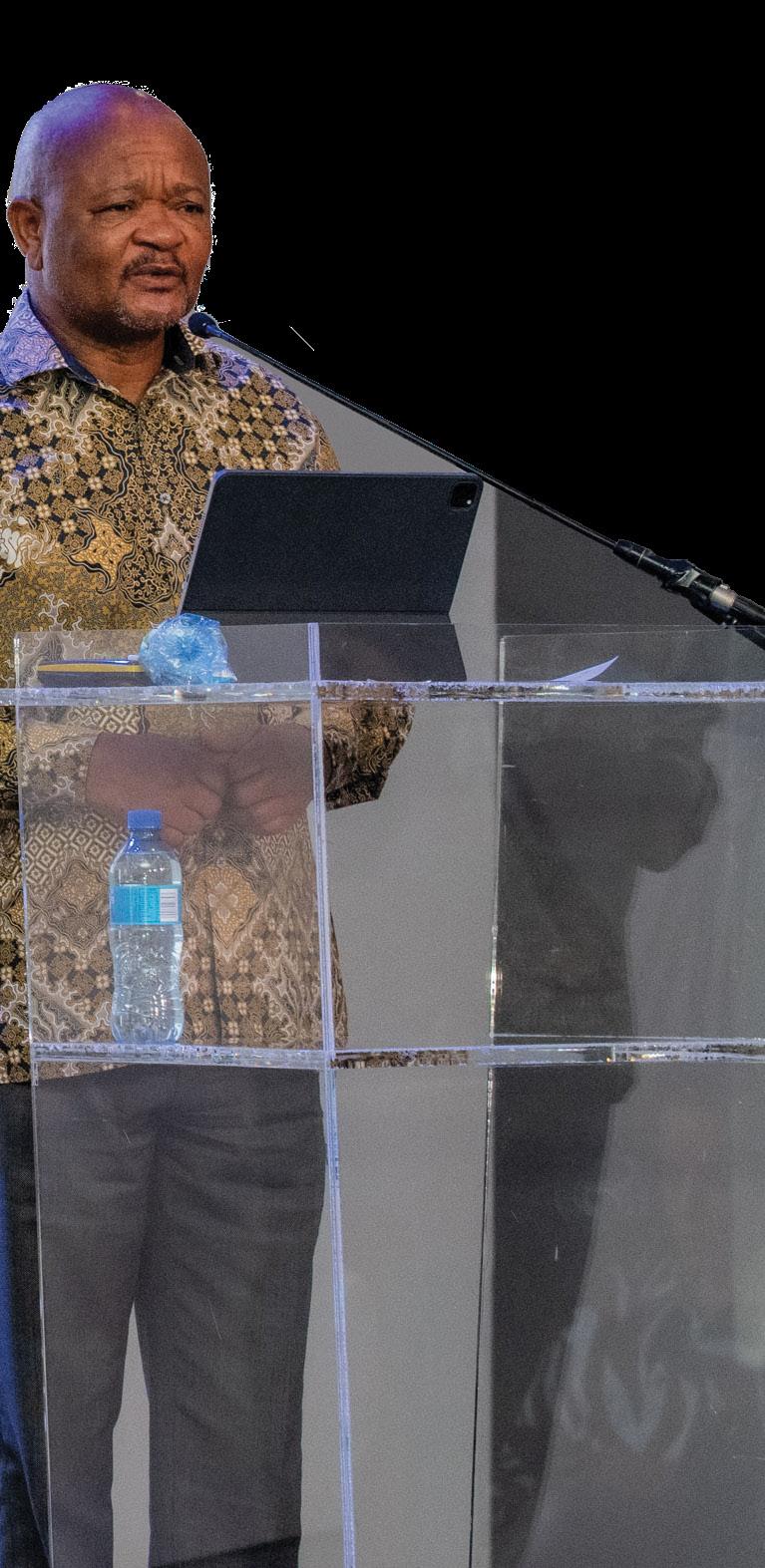
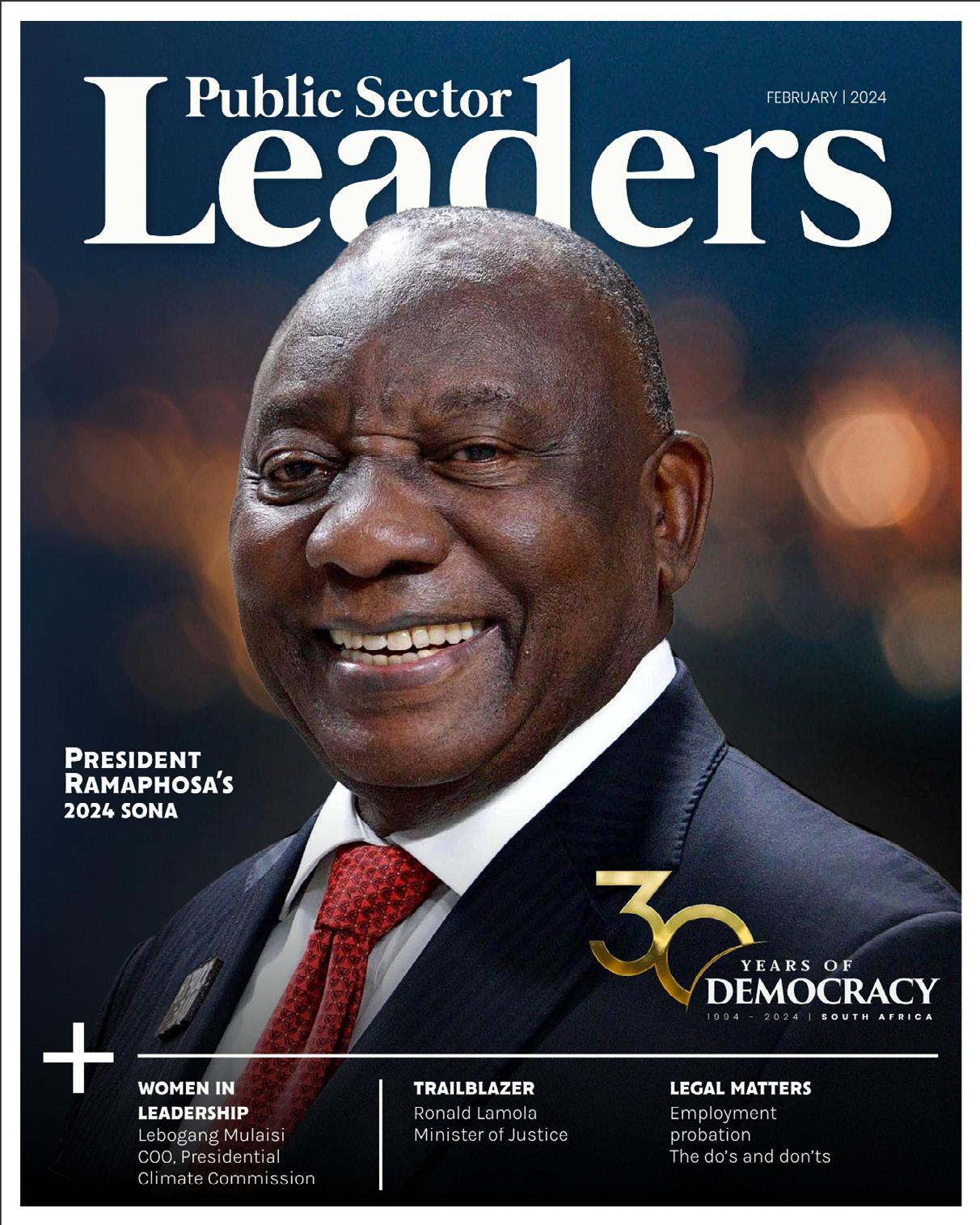


20 AWARD WINNERS | 100 FINALISTS


2025
The Public Sector Leaders Summit is a highly respected and prestigious cross-government programme, recognising and celebrating the wealth of inspirational individuals and innovative projects within the Public Sector.
In 2025 Topco Media launches this unique and empowering 2-Day Conference & Awards highlighting best practice right across government, sharing innovation, learning and leadership. 3-4 SEPTEMBER 2025 | EMPERORS PALACE, JHB
For more information Contact:

Harnessing Africa’s superpowerthe private sector - to unlock economic potential 24 | Investing in youth in the age of AI
Economic growth through digital skills
32 | Discovery Green and Sasol
Ampli Energy A game-changer for South Africa’s renewable energy landscape

Bonjour Paris - Reaching out and strengthening bilateral and economic ties
38 | The Chelsea Flower Show
From soil to stand - celebrating South Africa as “the flower basket of Africa”
on advancing young people during Youth Month
A robust first quarter for South Africa’s agricultural sector
Strengthening
Hon. Mmapaseka Steve Letsike: A relentless force for equality and human rights in South Africa
Powering a sustainable future: Renewable energy and its impact on the Northern Cape
50 | Operation Vulindlela Phase II Reforms for a green and digital future 54 | Air quality in South Africa Balancing energy needs with health

world’s strongest man: Rayno Nel - South African Atlas
pocket guide to Budget 3.0
Fixed-term contracts: Balancing flexibility with fairness in the workplace 68 |
Mind over muscle: How mental health influences performance and physical wellbeing 70 | Upcoming Events
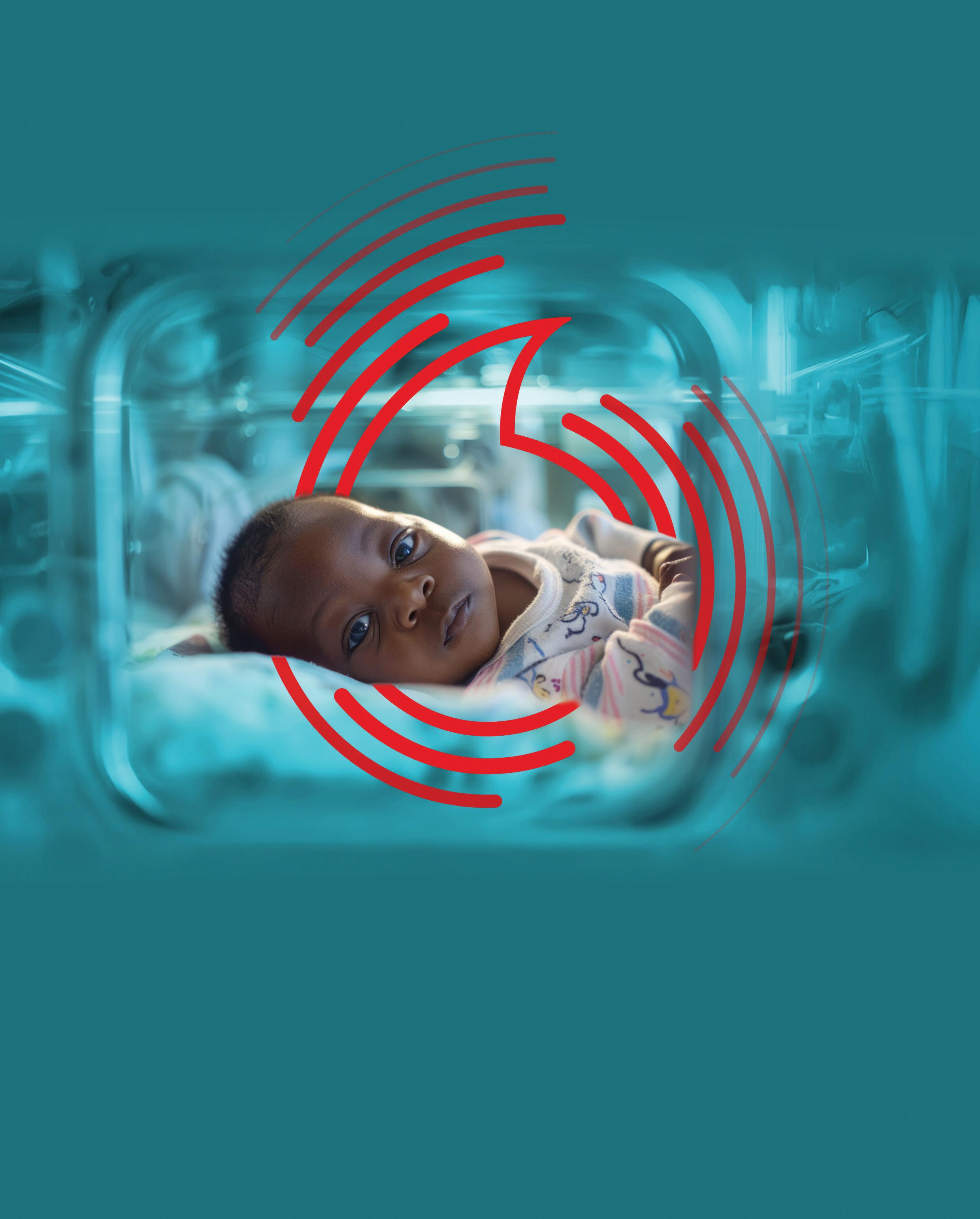

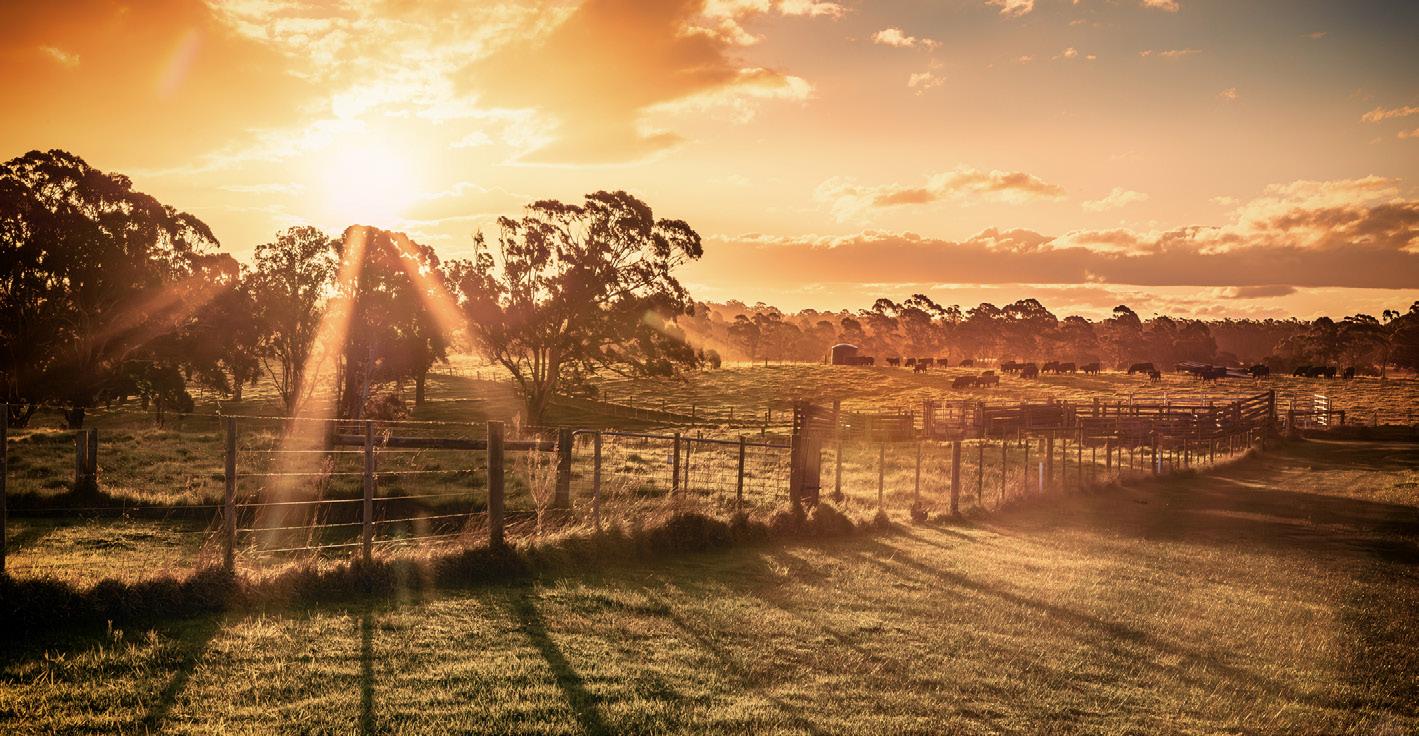
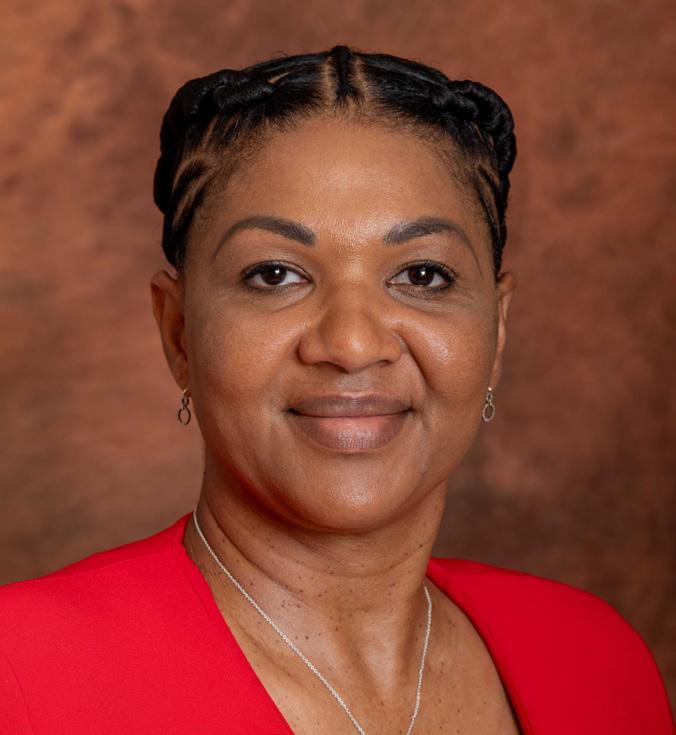
CREDITS
PUBLIC SECTOR LEADERS
The Digimag For Leaders In The South African Public Sector Fully Accredited Member of ABC

Advertising Sales, Distribution and Subscriptions
Top Media & Communications (Pty) Ltd
Tel: 086 000 9590 info@topco.co.za | www.topco.co.za
CEO Ralf Fletcher
TOPCO STUDIO
Production Director
Van Fletcher van.fletcher@topco.co.za
Group Editor
Fiona Wakelin fiona.wakelin@topco.co.za


Deputy Editor
Koketso Mamabolo koketso.mamabolo@topco.co.za
Assistant Editor
Shumirai Chimombe shumirai.chimombe@topco.co.za
Contributors
Jessie Taylor
Wandile Sihlobo
Design
Tashwell Brown
Traffic Manager
Daniël Bouwer artwork@topco.co.za
SALES
National Project Manager
Emlyn Dunn Tel: 072 1263962 emlyn.dunn@topco.co.za
Brand Coordinator
Sidney Phiri sidney.phiri@topco.co.za
Printers LAW Print
Images iStock / Unsplash / GCIS | Flickr
Digital Publishing Platforms Issuu Magzter Media Carrier
Head Office
Top Media & Communications (Pty) Ltd T/A Topco Media Elkay House, 186 Loop St Cape Town
Tel: +27 86 000 9590
Fax: +27 21 423 7576
Email: info@topco.co.za Website: www.topco.co.za (ScanQRcodebelowtoviewwebsite) 46

DISCLAIMER
All rights reserved. No part of this publication may be reproduced, stored in a retrieval system or transmitted, in any form or by any means, electronic, mechanical, photocopying, recording or otherwise, without the prior written consent of Top Media & Communications (Pty) Ltd T/A Topco Media. Reg. No. 2011/105655/07. While every care has been taken when compiling this publication, the publishers, editor and contributors accept no responsibility for any consequences arising from any errors or emissions.
EDITOR’S LETTER
BY FIONA WAKELIN
Letter from the Editor
Welcome to the June edition of Public Sector Leaders (PSL)

In his letter to the nation on June 9, President Ramaphosa referenced the 70th anniversary of the Freedom Charter and its aspiration that the wealth of the country should be shared by all – which is also reflected in our Constitution. Speaking to the current global “poly-crisis” of conflict, economic stagnation, mistrust in institutions and environmental degradation, His Excellency urged the country to reinforce the measures that we have put in place to drive transformation.
“Since 1994 we have built a robust legislative framework to advance the transformation of our economy,
anchored in the Broad-Based Black Economic Empowerment Act and the Employment Equity Act. The progress we have made is undeniable. We have seen real changes in ownership patterns, including more businesses owned by women. We have seen changes in management control, enterprise development and skills development,” H.E. Ramaphosa.
Our cover icon this month is Videsha Proothveerajh, Vodacom Business Director:
“Vodacom Business is working with municipalities to manage the consumption and delivery of services, such as water and electricity, through digital technology,” - Videsha Proothveerajh.
June celebrates Youth and the Environment, so it is only fitting that our Trailblazer is Mmapaseka Steve Letsike, Deputy Minister in the Department of Youth, Women and Persons with Disabilities; and our Woman in Leadership is Bernice Swarts, Deputy Minister in the Department of Forestry, Fisheries and Environment.
Ravi Naidoo, CEO of Youth Employment Services brings you a fascinating take on preparing our youth for the opportunities offered by the AI revolution; and the article on Operation Vulindlela Phase II brings us up to date on this second wave of reform for more rapid and inclusive economic growth.
Further afield we take a look at the Africa CEO Forum which was held in Abidjan, Côte d’Ivoire and brought together 3 000 public and private sector decision-makers, including Heads of State, for two days of discussions regarding doing business on our continent. The South-Africa France Investment Conference in
Paris, attended by Deputy President Paul Mashatile was organised by the South African Embassy in France and Brand South Africa, and aimed at strengthening bilateral relations between the two countries.
The Springboks are not our only green and gold champions: this year we –“the flower basket of Africa” – again won gold at the Chelsea Flower Show! Continuing with all things environmental, we zoom in on the air quality in SA and the launch of Ampli Energy by Discovery Green in partnership with Sasol.
In Legal Matters you will find all you need to know about contractual agreements - and Financial Fitness takes a look at how budget 3.0 affects your pocket. Our Regional Focus is Northern Cape and Sporting Action celebrates the world’s strongest man Rayno Nel - South African Atlas. Finally, our regular, In Other News, unpacks safeguarding the nation by strengthening fraud prevention in the public sector.
We wish you well on Youth Day.
From myself and our amazing team, we hope you enjoy the read.

ADDRESSING THE NATION
BY FIONA WAKELIN
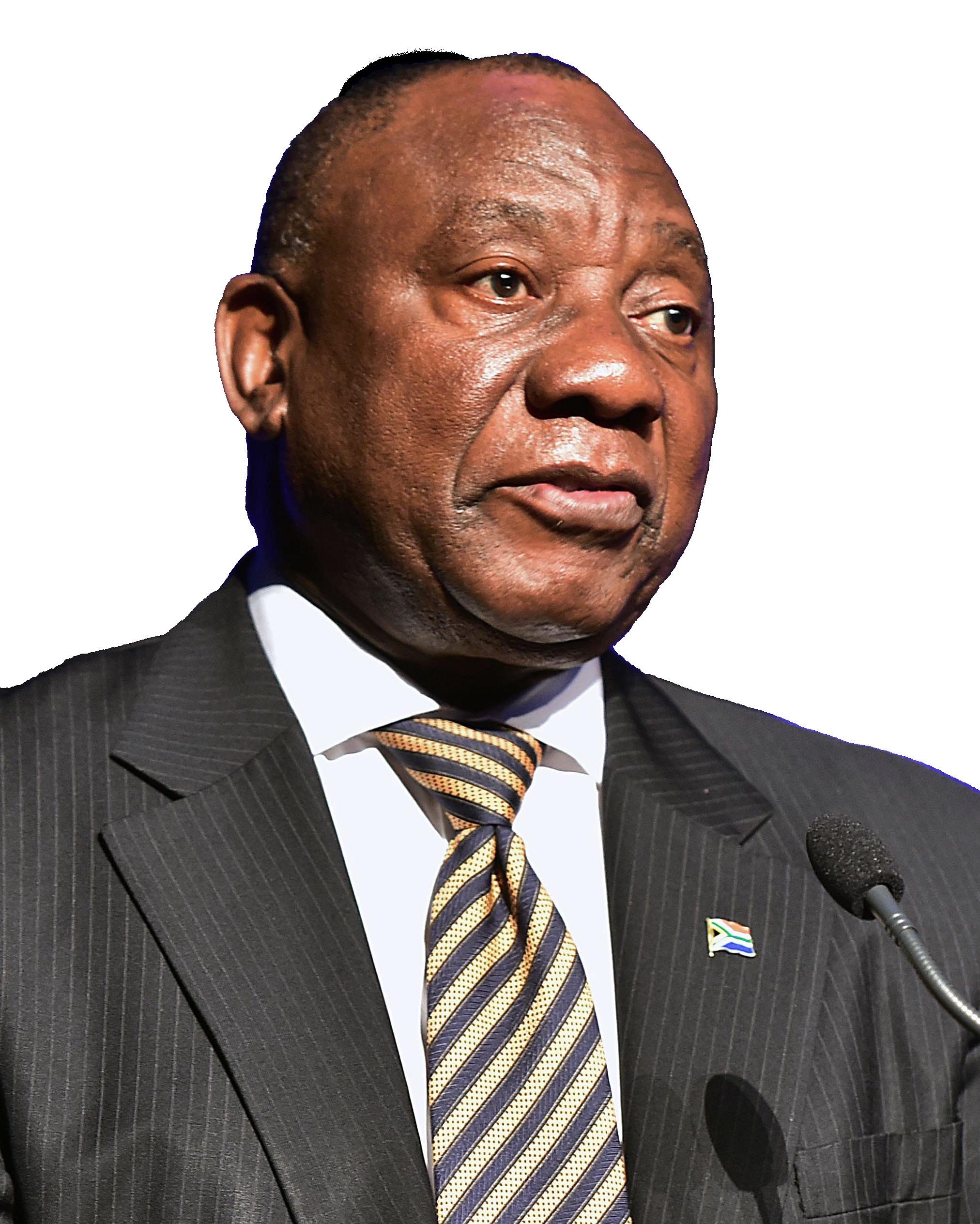

Black empowerment is vital to inclusive economic growth
In his letter to the nation on June 9, President Ramaphosa referenced the 70th anniversary of the Freedom Charter and its aspiration that the wealth of the country should be shared by all – which is also reflected in our Constitution. This segued into the importance of broad-based black economic empowerment - not just a policy choice but a constitutional imperative.
Speaking to the current global “poly-crisis” of conflict, economic stagnation, mistrust in institutions and environmental degradation, His Excellency urged the country to reinforce the measures that we have put in place to drive transformation.
“Since 1994 we have built a robust legislative framework to advance the transformation of our economy, anchored in the Broad-Based Black Economic Empowerment Act and the Employment Equity Act. The progress we have made is undeniable. We have seen real changes in ownership patterns,
including more businesses owned by women. We have seen changes in management control, enterprise development and skills development,” H.E. Ramaphosa.
Between 2006 and 2023, black African households experienced real income growth of 46%, coloured households of 29% and Indian households of 19% - Statistics SA.
However, despite this progress, the average income of white households is still nearly five times higher than that of black African households.
“Transformation is not a favour. It is a necessity. The inequality of our past continues to shape the lives of millions of black South Africans. And yet many who continue to benefit from the legacy of exclusion continue to decry black economic empowerment and are even challenging it in our courts. We must dispense with the false notion that we must make a choice between growth and transformation. Economic growth without transformation entrenches exclusion, and transformation without growth is unsustainable.
“We also need to challenge the notion that broad-based black
economic empowerment is a cost to the economy. It is actually an investment in the economy,” – President Ramaphosa.
Hi Excellency went on to note the importance of initiatives like the Black Industrialists Programme, the Transformation Fund - and the role the private banks have to play in ensuring affordable financing to unlock the potential of black business.
“Through mechanisms like the Public Procurement Act, we must ensure that businesses owned by women, young people and persons with disabilities enjoy expanding opportunities. We must ensure that transformation reaches into every sector, whether it is mining, construction, energy, IT or agriculture. The private sector should use their supply chains far more deliberately to empower many more black-owned businesses, not just to improve their BBBEE scorecard, but to grow and diversify their supplier base.
“I call on all South Africans, and in particular the private sector, to recommit to economic transformation. Let us move forward with greater urgency, unity and ambition, to build a South Africa where all can truly share in the country’s wealth,” – President Ramaphosa.
Partnerships and digitalisation key to building a nation that works for all
South Africa’s progress depends on inclusive innovation and strong partnerships. Videsha Proothveerajh, Director of Vodacom Business, shares how technology is driving real change across communities and industries
Earlier this year, President Cyril Ramaphosa called for a South Africa that works for all – one that is inclusive, innovative, and resilient. Achieving this vision requires a collective effort across all sectors of society. Collaboration between the public and private sectors is essential, as such partnerships play a pivotal role in driving national progress.
“At Vodacom Business, we have long championed this approach, recognising that the challenges our nation faces are too complex for any single entity to tackle alone. By combining the strengths of both sectors with the power of digital technology, we can improve service delivery, unlock economic potential, and drive meaningful innovation,” says Videsha Proothveerajh, Director of Vodacom Business
Tackling infrastructure challenges Infrastructure challenges pose significant threats to economic growth and social stability in
South Africa. In particular, a secure, reliable water supply is an urgent priority. The private sector can innovate and partner with government to help resolve this crisis.
“Vodacom Business is working with municipalities to manage the consumption and delivery of services, such as water and electricity, through digital technology. Our smart utilities management system makes use of connected smart meters to provide real-time information on consumption. This can also help to improve accurate billing and revenue collection for residents and has been extended to include fleet management. These solutions not only improve service delivery but also help mitigate financial losses where inefficiencies can be costly,” Proothveerajh explains.
Enabling citizen engagement Digital platforms are also instrumental in fostering citizen engagement, accountability, and inclusivity, she adds. “Vodacom Business has been at the forefront of enabling digital democracy through our e-government solutions. By providing technology that streamlines service delivery, facilitates communication between citizens and government,
and improves access to essential information, we are helping to create a more engaged and informed society.”
For example, the Citizen Engagement app enables two-way communication and collaboration between citizens and municipalities, including logging service requests and tracking their progress. Such initiatives empower communities and ensure that governance is not only top-down but also responsive to the needs of the people.
“As we look to the future, these digital engagement tools will be crucial in strengthening the social contract between government and citizens.”
Empowering small businesses for economic growth
To achieve economic growth, increased support is needed for small and medium enterprises (SMEs) and for the informal economy, which sustains millions of jobs and livelihoods across South Africa. This includes streamlining funding for small businesses, unlocking venture capital for high-growth startups, and developing a regulatory environment that enables rather than restricts informal enterprises.
“Significantly, many of these businesses struggle to scale due to limited access to digital tools and financial assistance, hindering their meaningful contributions to our economy. At Vodacom Business, we are providing these enterprises with the resources they need to thrive in the digital age. Our tailored solutions for SMEs include mobile, fixed, IoT, cloud, and hosting services, which are designed to boost business productivity and growth. Vodacom’s dedication to financial inclusion through mobile money services is empowering entrepreneurs and allowing them to access financial services that were previously out of reach,” says Proothveerajh.
Digitalisation as a force of change
Digitalisation can enhance critical industry sectors and change lives, from smart agriculture solutions that improve food security to telemedicine platforms that drive access to essential healthcare. “By investing in connectivity and digital solutions that address key societal issues, we can ensure that no one is left behind in South Africa’s development journey. But to achieve this, we need continued collaboration between government, the private sector, and civil society to overcome challenges and accelerate progress. At Vodacom Business, we remain a committed partner in helping to build a nation that works for all.”
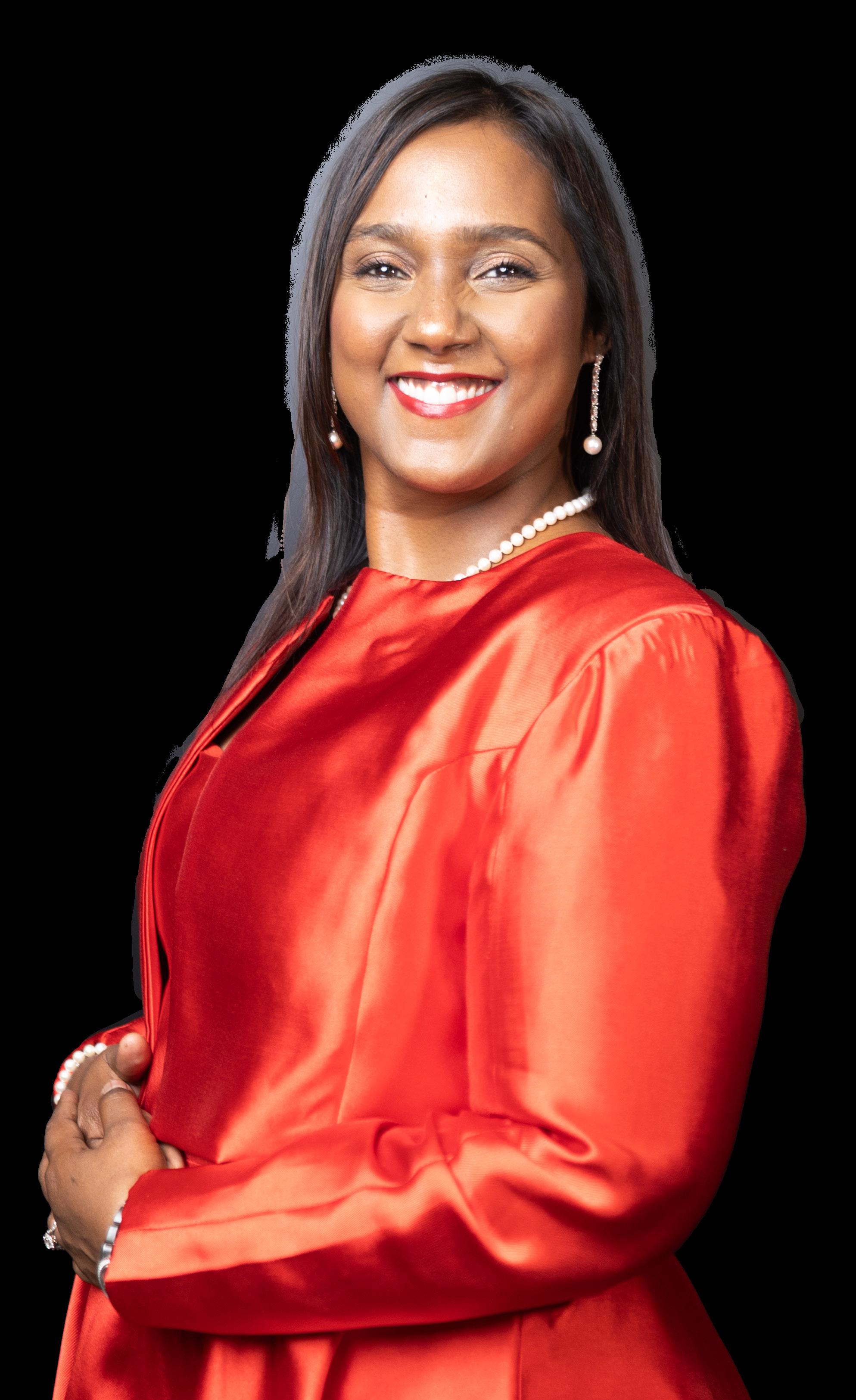
Videsha Proothveerajh, Vodacom Business, Director

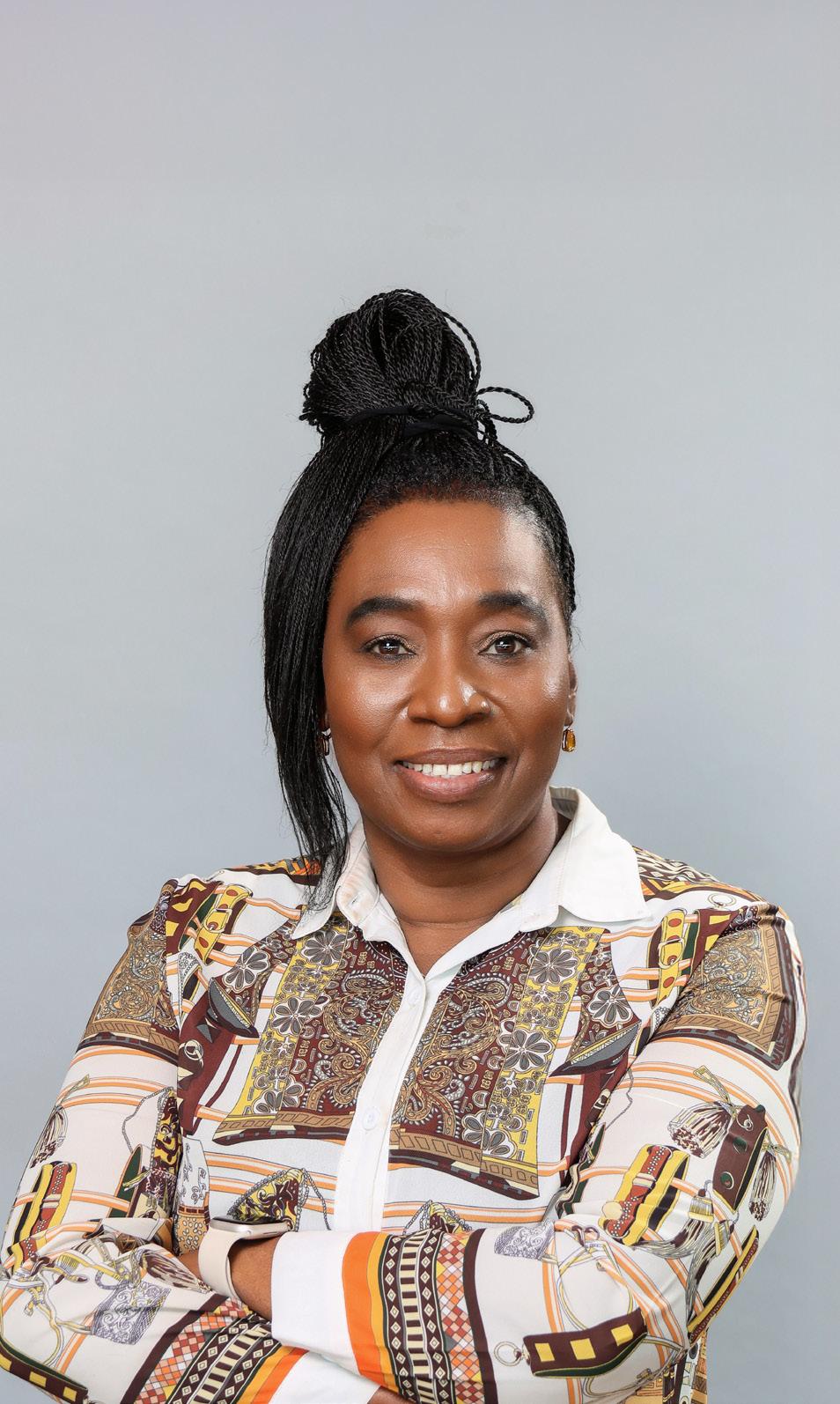
Dinah Kheswa, Vodacom Business, Acting Managing Executive: Public Enterprise
Imagine a city where your water and electricity usage is tracked in real time, your service complaints are quickly resolved through an app, and ambulances arrive faster because they are digitally dispatched. This vision of a connected, efficient, and responsive city isn’t a dream for the distant future – it’s already becoming a reality in parts of South Africa, thanks to digital innovation from Vodacom Business.
“We aim to use our experience and expertise in understanding government needs to achieve their smart city goals. Through a partnership with the National Treasury, we are part of a fiveyear national contract that brings cutting-edge digital solutions to municipalities across the country. This includes digitalising utilities management, healthcare, education and
Vodacom Business is helping South African cities get smarter
security, streamlining operations, enhancing efficiencies and improving the lives of citizens,” says Dinah Kheswa, Acting Managing Executive: Public Enterprise.
Vodacom Business offers a smart utilities management system, which uses connected smart meters to give real-time insights into consumption. This not only helps municipalities manage supply and reduce waste, but also helps residents receive accurate bills and improved service. The system has been extended to include fleet management, helping cities maintain their vehicles more efficiently, reducing costs and increasing assetlifespan.
For residents needing to report issues or track service requests, Vodacom Business has developed and deployed the Citizen Engagement app. It opens up two-way communication and collaboration between citizens and municipalities, making it easier to log complaints, monitor progress, and stay informed.
Technology has been effectively leveraged as a solution for improving critical access to healthcare. The cloud-based Stock Visibility Solution by Vodacom Business helps health facilities monitor medication supplies to avoid shortages, while the AitaHealth mobile platform empowers community health workers to deliver preventative
care directly to homes. Other digital initiatives from Vodacom Business to support healthcare delivery include a Computer Aided Dispatch system, which improves ambulance response times by tracking each request from the start of the call to delivery of the patient at their destination.
In the education space, Vodacom Business has developed digital solutions to streamline admissions and improve communication and visibility between schools, district management and provincial offices. Vodacom’s e-learning tools are helping teachers and learners stay connected, whether in the classroom or at home, and contribute to better educational outcomes.
Public safety is another area where technology from Vodacom Business is making an impact. Internet of Things (IoT) solutions such as firearm tracking, geofencing, and body-worn cameras equip law enforcement and security personnel to respond to critical situations in real time, prevent illicit activities and keep communities safer.
“By enabling the growth of smart cities, we are turning public services into public successes and supporting the government to utilise the power of technology to better serve citizens and create an inclusive digital society in South Africa,” concludes Kheswa.
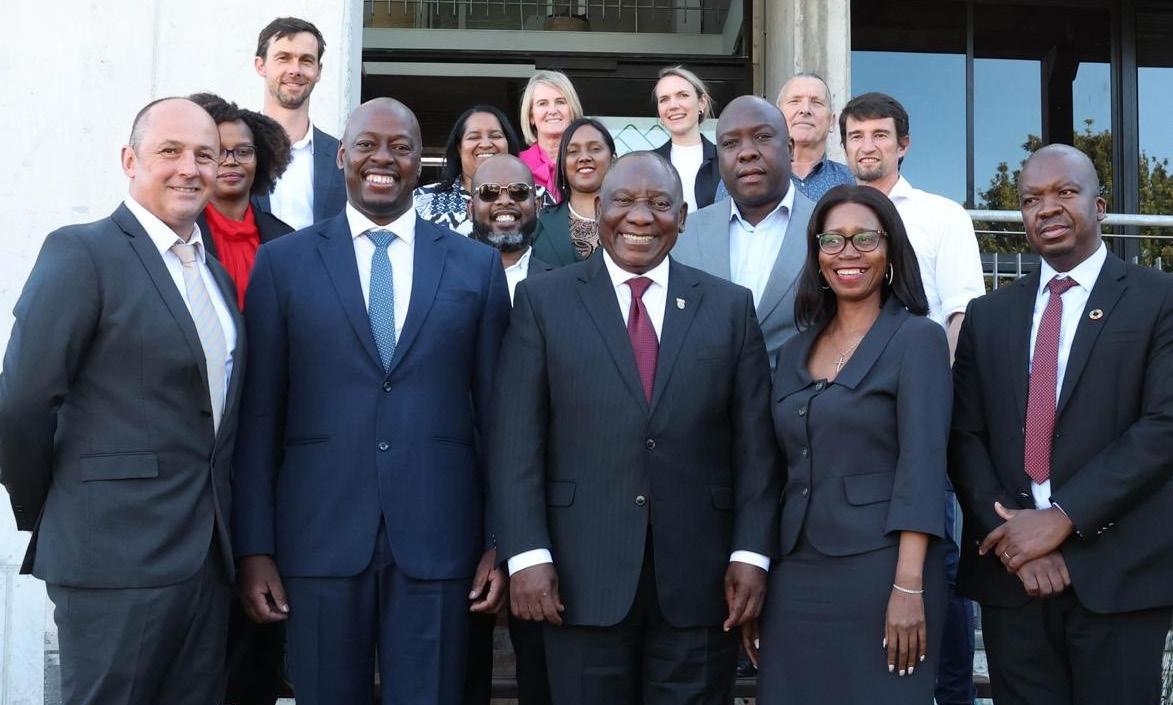
Using technology to tackle Gauteng’s water crisis
Water is a vital resource, but for many in Gauteng, reliable access is becoming more uncertain. Ageing infrastructure, high levels of water loss, and rising demand are putting severe pressure on the province’s supply system. Vodacom Business is helping to address these growing water security challenges by using smart technology to support better water management in the region.
“Our commitment to digital transformation extends beyond connectivity – we believe in using our technology capabilities to drive sustainable impact,” says Videsha Proothveerajh, Director of Vodacom Business.
“In partnership with the Strategic Water Partners Network (SWPN), we are rolling out an innovative digital solution called the Digital Water Tower. Developed with Vodacom subsidiary Mezzanine, this platform provides real-time data to help water suppliers and municipalities track usage, detect leaks, and make quicker, more informed decisions. The aim is
to reduce water losses and keep the taps running for everyone in Gauteng.”
Currently, the province suffers from high water losses, with nearly 40% of the supply lost due to infrastructure failures, theft, and inefficiencies. According to the Department of Water and Sanitation, South Africans use 64 litres per day more than the global average. Supply constraints are expected to persist until 2028, pending the completion of Phase Two of the Lesotho Highlands Water Project (Polihali Dam). Furthermore, ageing and outdated municipal infrastructure have led to weaker revenue recovery and increased water losses.
To address these issues, the Digital Water Tower enables collaboration between citizens, municipalities and other stakeholders for long-term water security. The first phase will bring together different types of existing data, such as meter readings, consumption
patterns, and network maps in one place. This allows for a holistic view of how water is being used and managed, from supply to demand. In the second phase, the digital platform will perform impact assessments, identifying areas where interventions are needed and which solutions will make the biggest impact. With real-time visibility and specific insights, the Digital Water Tower will help with efficient water monitoring and management, improving consumer and supplier services, and increasing revenue assurance.
The initiative supports the broader efforts of the Platform for a Water Secure Gauteng (PWSG), launched in 2024. This multistakeholder collaboration, led by the Department of Water and Sanitation, Rand Water, and local municipalities, encourages public and private sector partnerships, such as with Vodacom Business, to find solutions to the water crisis.
“At Vodacom, our purpose is to connect everyone to a better future through partnerships that use technology as a force for good,” adds Proothveerajh. “Integrating smart solutions into water management will help improve efficiency, reduce losses, and ensure reliable water access, providing sustainable benefits for the Gauteng communities we serve.
“With smarter systems in place, it is possible to make a real difference – not just in how water is delivered today, but in how we secure it for generations to come.”
In November 2024, Vodacom and Mezzanine hosted a showcase event featuring cutting-edge digital solutions aimed at solving socio-economic and environmental challenges. The meeting was attended by President Cyril Ramaphosa, who has encouraged members of his government to visit Vodacom to experience these innovative solutions.

Peter Malebye, Vodacom Business, Chief of Sales
Vodacom Business enhances public safety with IoT-enabled asset management
An estimated 1 800 government-issued firearms are being lost or stolen every year, according to the latest reports. If these types of assets enter the illicit market and land in the wrong hands, they can pose a significant risk to citizen safety and the country at large. Protecting, monitoring and ensuring the authorised use of service firearms is therefore critical.
“In an era where the public sector increasingly relies on technology to enhance efficiency, reliability and accountability, Vodacom Business is providing digital tools to help manage these important assets and enhance public safety,” says Peter Malebye, Chief of Sales at Vodacom Business.
“These Internet of Things (IoT) solutions enable law enforcement and security agencies to track and monitor assets and ensure a trail of accountability as they move through the system. The technology streamlines and digitises record-keeping and provides real-time insights into the status of inventory.”
Vodacom Business’s IoT security solution, called ‘Peacemaker’, developed in partnership with IoT. nxt, is a comprehensive firearm management system. It tracks, monitors, and traces weapons to help prevent theft, unauthorised use, and loss. Tracking items in real-time provides continuous visibility of firearms, offering reliable information on location, status, and usage, such as gunshots. This feature aids in
protecting these assets, facilitates quicker recovery of lost or stolen firearms, and deters unauthorised use. The Peacemaker data enables thorough monitoring, analysis, evaluation, and decision-making. By tracking firearm movements and usage, authorities can identify trends, improve procurement and planning, enhance patrolling, and optimise resource use. This information allows for proactive risk reduction, such as flagging unusual activity for investigation to prevent illegal diversion of firearms.
“Importantly, the IoT platform ensures secure, reliable connectivity from the device to the management system. The data is collected and stored in a centralised system, enabling records to be updated and shared seamlessly on a secure private cloud, increasing the effectiveness of public sector asset management,” explains Malebye.
In addition to individual firearms, Vodacom Business’s IoT solutions provide opportunities to track, monitor, and maintain transparency on other essential public sector assets, including vehicles, equipment, and personnel. This technology offers a real-time overview of these assets, enabling agencies to allocate resources efficiently and respond swiftly to incidents, thereby potentially saving lives.
“As IoT technologies continue to evolve, their impact will only grow, with new possibilities to protect and serve the public and make a positive difference to society. Vodacom Business remains committed to being a trusted partner of the public sector and businesses of every size. Working together can help to open new opportunities through technology and build a digital society that leaves no one behind,” concludes Malebye.
The rollout of smart meters in Naledi Municipality: A game changer for
utility management
The Naledi Local Municipality in the North West Province of South Africa has undergone a transformative change with the rollout of smart meters. This initiative, spearheaded by a collaboration between the municipality, Vodacom, smart meter provider Ontech, and IoT solution specialists Macrocomm, has significantly improved the municipality’s ability to manage its electricity supply and revenue collection.
The RT 29 Smart Metering Project was established to assist municipalities in revenue collection, protection, and generation, paving the way for improved utility management and accelerated service delivery. The project involved the deployment of over 6 000 smart meters across the Naledi municipality, with a particular focus on overcoming meter tampering and bypassing.
According to Modisenyane Thompson Segapo, the Municipal Manager of Naledi Local Municipality, “We have already deployed 6 000 meters. We know they’re tamper-free. We have more than a thousand meters that were bypassed just in the Vryburg area.” This deployment has been instrumental in addressing the high levels of electricity losses, which previously stood at 26%, far above the norm of 5%. The introduction of smart meters has had a profound impact on the Naledi Local Municipality. One of the most significant benefits has been the improvement in revenue collection. Clifton J. Groep, the Mayor of Naledi Local Municipality, highlighted this by stating, “In the past, the
municipality was bleeding in terms of electricity sales. This technology has changed our lives as a municipality for the better. It helps us with accurate billing.”
The smart meters have also enhanced the municipality’s ability to detect and prevent tampering. Mayor Groep noted, “Meters are so advanced it helps us to detect before anyone tampers with the meter, the meter will notify us so that we block and minimise any losses.” This capability has been a game changer, reducing the financial strain caused by electricity theft and enabling the municipality to maintain payments on its Eskom account. Vodacom played a pivotal role in the successful rollout of smart meters in Naledi. The tech-co’s involvement extended beyond providing the necessary technology; it also included developing an app that allows residents to procure electricity through their banking systems. Kagiso Maruping, the Chief Financial Officer of Naledi Local Municipality, explained, “When this project came to effect, the Vodacom team had already developed an app for people to procure electricity through their banking systems. And it is the safest app that we can get in terms of procuring, in terms of purchasing electricity.”
Peter Malebye, Vodacom Business Chief of Sales, highlighted the importance of collaboration in the project’s success: “The problem that smart metering is addressing is a big challenge. It’s not going to take one company, it’s going to take an ecosystem that is well experienced in their part. So it’s all about collaboration.”
Divhane Munyai, Director of Technical Services at Naledi Local Municipality, praised the partnership between the municipality, Ontech, Macrocom, and Vodacom: “We went to Macrocom and said, ‘Allow us to lead. And then you guys follow, we’ll show you where the meters are missing.’ It was a beautiful collaboration between Naledi Local Municipality, Ontech, Macrocom, and Vodacom.”
Svi Moodley, Group Chief Executive Officer of Macrocom, echoed this sentiment, emphasising the project’s focus on sustainability and economic development: “The other important thing that Macrocom has done is to focus on ensuring that we take people from the local communities, train them, create a whole training programme so that people will have sustainable jobs going forward.”
The rollout of smart meters in Naledi Local Municipality has been a resounding success, bringing about significant improvements in utility management and revenue collection. This initiative has not only addressed the municipality’s financial challenges but also paved the way for future advancements in service delivery.
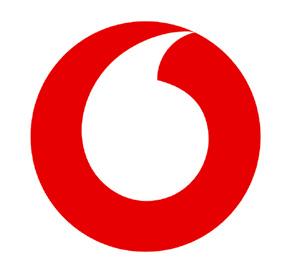
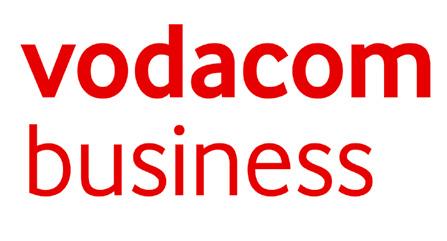
BY SHUMIRAI CHIMOMBE

African Development Bank annual meetings 2025
Making Africa’s capital work better for its development
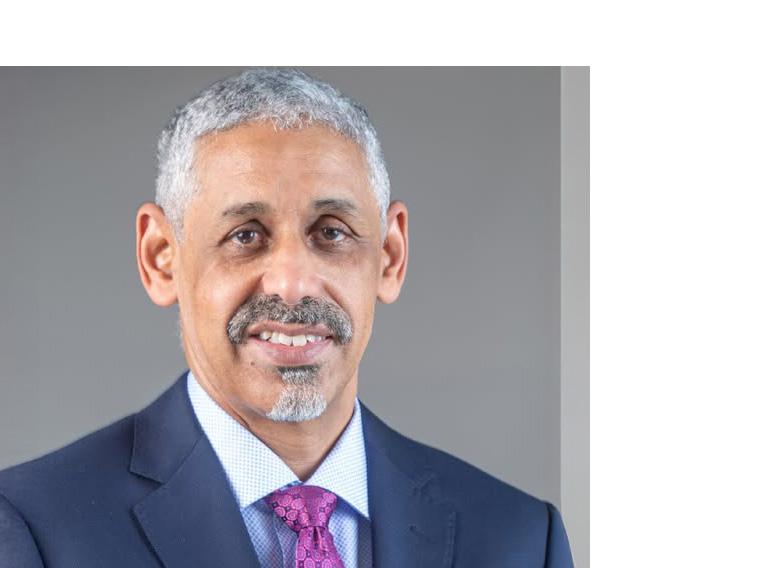
AfDB milestones to date
96.2 million - people with better access to water and sanitation
28.4 million - people connected to electricity
12.8 million - farmers equipped with technology to resist climate change
1.4 million - companies financially supported
+17 500km - transborder routes
+9 300km - public transportation
Source: AfDB
Dr. Sidi Ould Tah: President-elect of the African Development Bank Group
A new era for the AfDB
The African Development Bank Group (AfDB) held its 2025 Annual Meetings from 26 to 30 May in Abidjan, Côte d’Ivoire for five days of meetings and discussions on Africa’s development landscape. Over 5000 delegates and participants from over 91 countries participated in the meetings, the largest attendance in the Bank’s history. The theme of the meetings was ‘ Making Africa’s Capital Work Better for Africa’s Development’ - a clarion call for leaders to ditch aid and look inwards to Africa’s rich capital to solve its development and economic challenges.
A significant highlight was the election of Dr Sidi Ould Tah of Mauritania as the new President of the AfDB on 29 May. He will assume office on 1 September for a five-year term, taking over from the current President, Dr Akinwumi Adesina, who will step down after completing the maximum two five-year terms in office.
Tah was elected by the Bank’s Board of Governors, comprising Finance and Economy Ministers or Central Bank Governors of the Bank Group’s 81 regional and non-regional member countries. These comprise 54 African countries (regional members) and 27 non-African countries (nonregional members).
According to a statement by the AfDB, Tah brings over 35 years of experience in African and international finance. A former Minister of Economic Affairs and Finance of Mauritania, he has held senior roles in multilateral institutions and has led crisis response, financial reform, and innovative resource mobilisation for Africa. He also served as
president of the Arab Bank for Economic Development in Africa (BADEA) for 10 years from 2015, where he led a full transformation that quadrupled the Bank’s balance sheet, secured a AAA rating, and positioned it among the top-rated development banks focused on Africa.
Addressing the Bank Group’s governors and the media shortly after the announcement, Tah said, “Let’s go to work now, I’m ready!”
In his closing remarks at the end of the meetings, the outgoing President Dr Adesina said that while the Annual Meetings are always a good time for reflection and the connections are a lot of fun (apparently, there was a lot of dancing in between serious discussions), it is also a good time for an aperture into the Bank’s work. It is a special time as the Governors of the Bank gather to better understand, review, discuss and provide guidance in key priority areas of the Bank’s finances and operations. They are also able to assess the delivery, results and impact of its work in all the regional member countries and to discuss emerging development trends and how they affect Africa, and the role of the Bank.
“It has been the greatest honour of my life to serve as President of the African Development Bank Group and to serve Africa”, he concluded.
Placing the continent in the driving seat of its own development
The theme of the annual meetings, ‘Making Africa’s Capital Work Better for Africa’s Development’ highlighted the ambition to place Africa
in the driving seat of its own development and strengthen its resilience in the face of upcoming obstacles.
In a video curtain raiser showcasing the African economic outlook, the AfDB said that the landscape is changing with global uncertainties, shifting aid priorities and geopolitical tensions. The continent stands at a crossroads.
“Africa has what it takes to finance its own development agenda, using our own capital. Not by loans, not through aid but with its domestic resources. Africa currently finances 80% of its development locally. Now what if the continent allocated its resources more effectively? It’s time. Together let’s use homegrown resources to create the Africa we want.”
The AfDB elaborated that this theme will enable the Bank to collaborate with regional member countries to identify opportunities, and implement specific policies to make Africa’s capital (human, natural, financial, and commercial) the main driver of structural transformation, and the transition to more inclusive, greener, and more resilient economies. The policies will also leverage external capital flows from diverse partnerships to complement Africa’s development financing needs.
Leveraging Africa’s enormous wealth
In another video shown during the opening plenary session the Bank highlighted that:
“The AfDB Group changes the everyday life of millions of Africans. Innovative, resilient and impact-driven, the last 10 years especially were made of
BY SHUMIRAI CHIMOMBE
bold actions and remarkable changes designed to build an even stronger Africa by leveraging enormous resources and potential. Rich agricultural land and minerals, industrious and resilient people, our vast natural resources, abundant clean energy.
“Young, educated, vibrant and creative Africans are the architects building and shaping the future of our continent. Our financial tools and our investments fund our growth. Our trade networks, our regional cooperation, and our soft power connect Africa to Africa and to the world. Too often Africa’s capital tends to work harder for others than for Africa, but we can make a difference and change the narrative. Yet the answer is closer to home. It is within us. It’s in our soils, our forests, our banks, at the heart of our population. That means reforming our institutions, mobilising more domestic resources, and building trust in our financial systems.”
Some key highlights from the meetings
The AfBD launched its first edition of Integrate Africa Magazine (I.A.M.) on 26 May. The magazine celebrates 10 years of investing in integration, and showcases how African governments are investing in building connectivity in collaboration with the Bank. In addition to profiling 12 transformative projects funded by the AfDB including transport corridors, one-stop border posts, power pools, rail, ports, agriculture,
pharmaceutical production, pandemic responses, it tells a story of development impact, giving a glimpse into how Africa is driving its integration and forging effective partnerships to go to scale.
On 29 May the AfDB and the Finance Ministry of Nigeria signed a protocol agreement committing $500-million over 15 years to extend the Nigeria Trust Fund (NTF). The NTF, the third arm of the Bank Group, is a self-sustaining revolving fund set up to assist the development projects of the Bank’s low-income regional member countries whose economic and social conditions require concessional financing. Nigeria provided the additional $500 million. Since its establishment in 1976 the NTF has supported 92 operations across 33 countries in critical sectors including agriculture, energy, water and sanitation, education, and transport.
The Islamic Republic of Mauritania and the AfDB signed three new financing agreements totaling nearly $30-million to boost climate resilience, improve sustainable water resource management, and promote women’s entrepreneurship.
• $9.32-million grant from the Climate Action Window of the African Development Fund to support women-led cooperatives by financing the development and equipping of agricultural initiatives.
• $17.98-million, is a concessional loan under
the Bank’s Transition Support Facility to enhance access to water resources for vulnerable rural communities, addressing both climate resilience and livelihood security.
• $1.9-million grant from the Global Environment Facility (GEF) aimed at reducing hazardous pollutants such as persistent organic pollutants and mercury. The project will invest in national capacity building, the adoption of clean technology, and ecosystem protection.
The AfDB and the Government of Togo signed financing agreements worth a total of $38.9-million to support the development of climate-resilient infrastructure for farmers in the country’s Special Agro-Industrial Processing Zones. The financing includes a $29-million grant from the Green Climate Fund, administered by the Bank, and a $9.9-million loan from the Bank.
The Governors representing The Gambia, Ghana, Liberia, Sierra Leone, and Sudan collectively pledged $16-million to the next replenishment of the African Development Fund (ADF), the concessional window of the AfDB. According to the Bank, the increased pledges, up from a collective $5-million in the previous cycle, signalled the growing commitment among African countries to bolster home-grown financing solutions.
Reflections by some key players in Africa’s development
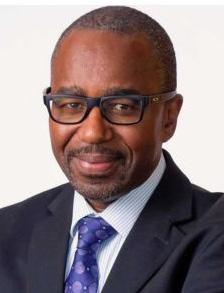
“The continent of Africa is endowed with a lot of resources. First of all we are getting enough sun, more than any other continent I think. We have water, very big rivers and waterfalls that we could be able to equip to hydropowers . And we also have geotherm which, if used properly, can power the whole continent. “
- Dr. Kenneth F. Masuki - Deputy Managing Director at ITRACOM Fertilisers Ltd, Tanzania
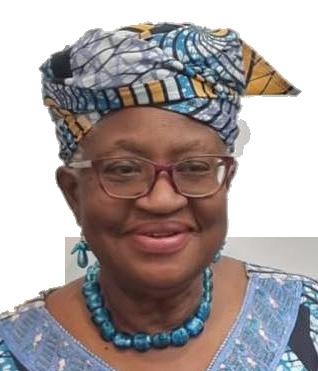
“In an aging world, Africa’s growing young population offers tomorrow’s workforce and markets” - Dr Ngozi Okonjo-Iweala - Director General, World Trade Organisation (WTO)
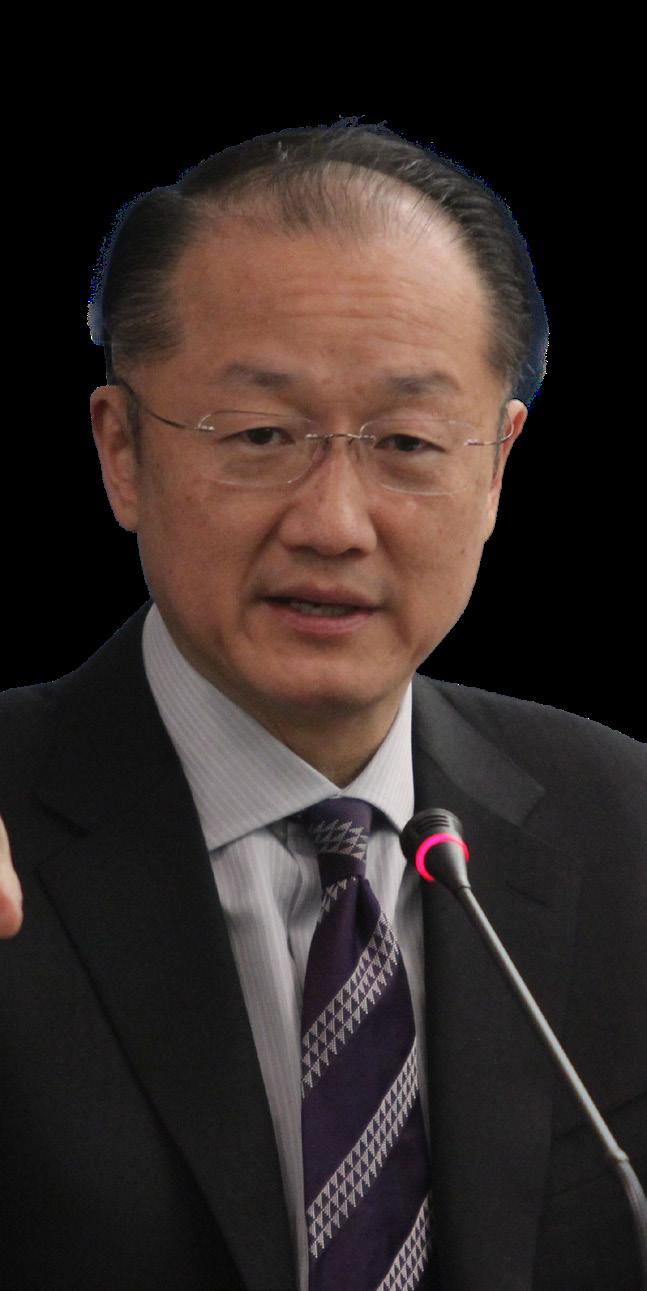
“There are wonderful opportunities in Africa but we’re going to have to do a lot more and a lot more together to realise the promise of bringing the kinds of private sector funds that Africa deserves”
- Jim Yong Kim- Former President of the World Bank
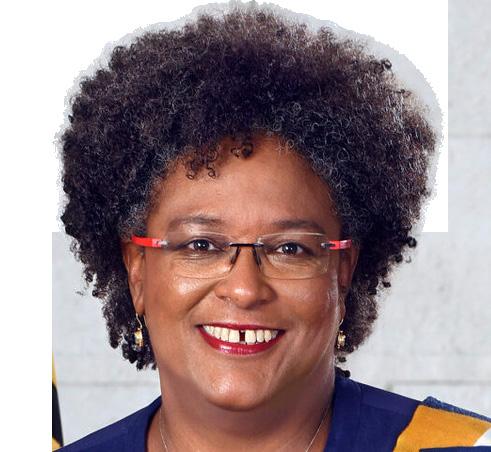
‘It is we who shall forge the manner in which we cooperate, integrate and invest rather than simply being victims of a past history” - Mia Mottley, Prime Minister of Barbados
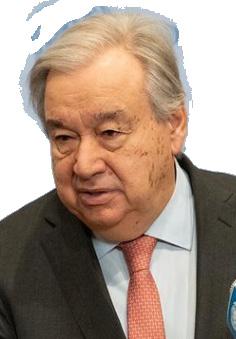
“And we will keep pressing together for an international financial architecture that is no longer outdated, dysfunctional and unfair. “ - Antonio Guterres, UN Secretary General
BY SHUMIRAI CHIMOMBE
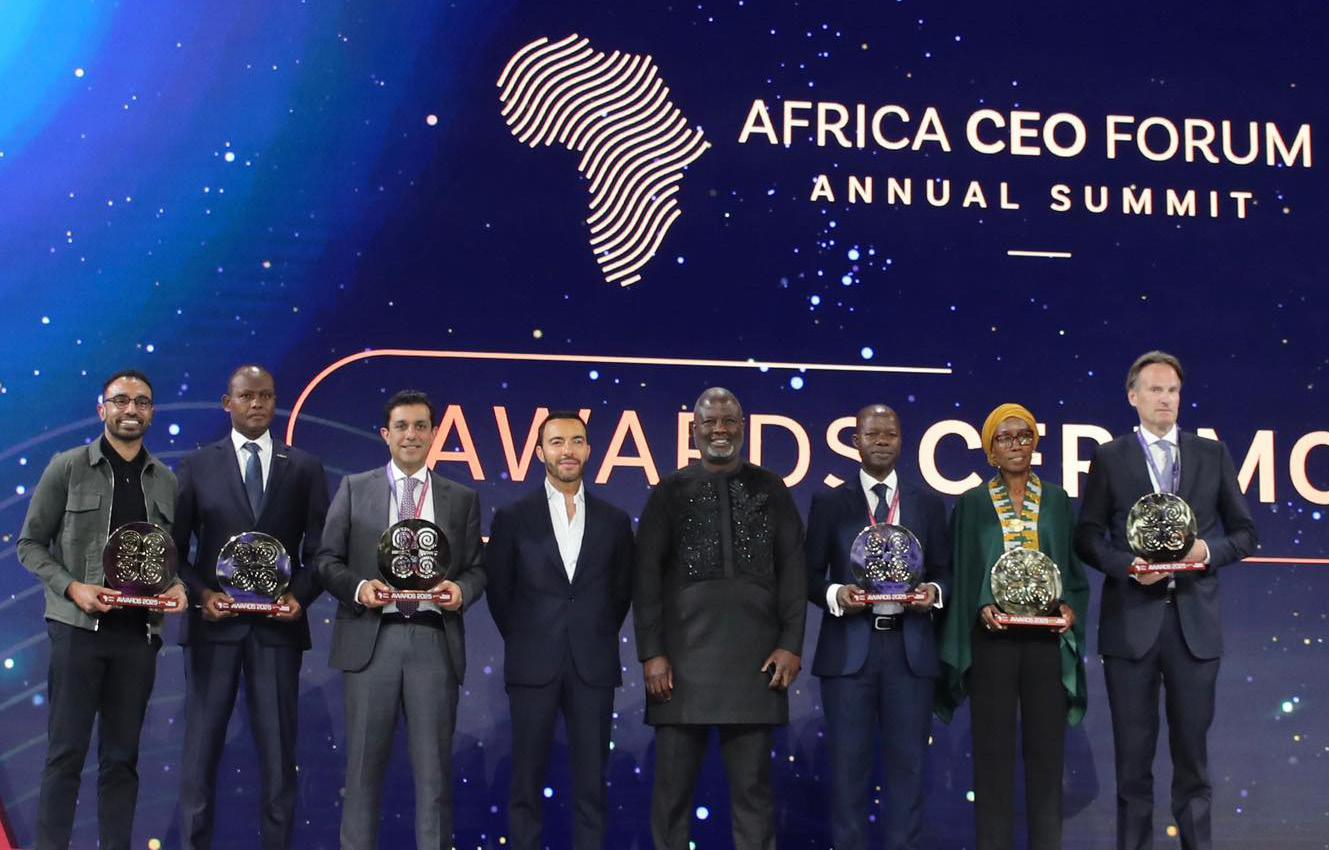
The Africa CEO Forum Harnessing Africa’s superpower - the private sector - to unlock economic potential
The Africa CEO Forum 2025 was held in Abidjan, Côte d’Ivoire from 12 to 13 May. It brought together some 3000 public and private sector decision-makers, including Heads of State, for two days of discussions regarding doing business on the continent, and to highlight the increasingly crucial role of the private sector in the economic and social development of the continent.
Founded by Jeune Afrique Media Group and co-sponsored by the International Finance Corporation (IFC), the Africa CEO Forum is the leading platform for leaders of the largest continental and and multinational companies, investors, Heads of State and Government, Ministers and representatives of financial institutions. Since its launch in 2012, the Africa CEO Forum has evolved from
an annual event to a permanent platform through which African decision-makers can continue to connect with each other, as well as with international investors and institutions operating on the continent. It provides year-round support to Africa’s business leaders through an array of inperson and digital events, reports, and expert insights.
Africa in a transactional world
- A new deal
The theme for this year’s gathering was “Can a New Deal Between State and Private Sector Deliver the Continent a Winning Hand?”
In its introductory video shown at the opening ceremony, the Africa CEO Forum said that in a world in which protectionism is a defining
reality of global trade, where debt has reached new heights and global capital flows have dried up, addressing some of the continent’s key priorities will become ever more challenging. These priorities include agricultural selfsufficiency, financial innovation, digital acceleration, and industrial capacity. “But Africa has a superpower with the agility and the resources to address these priorities - the private sector. To deploy this superpower we need to fundamentally reset relations between the state and private sector. This is why we are calling for a new deal.”
A new deal anchored on three pillars:
• To ensure that governance and accountability are core efforts to encourage bold policy making
• To co-create smart industrial policies which will strengthen African industries and promote her exports
• To ensure that the obstacles to intra-African trade are removed once and for all - accelerating the AfCFTA
A pact to create an enabling investment environment
The Managing Director of the IFC, Makhtar Diop welcomed the delegates during the opening ceremony. He indicated that their presence embodied Africa on the move - an Africa that acts.
“We live in a rapidly changing world - a world shaken by uncertainties. But it is precisely in these moments of turbulence that we must aim higher, think bigger, act faster. It starts with the obvious - transform our natural resources. Our critical minerals, strategic in a digital and decarbonised economy, must become a lever for local value creation. Our second wealthtransform our human capital. Creating decent and sustainable employment opportunities must be the heart of all our policies. To succeed in these two major transformations, a key player exists, which is the private sector.” He went on to say that the private sector is the one that invests, innovates and hires. But for it to fully play its role, it needs a suitable environment - a predictable and attractive business climate, integrated regional value chains, and an effective ongoing publicprivate dialogue. “Asia has proven it, Africa can do it and will do it. To succeed however, we need solid foundations: modern infrastructure, coherent public policies, a stable investment
climate and the ability to mobilise national savings and foreign capital.”
Mr Diop concluded by saying that the theme for this Forum was clear - a new pact between governments and the private sector. A pact that will enable dialogue at the continental level between public and private sectors; that will enable robust value chains which will allow the integration of Africa’s economies; one that will generate much needed value and wealth, driving job creation and improving people’s wellbeing. It’s a pact built on commitment, transparency and a focus on results.
“You can count on us, the World Bank group and our partners to help you in this effort.”
The road to economic, political and commercial integration - the future of the AfCFTA President Cyril Ramaphosa together with his counterparts, H.E. Mohamed Ould Ghazouani of the Islamic Republic of Mauritania, and H.E. Paul Kagame of Rwanda, participated in the Presidential panel discussion that explored better coordinated efforts to spearhead Africa’s development. One of the key discussion points was the issue of accelerating the implementation of the African Continental Free Trade Area (AfCFTA) as a pool of economic power for the continent. H.E. Ramaphosa reiterated the importance of pan-African trade through the AfCFTA, and emphasised that it is a fundamentally transformative mechanism that was adopted by the leaders of the continent.
“They saw wisdom in scaling the fortunes of Africa and moving us beyond just talking about politics and the unity of the continent, and wanting to put in place the real building blocks of what will support that unity and the progress on
our continent. And that was about the economic growth of the continent through engendering trade - and that’s why the AfCFTA was adopted. So it is an engine of growth and through it we’d like the private sector to embrace it, to participate in it because it gives the African continent an opportunity to integrate, and it gives business people the opportunity to see the 1.4-billion people market on our continent and a GDP adding up to $3.4 trillion.”
He said that the AfCFTA would enable the private sector to work with the public sector to embark on meaningful projects such as infrastructure. For trade to have meaning and to happen on the continent, infrastructure projects must be embarked upon; roads must be built; airlines must work properly as must the ports and rail network. “So what I’m saying is we would like the private sector to follow in tandem with the public sector to embrace the AfCFTA and be active participants. What the public sector will do is to derisk a number of these projects - particularly when it comes to infrastructure projects - through the sovereign financial systems in each country.” His Excellency included other benefits such as institutional capacity improvement, bolstering the skills base and opening up trading beyond just the regions but to the whole continent.
“And this is precisely what we are going to be advocating at the G20 Leaders Summit when it comes to things like critical minerals. We want an accord that will enable all of us to manage our critical minerals properly. And we can only do so when the public and the private sector work together. The African Continental Free Trade Area is going to be the pathfinder, the road opener that will enable the movement of goods and of people. And it’s
going to open the floodgates for economic activity on our continent.”
Some voices from the Forum

Eleni Giokos - CNN correspondent and presenter of Connecting Africa on CNN International “Africa is in a transactional world; we are seeing confrontation on all fronts with global powers… trade wars. And you are hearing the world ‘leverage’ quite a lot. Here’s my take: the leverage is in this room; it is on the African continent. It has everything - rare earths platinum, gold, oil, gas, a young demographic that is skillful, resourceful and resilient, creative talent. The spheres of influence are clearly changing; the world order is being rejigged as we speak. And when the dust settles what is the new deal that the continent will sign? It is vital that every person in this room takes action and the governments assist you, the private sector, to create a magical future for the continent.”

Christel Heydemann, CEO, Orange - a French multinational telecommunications corporation
“If you want to attract investment, predictability is probably the key driver. There’s really three things that can help usto continue to unleash the potential of Africa. Number one is developing talents, and we are investing in developing talents in every country where we operate. Because this is for us the key to being able to grow. The second is infrastructure because access to energy and access to digital infrastructure is key for the continent’s development. And the third for us of course is that we want to grow on the continent .We want Africa to be a tech hub because that’s going to help attract other investors.”
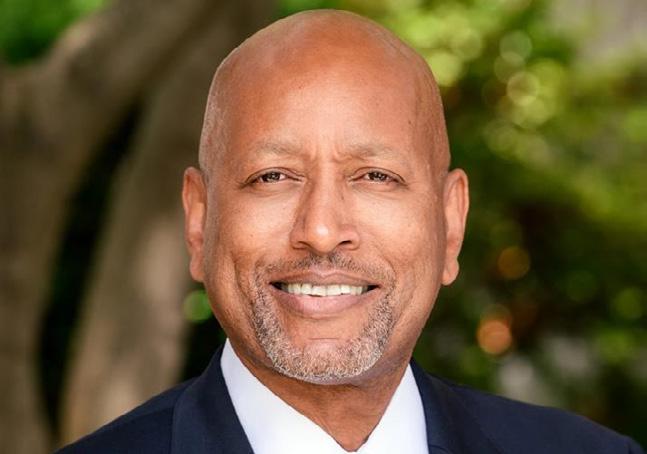
Ethiopis Tafara, Vice President for Africa, IFC
“In the years I’ve been working within the World Bank Group, what I’ve noted is that there’s no shortage of private capital and there’s no shortage of investors interested in investing in countries. Frequently the issue is finding projects that are bankable, where you’ve got the calibration of the allocation of benefits and risks between the private sector and the public sector. I think we need to increasingly start talking to governments about what they want to finance with public money, what they want to finance with private money. Then we can help those projects financed with private money get to bankability by getting this calibration of benefits and risks right. I think because of the shortage of
Official Development Assistance (ODA) we need to focus on placing public money in initiatives and reforms that will enable and mobilise private capital - which is scarce so it needs to be carefully applied to open up the floodgates for more private capital to come in.”
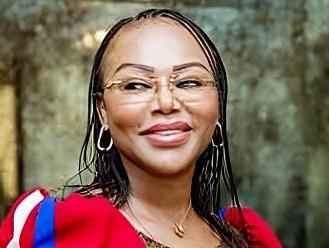
Hon. Nassénéba Touré, Minister of Women, Family and Children, Côte d’Ivoire
“I see an awareness of African responsibility in a world of turmoil. Today, we want to take our destiny into our own hands through industrialisation; through the exploitation of our primary resources; through mining, the wealth of our subsoil, agriculture, food sovereignty. These are subjects that have been addressed here. And I think the signals are green. Because if the leaders conjugate the same verb and go in the same direction, it is obvious that Africa will move forward.”
For more information, and to watch videos of the 2025 event, go to the Africa CEO Forum website at https:// www.theafricaceoforum.com/ forum-2025/en/ or follow them on their social media pagesFacebook, LinkedIn and X

BY RAVI NAIDOO, CEO, YOUTH EMPLOYMENT SERVICES

Investing in youth in the age of AI Economic growth through digital skills
As the Artificial Intelligence (AI) revolution accelerates, empowering South Africa’s youth means preparing them for the challenges and opportunities that this transformation brings.
On this journey, we face a critical juncture. We’ve increased access to higher education and created innovative work experience programmes like the Youth Employment Service (YES), but we’re still grappling with a world of rapid technological change that threatens to leave many people behind.
As the COVID-19 crisis demonstrated, the world will bifurcate between those countries that possess technological capabilities and those that lag behind. Hence vaccine-producing rich countries kept six vaccines per citizen before they released vaccines to Africa (which barely could get six per 100 people). Moreover, technological
capabilities are enabling a “cross-species transmission” in an economic sense – for example, companies once more famous for making cellphones are now producing state-of-the-art SUVs. There is no question that as new technology advances, many old industries will be massively disrupted with concomitant employment implications.
Accordingly, it is imperative that we prepare young people for that technology-driven future. The Harvard Business Review investigated the challenges and opportunities presented by AI’s impact on the labour market. Tools like ChatGPT and imagegenerating AI have significantly impacted automation-prone jobs like writing, software development, and coding. This indicates that workers in automation-prone jobs are more likely to face challenges in this shifting job market compared to manual-intensive jobs. To keep up and remain hireable, they’ll need a diverse
skillset and a comprehensive understanding of AI tools.
It’s clear that basic digital skills are foundational to mastering AI and successfully navigating the workplace of the future. The African Development Bank Group projects that by 2025, at least 263 million young Africans will lack economic opportunities, partly due to a lack of digital skills. According to The African Union’s AI for Sustainable Youth Development in Africa Report, “If harnessed effectively, emerging digital technologies such as Artificial Intelligence could create new jobs and business opportunities in agriculture, health, trade, and education, among other sectors.” Countries across Africa are waking up to these possibilities and starting to invest in AI upskilling to overcome challenges in these sectors and beyond. Our mandate is clear. We must harness the enormous potential of AI by addressing South Africa’s digital divide

and upskilling our youth. This begins with providing essential digital infrastructure at a basic education level and building on these skills in universities and in the workplace to align with global standards.
Although universities are producing highly skilled STEM graduates, the current state of youth unemployment in South Africa shows that formal education is still falling short when it comes to preparing youth for this digital shift. While South Africa has made strides in increasing access to tertiary education—with universities like UJ growing their student population by 50% in just four years—we still face a critical challenge as students struggle to complete their qualifications. A 60% dropout rate in first year is a clear indication that we need to rethink our approach to youth empowerment through education. The reality is that a qualification rapidly loses value
without practical experience. Our survey of 150 employers at YES shows that two years of practical work experience is valued almost equally to a three-year tertiary qualification highlighting the importance of programmes like YES in preparing youth for the demands of the workplace beyond tertiary education. This is not to diminish the importance of formal education—universities play a crucial role in developing critical thinking skills and providing deep contextual understanding. However, the traditional model of “get a degree and you’re set for life” is obsolete, particularly in the age of AI.
Practical work experience that applies theoretical learning in real-world contexts is crucial for bridging the gap between education and the workforce. Organisations have recognised the importance of continuous upskilling through courses and training for employees, particularly when it comes to key digital skills and integrating AI into organisational structures. We’ve already seen this happening with companies like Microsoft, Amazon and other tech giants offering AIaccredited programmes that are more agile and market-relevant than traditional governmentaccredited courses. If businesses followed these examples and gave South Africa’s youth the opportunity to access invaluable skills and work experience, we could build a tech savvy generation, ready to take on the digital revolution. At YES, we’re making this happen by providing young South Africans with practical work experience and access to crucial tech skills that enhance their employability. Our voluntary programme has enabled 1 834 corporates to fund over 170 000 youth in quality first jobs, with an average of 3 000 youth joining monthly. We’re seeing incredible results. Part of
this success is our incorporation of AI training into our modules, which has been proven to grow market-relevant skills and foster innovation.
By partnering with YES, businesses can provide youth with access to essential digital skills development and AI upskilling. If corporate South Africa matched the youth employment commitments of current YES clients, we could create approximately 150 000 youth jobs annually at current GDP growth rates. More broadly, this means building a more resilient economy and a sustainable future for South Africa as our economy becomes more dependent on harnessing AI for growth.
AI holds enormous potential to transform how we work and down barriers to economic development. Harnessing this potential means investing in our youth by providing access to the skills needed to master this emerging technology. Through collaboration between key stakeholders, from government to the private sector, we can help the next generation thrive in the age of AI and put South Africa on the map as a leader in the global digital landscape.
Ravi Naidoo, CEO, Youth Employment Service



BY JESSIE TAYLOR
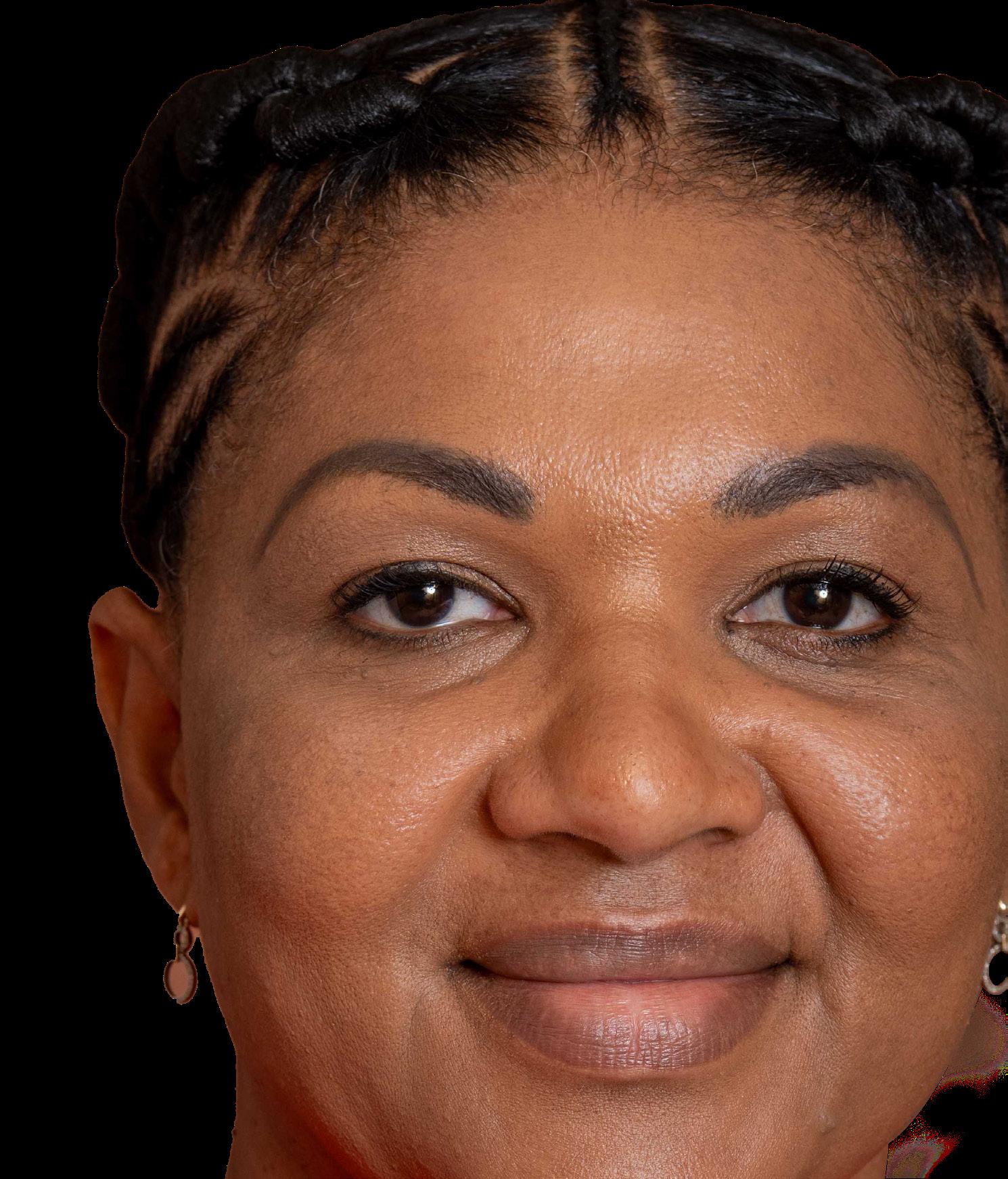
DEPUTY MINISTER OF FORESTRY, FISHERIES AND ENVIRONMENT
HON. BERNICE SWARTS
Hon. Bernice Swarts: Championing Youth Empowerment in South Africa’s Environmental Sector
In South African politics and environmental stewardship, Deputy Minister Bernice Swarts stands out as a formidable advocate for youth empowerment. Since she was appointed Deputy Minister of Forestry, Fisheries and the Environment in July 2024, Honourable Swarts has been instrumental in integrating youth development into the environmental agenda, recognising young people’s pivotal role in shaping a sustainable future.
A commitment to inclusive growth
Ms Swarts’ political journey, rooted in public service and community activism, reflects her unwavering commitment to social justice and economic empowerment. As a Member of the National Assembly representing the African National Congress, she has consistently championed initiatives that address unemployment and inequality, particularly among the youth. Her tenure in the Department of Forestry, Fisheries and the Environment (DFFE) has been marked by a strategic focus on creating opportunities for young South Africans within the environmental sector.
Central to Hon. Swarts’ youth empowerment strategy is the Expanded Public Works Programme (EPWP), a government initiative to
provide work opportunities and skills development. Under her leadership, the DFFE exceeded its 2023/24 EPWP target by creating 80 918 work opportunities, surpassing the initial goal of 42 302. Notably, 58% of these opportunities benefited young people, while 60% were allocated to women and 1% to persons with disabilities. These figures underscore her dedication to fostering an inclusive workforce that reflects South Africa’s diverse demographics.
Ms Swarts emphasised the significance of these achievements during the inaugural budget vote of the 7th administration, stating: “It is encouraging that some of these graduates were absorbed into the municipalities and other host organisations.”
She highlighted the importance of providing graduates with critical experience, aligning with Section 24 of the Constitution, which enshrines the right to an environment that is not harmful to health or well-being.
Recognising the value of partnerships, Honourabble Swarts has championed collaborative efforts between the DFFE and local municipalities through the Municipal Greening and Cleaning Programme. Operating under a partnership model, this initiative has been instrumental in creating the most work opportunities within the EPWP framework. The DFFE provides stipends and primary
project management, while municipalities contribute personal protective equipment, tools of trade, and medical screening. Such collaborations enhance environmental sustainability and equip young people with practical skills and employment.
In addtion, entities like the South African National Parks (SANParks) have actively participated in DFFE-funded EPWP projects. In the previous financial year, SANParks exceeded all targets, employing 5 150 full-time equivalents, 7 098 youth, 6 483 women, and 198 people with disabilities. Over the medium term, SANParks aims to create over 13 860 jobs targeting these groups, primarily from communities neighbouring national parks.
Fostering entrepreneurship and innovation
Beyond employment, Ms Swarts has been a vocal proponent of entrepreneurship among the youth. At the “Step Up 2 a Green Start-Up National Youth Entrepreneurship Awards,” she lauded initiatives encouraging young people to view themselves as job creators rather than job seekers.
Hon. Swarts said: “Our youth, the entrepreneurs of today, are the future leaders and business executives of tomorrow.”
She emphasised the importance of dedication, perseverance, and the ability to stay on course while refining where necessary.
BY JESSIE TAYLOR
Such programmes align with her vision of a dynamic and innovative youth cohort that actively contributes to the green economy. By supporting entrepreneurship, she aims to harness the creativity and energy of young South Africans, driving sustainable development and environmental conservation.
Ms Swarts’ approach to youth empowerment extends to engaging young people in environmental stewardship. During the 2024 Arbor Month launch at Freedom Park, she underscored the importance of involving youth in tree planting and conservation efforts. Such initiatives promote environmental
awareness and instill a sense of responsibility and connection to the natural world among the younger generation.
Also, Honourable Swarts has proactively addressed climate change and gender mainstreaming. At the Climate Change Adaptation and Gender Mainstreaming Workshop, she highlighted the need for inclusive strategies that consider the unique challenges faced by women and youth in the context of environmental issues. By advocating for gender-sensitive approaches, Swarts ensures that

youth empowerment efforts are equitable and comprehensive.
A holistic approach to youth empowerment, intertwining employment, entrepreneurship, and environmental engagement characterises Ms Swarts’ tenure. Her initiatives reflect a deep understanding that sustainable development hinges on the active participation of young people. By creating opportunities, fostering innovation, and promoting environmental stewardship, Honourable Swarts is shaping a future where the youth are not only beneficiaries but also key drivers of South Africa’s environmental and economic resilience.


Discover the latest trends, success stories, and thought leadership in our 23rd edition of Impumelelo Top Empowerment
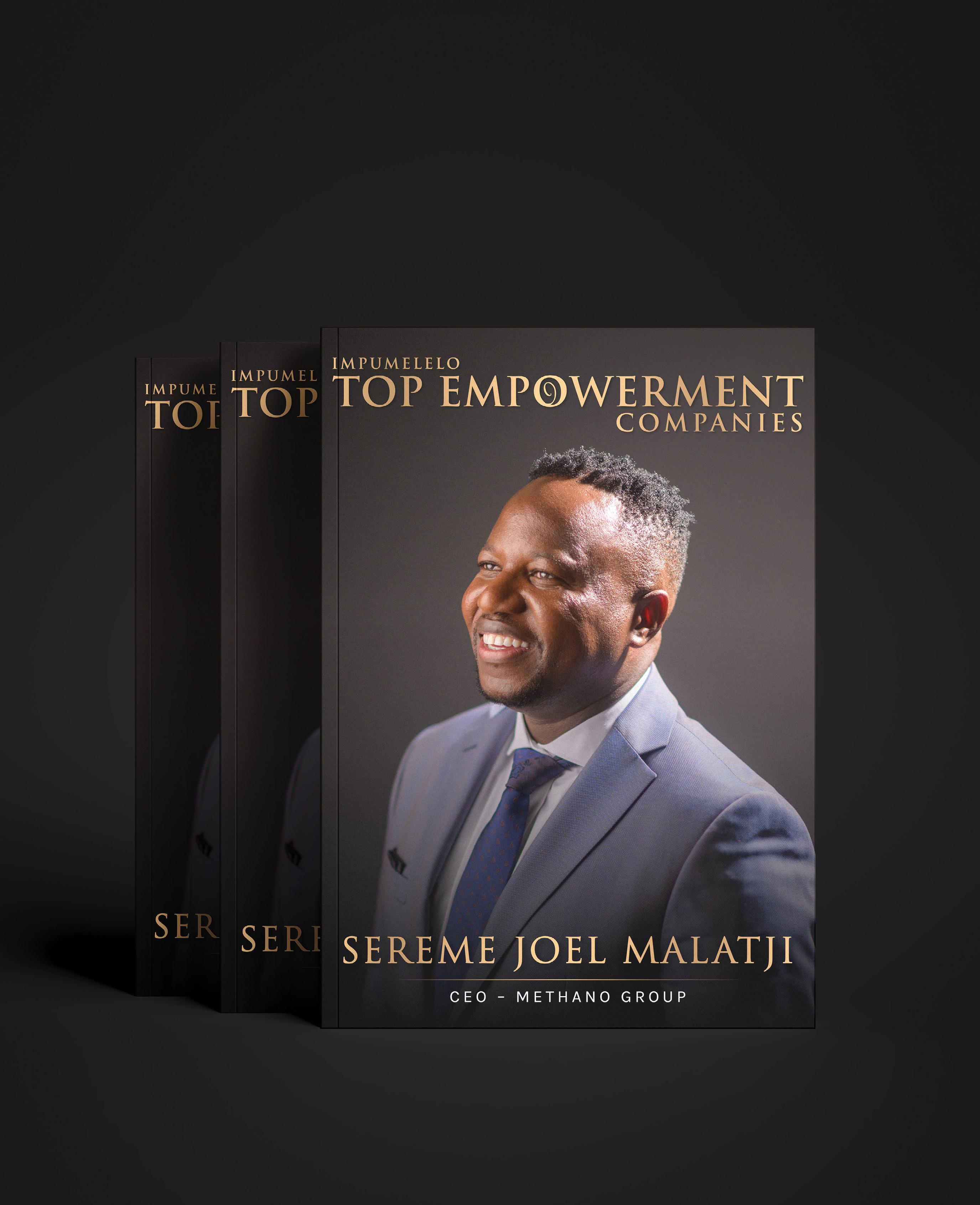

BY JESSIE TAYLOR
Hon. Mmapaseka Steve Letsike: A relentless force for equality and human rights in South Africa
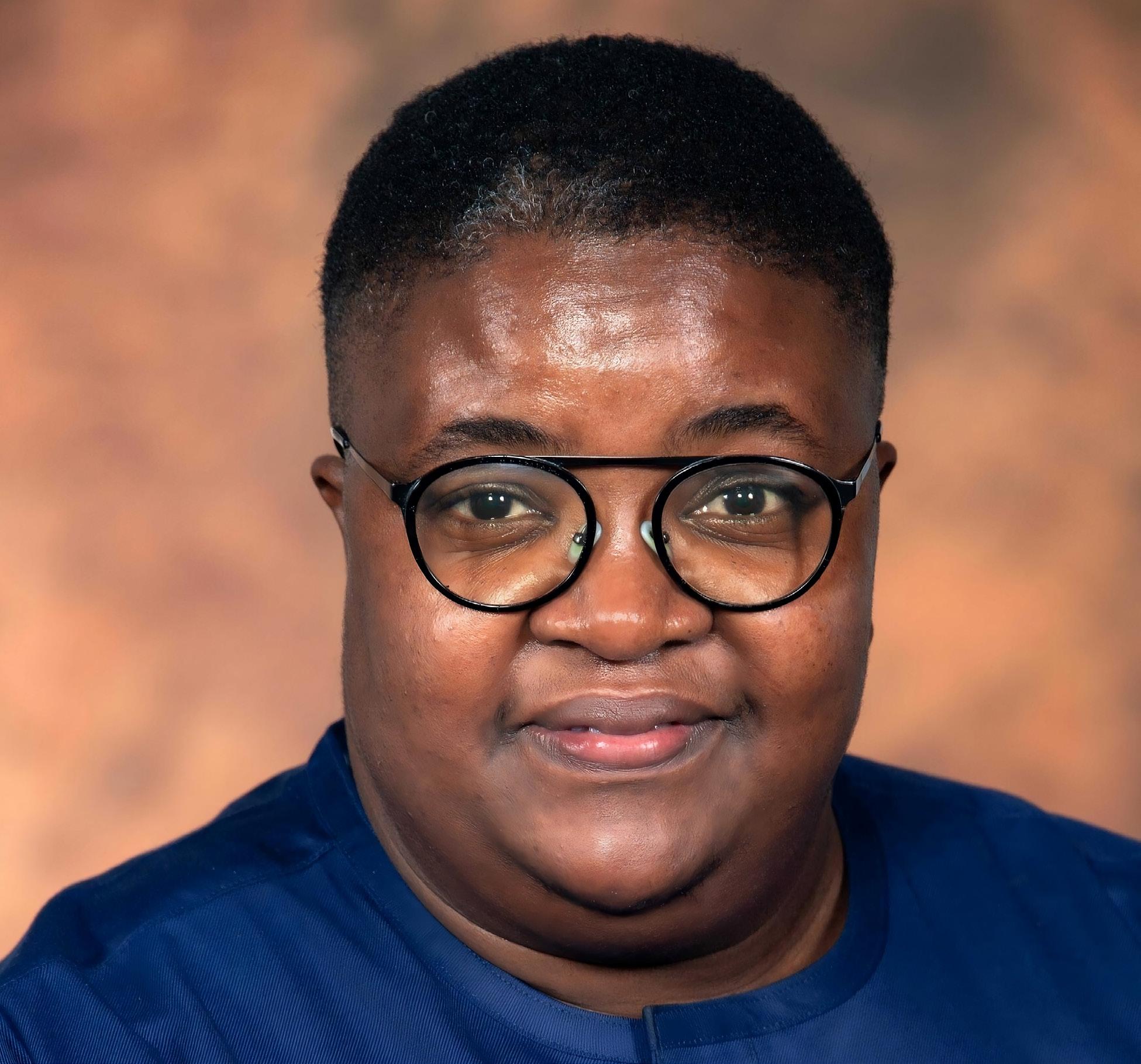
In the fight for equality and social justice in South Africa, Mmapaseka Steve Letsike, Deputy Minister in the Presidency for Women, Youth and Persons with Disabilities, is a name synonymous with courage, conviction, and visionary leadership. As a fierce advocate for LGBTQI+ rights, gender equity, and HIV/AIDS awareness, her impact has resonated from grassroots movements to the national Parliament. Her work continues to challenge systems of exclusion, uplift marginalised voices, and reimagine an Africa where everyone belongs.
A dedication to advocacy
Honourable Letsike’s story begins in Atteridgeville, Gauteng, where her grandparents raised her after losing her parents at a young age. Her lived experience shaped her understanding of injustice and instilled a powerful drive to fight inequality. As a teenager, she was already taking bold steps to break gender normschallenging her school’s restrictive uniform policy and forming its first girls’ football team. That defiance grew into a lifetime of activism.
Understanding that health, dignity, and human rights are inseparable, Hon. Letsike founded Access Chapter 2 (AC2), a civil society organisation named after the Bill of Rights in South Africa’s Constitution. AC2 focuses on protecting and promoting the rights of LGBTQI+ individuals, women, and other marginalised groups through advocacy, education, and community mobilisation.
Under her leadership, AC2 has become a critical voice in the national conversation around equality, particularly in its support for LGBTQI+ persons living in poverty, as well as people with HIV/AIDS navigating hostile environments. Through this platform, Honourable Letsike has helped ensure that South Africa’s progressive Constitution translates into tangible change on the ground.
Her work in the health sector is equally ground breaking. She served as the deputy chairperson of the South African National AIDS Council (SANAC)
“Understanding that health, dignity, and human rights are inseparable, Hon. Letsike founded Access Chapter 2 (AC2), a civil society organisation named after the Bill of Rights in South Africa’s Constitution.”
and chaired its National Civil Society Forum. In these roles, she was instrumental in shaping national responses to HIV/AIDS, particularly as they relate to vulnerable populations.
Her advocacy expanded beyond providing access to medication - she championed the need for psychosocial support, especially for women and LGBTQI+ individuals. She has consistently highlighted the importance of inclusive health services that treat people with dignity, not judgment.
Her contributions were also felt internationally, including through her involvement in PEPFAR’s DREAMS Partnership, aimed at creating an AIDS-free generation for adolescent girls and young women across subSaharan Africa.
Political leadership with purpose
In 2024, Hon. Letsike’s decades of activism culminated in her election to the National Assembly of South Africa under the African National Congress (ANC).
Later that year, she was appointed Deputy Minister in the Presidency for Women, Youth, and Persons with Disabilities, a role allowing her to further her mission from within the government. In this portfolio, she has advocated for urgent action on gender-based violence, economic justice for women, and including people with disabilities in national development agendas.
“We cannot keep talking about equal pay and financial inclusion as a future goal,” she said at a recent Women’s Month event. “The time for action is now. Our freedom cannot be partial.”
One of Honourable Letsike’s most powerful recent public appearances was at the Imagining a Queer
Africa conference in Cape Town in May. This interfaith gathering brought together religious leaders, activists, and community organisers to confront the weaponisation of religion against queer people across the continent.
She challenged African religious leaders to stand on dignity, inclusion, and love - values deeply embedded in African spirituality before the colonial import of punitive laws.
Amid a wave of anti-LGBTQI+ sentiment sweeping parts of the continent, Hon. Letsike has remained unapologetically visible. When a social media campaign attempted to mischaracterise her gender identity and undermine her credibility recently, she responded with characteristic dignity.
“I remain a proud lesbian woman even in times like these,” she stated. “We don’t give up. We continue to stand up for a just society.”
She has been recognised locally and internationally for her leadership and courage and been awarded the Feather Awards’ Simon Nkoli Award, served on UNAIDS’ Strategic and Technical Advisory Committee, and was part of the Global Fund Board for HIV/AIDS, TB, and Malaria. These accolades reflect her activism and her ability to bridge the gap between policy and lived experience.
Hon. Letsike’s work continues to inspire new generations of change makers in South Africa and across the continent. From classrooms to boardrooms, from clinics to parliaments, she is rewriting the narrative of what inclusive leadership looks like in the 21st century.
BY JESSIE TAYLOR
Discovery Green and Sasol launch Ampli Energy
A game-changer for South Africa’s renewable energy landscape
Apioneering renewable energy platform designed to democratise access to green power for South African businesses has been launched.\
Discovery Green and Sasol unveiled platform Ampli Energy, in a joint venture that marks a significant stride towards inclusive energy solutions. The platfrom offering a flexible, month-to-month renewable energy product that eliminates traditional barriers such as high upfront costs and longterm contracts.
A new era in South Africa’s energy sector
Historically, access to renewable energy in South Africa has been limited to large-scale energy users capable of investing in onsite installations or negotiating complex power purchase agreements (PPAs). Small and medium-sized enterprises (SMEs), non-governmental organisations, and mid-sized corporates often lacked the capital and infrastructure to participate in the green energy transition.
Ampli Energy aims to bridge this gap by leveraging the national grid to deliver renewable energy
through a process known as “wheeling.” This approach allows businesses to access green power without the need for additional infrastructure, enabling them to reduce carbon emissions and energy costs simultaneously.
Key features of Ampli Energy
• Flexible, month-to-month membership: Ampli Energy offers a no-fee, no-risk solution with flexible, penaltyfree cancellation. Businesses can subscribe on a monthto-month basis, providing the agility to adapt to changing energy needs without longterm commitments.
• Immediate access to renewable energy: Through wheeling, Ampli Energy delivers renewable energy generated from wind and solar farms directly to businesses via the existing national grid. This model eliminates the need for onsite installations, making green energy accessible to a broader range of enterprises.
• Financial incentives: In a unique offering, Ampli Energy provides monthly cashback to businesses that switch to renewable energy through its
platform. These cashbacks are deposited directly into business bank accounts, enhancing the financial appeal of transitioning to green power.
• Significant renewable energy capacity: At launch, Discovery Green and Sasol committed over 450 MWh per annum of renewable energy generation capacity to Ampli Energy, representing an investment between R1.8 billion and R2.5 billion. This capacity is delivered to businesses in tranches, ensuring a steady and reliable supply of green energy.
Empowering South African
businesses
Sasol’s involvement brings over seven decades of expertise in energy production to the partnership. Notably, the Msenge Emoyeni Wind Farm in Bedford, Eastern Cape, a 69 MW project developed by the ACED-IDEASReatile Consortium, serves as a primary source of renewable energy for Ampli Energy. This wind farm, one of the fastest constructed renewable energy projects in South Africa, began commercial operations in October 2024 and supplies
DISCOVERY GREEN AND SASOL LAUNCH AMPLI ENERGY
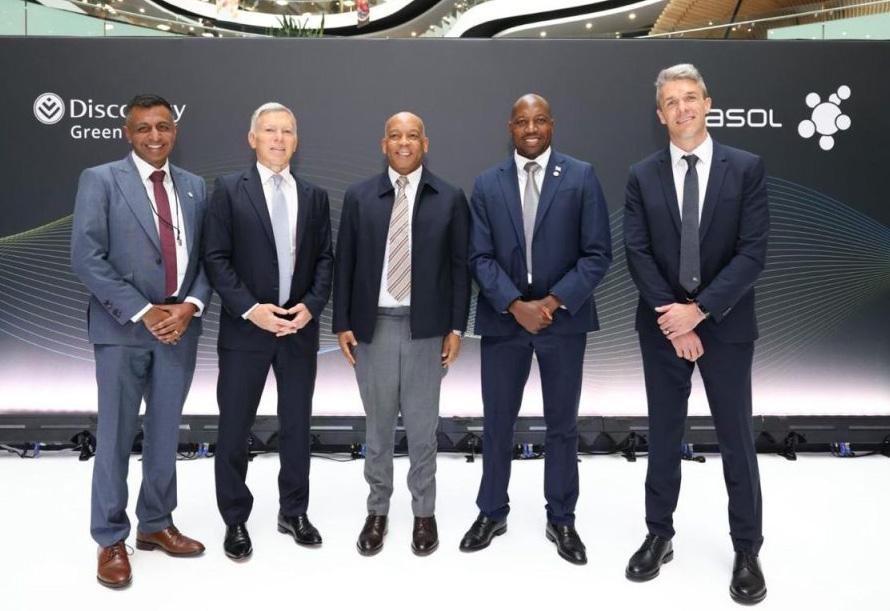
electricity through the national grid to Sasol’s operations in Sasolburg, Free State.
Discovery Green has signed a power purchase agreement with power producer Red Rocket to unlock the second phase of the 150 MW Overberg Wind Farm, located near Swellendam in the Western Cape. This project is expected to deliver over 489 GWh annually to Ampli Energy clients upon its full commercial operation in 2027.
Ampli Energy’s innovative model has already attracted a diverse clientele, including global fastcasual dining chain Nando’s, online florist NetFlorist, automotive company Hatfield Motor Group, luggage and apparel
manufacturer Sealand Gear, and NGOs such as Reach for a Dream and the Nelson Mandela Children’s Hospital.
By providing accessible and affordable renewable energy solutions, Ampli Energy empowers these organisations to reduce their carbon footprints and operational costs, contributing to a more sustainable and resilient economy.
The launch of Ampli Energy signifies a strategic shift in South Africa’s energy sector, with Sasol transitioning from being a major energy consumer to an aggregator and trader of renewable electrons. This move not only accelerates the country’s energy transition but also
creates opportunities for smaller customers to access green energy.
Ampli Energy represents a significant advancement in South Africa’s pursuit of a more inclusive and sustainable energy future. By removing traditional barriers to renewable energy access, this joint venture between Discovery Green and Sasol enables a broader spectrum of businesses to participate in the green economy.
As South Africa continues to navigate its energy challenges, initiatives like Ampli Energy offer a scalable and adaptable model for integrating renewable energy into the national grid, fostering economic growth, and mitigating environmental impact.
Serushan Pillay (Executive Vice President: Business Building, Strategy and Technology at Sasol); Adrian Gore, (Group CEO), Kgosientsho Ramokgopa (Electricity Minister); Simon Baloyi (President and CEO of Sasol); and Andre Nepgen (Head of Discovery Green)
BY SHUMIRAI CHIMOMBE
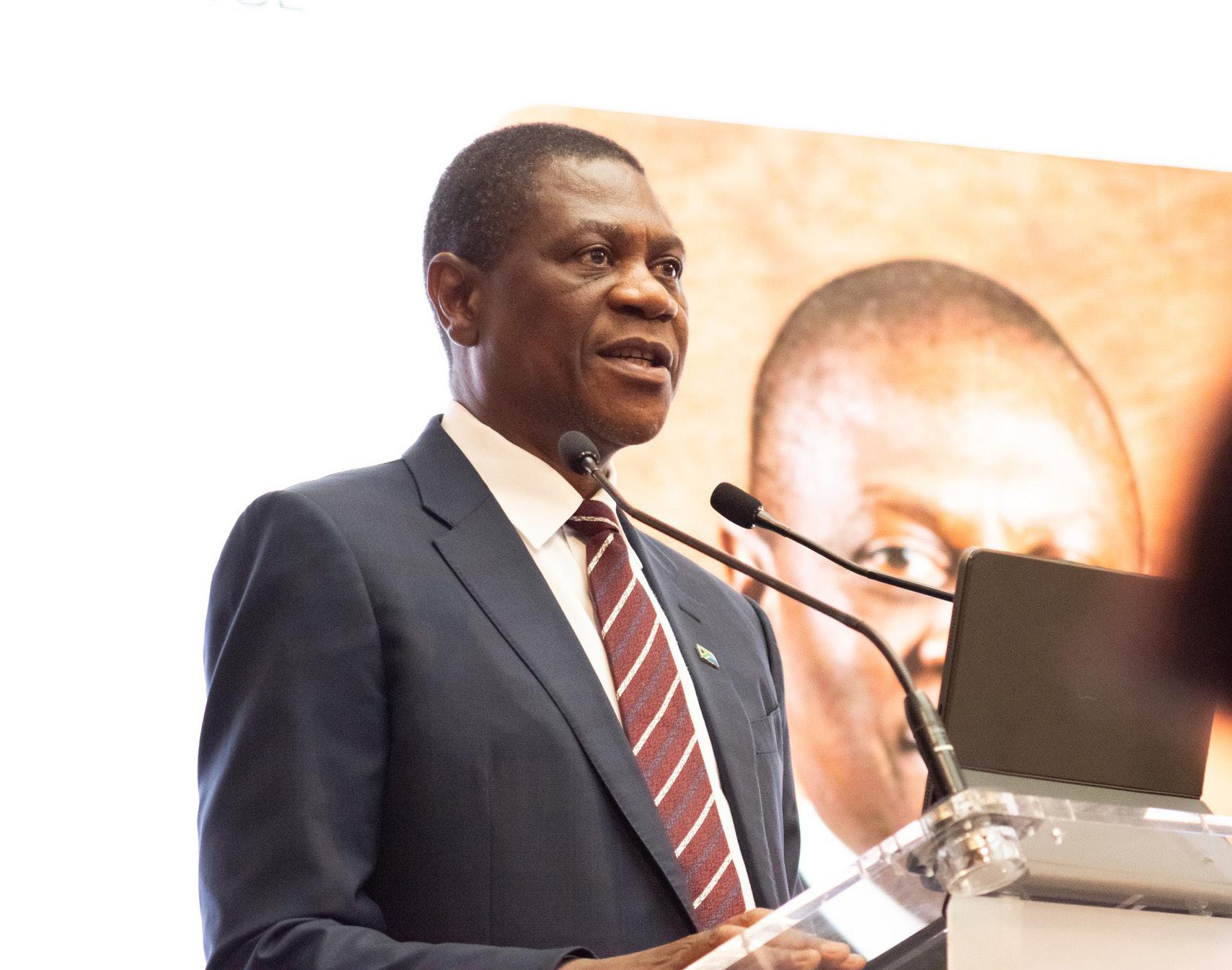

South Africa-France Investment Conference
Bonjour Paris - Reaching out and strengthening bilateral and economic ties
Deputy President Paul Mashatile concluded a successful official working visit to France from 19 to 24 May which was aimed at strengthening the bilateral relations between the two countries. There was a particular focus on expanding existing cooperation projects, mobilising investments, and identifying new areas for collaboration, particularly in trade and investment.
As part of the working visit, the Deputy President led the inaugural high-level South Africa - France Investment Conference and gala dinner held from 21 to 22 May in Paris under the theme ‘Advancing South Africa-France economic relations.” Organised by the South African Embassy in France and Brand South Africa, the conference was supported by key organisations such as the IDC, RMB, Total Energies, the French South African Chamber of Commerce and Industry (FSACCI), the French Foreign Trade Advisors – South Africa section, MEDEF International, the Economic Department of the French Embassy in South Africa, Lesotho
South Africa’s Deputy President Paul Mashatile speaking at the South Africa-France Investment Conference
and Malawi, and Business France. The event, which was attended by over 300 delegates from public and private sectors, brought together French and South African companies to explore potential investment and partnership opportunities across key sectors such as energy and water, transport and logistics, financial services, trade and industry, agriculture and Agro-processing, mining, manufacturing, and ICT.
In his keynote address the Deputy President said that South Africa believes that cooperation and global integration are crucial for economic, social, and political progress, and that enhancing integration and collaborating with countries like France will lead to inclusive economic growth.
“We are determined to continue enhancing this relationship. This is because our partnership in trade and investment has already created jobs and boosted economic growth. It has been a cornerstone of our economic development, and today, we have the opportunity to explore new avenues for collaboration, investment, and growth.”
Highlighting trade and investment opportunities
Deputy President Mashatile indicated that as the world pivots to greener forms of energy, South Africa is undertaking one of the most ambitious energy transitions on the continent. The Just Energy Transition Partnership is creating opportunities for strategic investments in renewable energy infrastructure, green hydrogen, battery energy storage, and skills development.
Another important area for collaboration is on critical transition minerals, including rare earth elements, lithium, vanadium, and cobalt which South Africa has in abundance. The country is looking to international partners including France to bring advanced technologies, innovation, and sustainable practices to enable the ethical extraction and beneficiation of these minerals.
Equally, promising is the hemp and cannabis economy. The Deputy President said that South Africa is developing a regulatory framework that encourages investment, research, and commercialisation in this sector which has the potential to spur industrial innovation, revitalise rural economies, and create thousands of jobs. This opens up opportunities for French expertise in agritech and pharmaceuticals to play a significant role in this sector.
During the conference, the South African delegation presented an investment project book worth US$40 billion in the agro, rail, energy, mining, chemicals, pharmaceuticals, and automotive industries, to kickstart discussions with the different businesses on identifying trade and investment opportunities.
“In conclusion, South Africa, strategically placed at the tip of the African continent, is an important investment site, both for the market prospects inside its boundaries and as a gateway to the rest of the continent, which has a population of around one billion people.
We wish to collaborate with France by investing in infrastructure like ports, power, and manufacturing to promote local value-added and trade through the African Continental Free Trade Area.”
Celebrating French/South Africa business connections
The CEO of Africa Global Logistics, Phillipe Labonne, who is also the Chairperson of the Africa committee of MEDEF International, the largest French business federation, said in his welcome speech that France and South Africa share a longstanding relationship. This relationship is based on mutual respect, cooperation and shared ambitions in all fields of economy such as industry, energy, transport, water and sanitation, and sustainable development among others.
“As a testimony of this, more than 480 French companies and their local branches are in South Africa. They represent more than 65,000 direct employment and they gather more than €3-billion foreign direct investment. As you can see from the large attendance today, we are ready for many more partnerships with your country and with the South African companies. MEDEF is the largest French business confederation representing over 80% of French companies of all sizes, operating across all sectors and employing more than 10 million employees. At MEDEF International we believe in cooperation, in joint ventures and in private-public partnerships that create value economically, socially and environmentally for our countries.”
BY SHUMIRAI CHIMOMBE
He also noted the priority sectors in which French businesses could play a significant role such as infrastructure where French companies are among global leaders in terms of investment capacities, as well as expertise and technology. He also highlighted energy, transport and logistics, water and sanitation among others.
“We will also discuss how we can further collaborate in supporting the strengthening and growing of the local value chain in the industrial sector in which French companies are investing, from automotive to railroad to pharmaceutical, agro-processing
and tourism. We believe that for further partnerships the financial sector will be key providing capital to concretise all our project training and human capital. French companies are committed to investing into training and will fully keep playing their role in providing high skills and sustainable jobs to South Africa.”
Labonne also made reference to the recent merger between the French television channel Canal+ and Multichoice as an example of a successful French investment into the entertainment sector, which he said was a very strategic industry.
“We believe South Africa and France have a great deal to play together. The solid relationship between our two countries presents itself as an anchor point and a strong signal testifying to the will to diversify partnerships.”
Committing to doubling trade by 2027
Brand South Africa announced in a statement that the South AfricaFrance conference resulted in the two countries pledging to double bilateral trade over the next two years.
“The commitment to double trade by 2027 marks a significant

Dignitaries at the Investment Conference
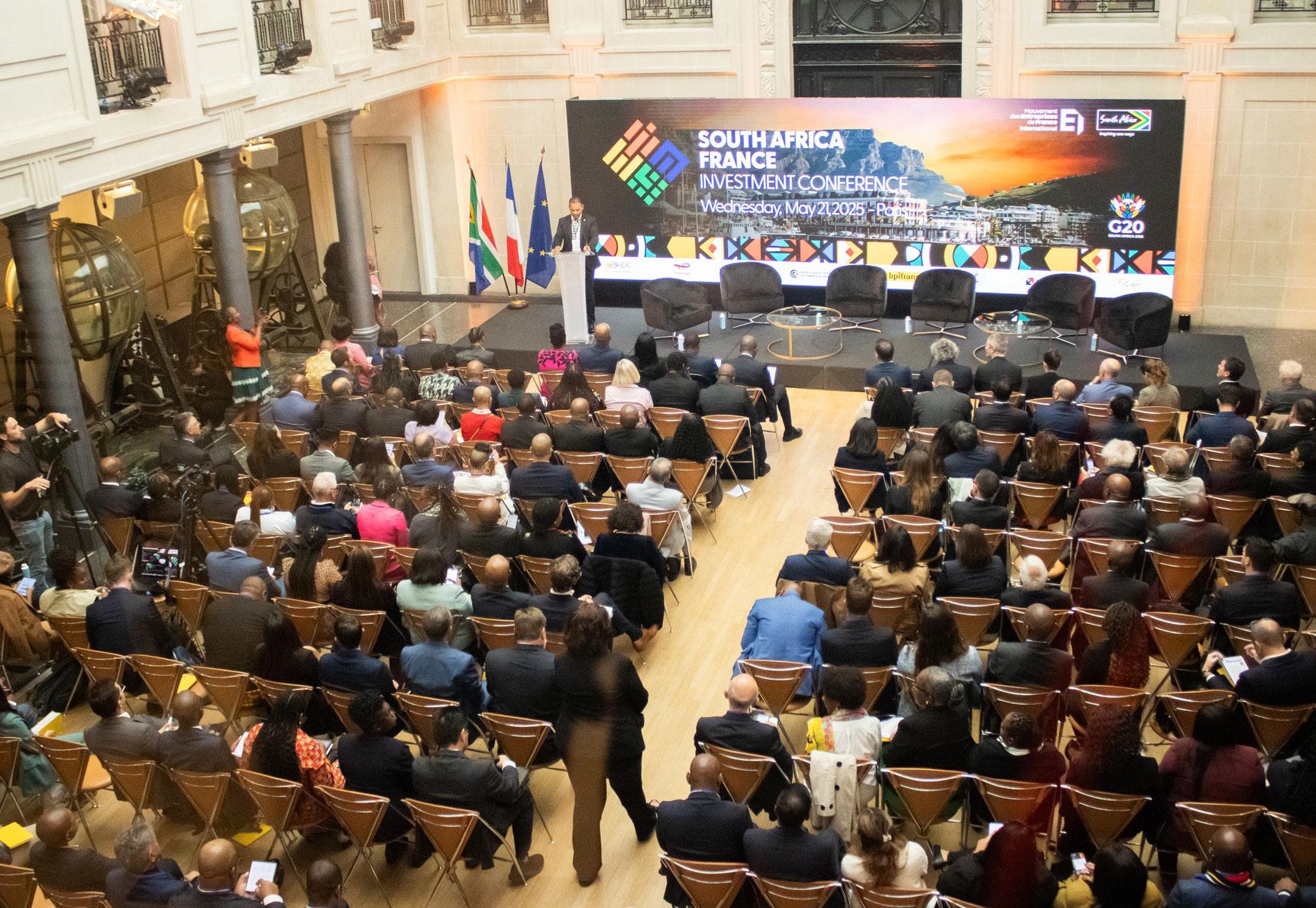
milestone in the bilateral economic relationship and sets the tone for continued collaboration. In addition, the countries highlighted the need for both countries to develop plans of action for the effective implementation of existing bilateral agreements.”
Brand South Africa is the official marketing agency of the country with a mandate to build its brand reputation and improve its global competitiveness.
“By leveraging France’s technological strengths alongside South Africa’s market potential and role in the African continent, French enterprises are uniquely positioned to forge sustainable
partnerships that fuel innovation and long-term growth”, said Brand South Africa CEO Neville Matjie.
From the official social media accounts of the French network in South Africa, Lesotho and Malawi
Paris hosted a high-level France-South Africa Investment Conference aimed at strengthening the partnership between our two nations. Why does this matter?
• French investment in SA is already over R61 billion (€3+ billion) – and growing!
• More Public-Private Partnerships (PPPs) are needed to boost jobs and inclusive growth
• We must join efforts to tackle
unemployment, inequality, climate change, and digital skills.
Strengthening ties at the top
Deputy President Paul Mashatile met with French President Emmanuel Macron and Prime Minister François Bayrou to discuss trade, investments, energy transition, and more.
Over 70,000 jobs in SA are supported by French companies, with a strong focus on skills development and training.
France and French companies are committed to supporting inclusive growth in South Africa and deepening the bilateral partnership! - France in South Africa, Lesotho and Malawi
BY SHUMIRAI CHIMOMBE
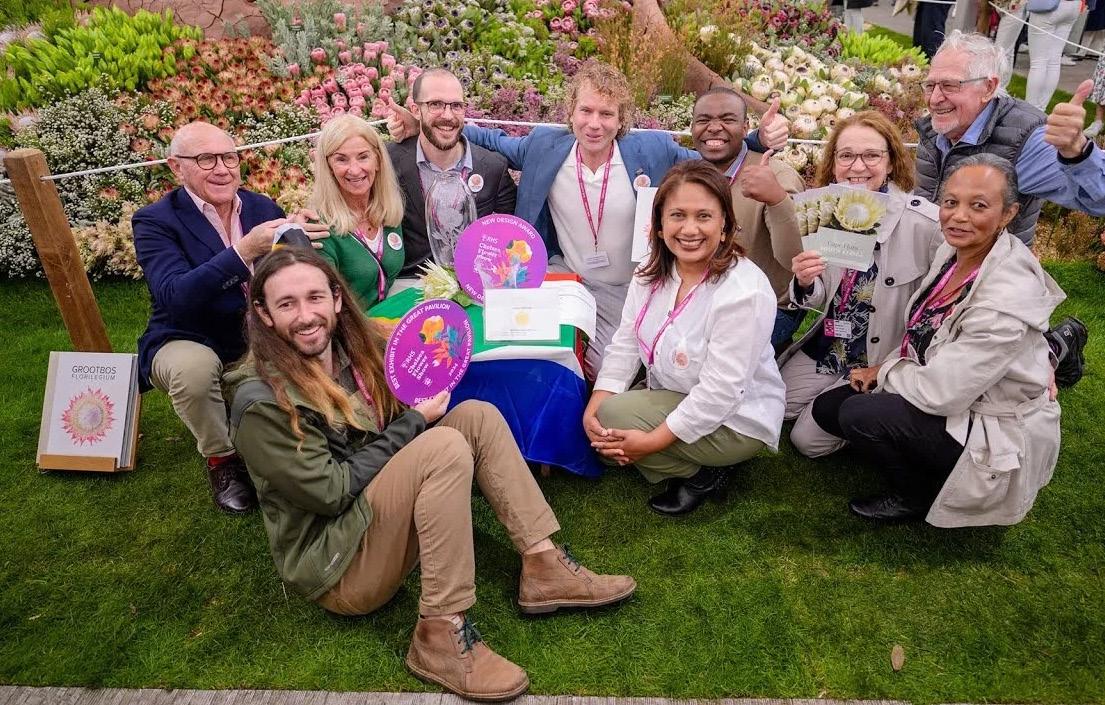
The Chelsea Flower Show From soil to stand - celebrating South Africa as “the flower basket of Africa”
“It’s gold again for South Africa here at the Chelsea Flower Show. We are very relieved and very excited about the gold putting South Africa right at the top of the world stage” - Leon Kluge
Following their success at the 2024 Royal Horticultural Society (RHS) Chelsea Flower Show in the UK, where South Africa took home the gold medal, the team once again returned to the show which took place from 20 to 24 May. Led by the international
landscape designer, botanist, presenter and writer Leon Kluge and artist Tristan Woudberg, the team of volunteers took on one of the most ambitious tasks to date, creating a magnificent display named the Cape Flora Kingdom of South Africa. The display showcased one of the most biodiverse regions in the world, presenting many species of Proteas and fynbos, and winning a gold medal again with perfect scores from the RHS judges. The team was also awarded
‘Best Exhibit in the Pavilion’ and the ‘Best New Design’ award. The exhibit was made possible with vital support and sponsorship from Grootbos Private Nature Reserve and other private sector partners.
According to the RHS, the Chelsea Flower Show has been held for more than a century in the grounds of the Royal Hospital and is the “pinnacle of garden design”. It has been running every year since 1913, apart from gaps
THE CHELSEA FLOWER SHOW
The amazing team that built the award winning masterpiece at the Chelsea Flower Show

during the two World Wars and 2020. It is an event which draws a truly global crowd, with specialist nurseries revealing new plants for the first time. The best designers from Japan to New York show off their astonishing creations while fashion brands and manufacturers launch their latest lines at the trade stands.
The journey from soil to stand
“The process started about a year ago when we submitted the design,” explained Leon in a video. “The inspiration came from our beautiful mountains, our wonderful rivers and of course, our flora. But when it comes to intricate design, the cliffs and the beaches and the Storms River Mouth in the Western Cape were the inspiration for that element. Although creating this display at the show in London took about 10 days to build, the journey began in South Africa.”
Speaking as he wandered around Morgenster Protea Farm in Stellenbosch, Leon explained that the Western Cape is the home of fynbos. And one of the most famous plants that is grown for export all around the world is the Protea. “And on this farm is the King Grande Protea, and this is where the story also starts on our journey to go to the Chelsea Flower Show.
“We select the best flowers, some unique flowers, and there’s a lot of care taken into that process
of getting the flowers to London in the most perfect condition. We visit lots of Protea farms, fynbos farms to find some interesting plants, interesting specimens of plants and flowers that people have not seen yet and this (the King Grande) is one of them.”
All the flowers that are taken to the Chelsea Show are farmed. Because the severe weather that the Cape is famous for can damage a lot of the flowers just before export. They are given some extra care and protection such as wrapping a little cushion over the Protea’s head. Then when the flower just starts to break open, that’s the time to harvest. When the time comes then early in the morning the little cushion is taken off, the plant is harvested, taken to the shed, and so the process of travelling to the UK starts.
Judy-Ann Van Zyl of Morgenster Protea Farm said that the process of growing the Protea is very long. The flowers are propagated from cuttings which are then placed in a growth medium for about two months for them to root. The cuttings are planted when the soil temperature reaches about 13°C. Growing the flowers and taking care of them is a very manual process especially when it comes to pruning. The first harvest happens in three or four years. “These export Proteas are planted in orchards - they’re nurtured and tended. “The amazing thing about the Chelsea Flower Show,
from my point of view, is to see it all come together as the whole South African Protea and fynbos”, she added. “It’s goosebumps stuff for us to know that you are a small part of a much bigger picture, a big family. And also as South Africans we love a good story, and when we see our flowers overseas and we see how beautiful they are and how successful they are - we’re proud.”
Once he had arrived in London and was preparing to build the display with the team of volunteers who had arrived with him from South Africa, Leon added that the most exciting part is when the flowers arrive and are all delivered. “After months and months of organising, going to the farms, going to look at the buds, hoping and praying that there’s no rain while we’re harvesting; everything at customs is fine, flights are not cancelled - so many things go through your mind.”
He said that when the truck finally arrives there is only one more thing to do - opening the boxes and seeing that they are in good condition.
“It’s like Christmas. This is the most Proteas you see at one point for one installation anywhere in the world. So the long journey from South Africa for all of these cut flowers has finally come to an end, and we can now unbox all our treasures that all the farmers in South Africa so carefully
assembled for us. Putting the installation together at the show is a very important time for us - to get our crayons for our painting that we are now starting to build.”
A gold-medal award winning installation
Grootbos Private Nature Reserve reported that the display included large clay sculptures which formed the backdrop for a spectacular display of fynbos cut flowers. Grootbos Florilegium artist Chris Lochner and Bulelani Bashe from their Green Futures nursery team were also there to assist.
The Indian and Atlantic oceans inspired this year’s stunning display. Converging at the southern tip of Africa, they give rise to a unique ecosystem where plant and animal life thrive. The dramatic canyon, waterfalls and cliffs that flowed throughout the display were representations of the country’s iconic terrain which is home to a plethora of indigenous South African flowers.
According to Grootbos, an unprecedented 25 000 stems were used in the display with a special effort being made to include rarely seen hybrids such as the fan favourite Protea “Snow Leopard”. It also featured seldom seen species such as the pendulous Protea sulphurea

and the delicate blushing brides, Serruria florida.
Using natural clay to form the sculpture, artist Tristan explained, “Large panels weave through the display creating an earthy backdrop for our vibrant flora to take centre stage. The sculptures take on the role of mountain ranges, dividing and isolating the different biomes of the Cape, which have given rise to our unique flora over time. The natural cracking effect provided by the clay is a reminder of the contrasting wet and dry seasons of the fynbos biome as well as the fragility of these ecosystems.”
Leon commented that if you have ever hiked in the Western Cape, one of the most obvious highlights to see is the water which has an
amber “almost Coca-Cola colour” to it. This is because of all the tannins leaking over the years into the water from the fynbos. So they recreated that exact color in the water element in the garden using Rooibos teabags that had the same effect as the tannins.
“A very exciting addition to this garden this year is my edging which is inspired by the traditional basket weaving of South Africa. It really encases all the flowers like they are almost bulging out of this basket - because South Africa is after all the flower basket of Africa,” said Leon.
“The South African floral display at the Chelsea Flower Show 2025 is a testament to all the hard work from the cut flower farmers, the pickers, the transport companies,
THE CHELSEA FLOWER SHOW
BY SHUMIRAI CHIMOMBE

to finally, after a whole year of planning, bringing all of those elements together in one place for the world of horticulture and flower arranging and landscaping to come and enjoy. And trigger them to come and look at the fantastic flora that we have back home and see it for real in our mountain scapes.”
Bulelani Bashe from the Grootbos Foundation, who was part of the team at the show commented: “This it’s something that I never thought would happen to me. And the team that I’ve been working with makes me realise how important it is to be part of the horticulture industry. To showcase these Proteas to the world, and showing people what
the biodiversity of South Africa looks like, especially the flora industry.”
Tristan Woudberg said: “I’m proud that I never thought I’d be involved with a project like this. I’m so passionate about South African flowers and I treat them with great care. Here at the Chelsea Flower Show we need to present them at their best, and when they arrive in this type of quality they really speak for themselves. We are merely custodians of these beautiful species and hybrids from the cut flower industry. It’s just such an honour to work with these precious plants. Once you’ve seen these plants in a their natural habitat in South Africa it’s really easy to replicate this in this
type of setting so the viewer can really appreciate the flowers here at Chelsea Flower Show”
Chris Lochner from the Grootbos Foundation: “This is quite a surreal experience. We spent a year planning. It’s been so much hard work and it’s been a really intense week. Everything just pays off being here and seeing the gold. Being here with this incredible team surrounded by these beautiful flowers, and seeing the response from everybody visiting the stand. I’ve always felt that plants speak to me. A lot of people don’t really notice and see them, and I always feel that plants need to get a voice. And what better way to give plants a voice than to bring them here to Chelsea on the world stage where they can be appreciated by millions.”
Source: Grootbos Private Nature Reserve | Royal Horticultural Society (RHS) | Good Things Guy | Leon Kluge: YouTube video titled Cape Floral Kingdom South Africa | RHS Chelsea Flower Show 2025
BY SHUMIRAI CHIMOMBE


G20 update Spotlight on advancing young people during Youth Month
Deputy Minister of International Relations and Cooperation, Mr Alvin Botes delivered the keynote remarks at the G20 Youth Symposium at Stable Theatre in Durban.
With June being Youth Month, and 16 June being Youth Day, there has been a focus on addressing young people’s issues for the G20.
On 9 June Deputy Minister of International Relations and Cooperation, Mr Alvin Botes delivered the keynote remarks at the G20 Youth Symposium at Stable Theatre in Durban. The event was attended by youth leaders and delegates under the theme: “Advancing Youth Inclusion in the G20 Presidency Agenda”. He highlighted that 4.8 million South Africans aged 15 - 34 are unemployed; 58% of them have never had a single day of paid work, and the youth unemployment rate climbed to 46.1% in the first quarter of this year. Against this backdrop, he indicated that the objectives, outcomes and outputs for the G20 must be unapologetically youth-centred.
“In the Employment Working Group of the Sherpa Track we are negotiating a compact on youth employment and skills, building on the Antalya Goals but adding targets for digital-economy apprenticeships, recognition of micro-credentials and mutual portability of qualifications across G20 members. If endorsed by leaders, the compact will hopefully translate into an estimated 10 million paid internship placements over five years, with a genderparity clause and an annual public score-card so you can hold the G20 accountable.
In the Finance Track, we are advancing an “Innovation & Inclusion Facility” financed through blended public-private instruments
to support start-ups led by women and young people in frontier technologies and green manufacturing. Its first-phase endowment of $3-billion will be disbursed via challenge funds that prioritise township and rural enterprises, with a target of 150 000 sustainable jobs by 2027.
In the Agriculture Working Group and the Environment and Climate Sustainability Working Group, we are championing a Just Agri-Transition Facility that links smallholder farmers including youth to climate-smart finance and regional value chains.
Finally, our AI priority will hopefully deliver a “Pan-G20 Youth Digital Corps,” a volunteerto-employment pipeline that pairs South African coders with continental and global partners to solve public-sector data challenges.”
Speaking to the media after the event, Mr Botes said that his key take-away from this event was about how young people in South Africa should use the momentous occasion of Youth Month to ensure that they express their aspirations and ambitions to become part of the G20 Presidential Declaration in November. “We have taken the young people in confidence on very pertinent areas for their contribution in terms of the G20, in particular using the Y20 as a catalyst for these issues.”
YOUTH (Y20) is a platform that enables dialogue between young people from G20 member countries. As future leaders of their nations and the world, they have the opportunity to reflect
on the priority agenda of youth; to influence debates; and to contribute to the preparation of public policies.
G20 South Africa underscores that youth participation in the international decision-making process is more than a necessity: it is an imperative. Their perspectives and innovations are fundamental to addressing issues that are relevant to the world— ranging from climate change and sustainability to social justice and economic inclusion. The Y20, in this sense, is a vital channel for integrating these voices into the global dialogue, ensuring that policies and strategies developed within the G20 are not only comprehensive, but also progressive and resilient.
Young people set to converge in Parliament for a special sitting Parliament announced that it was convening a landmark P20 Youth Parliament sitting on Friday, 13 June in the Good Hope Chamber in Cape Town. This high-level session, held just three days before Youth Day, was aimed at bringing together young Members of Parliament, provincial legislators, youth advocates, and ministers to shape a national youth development agenda. This agenda will directly inform South Africa’s priorities at the 2025 G20 and P20 Summit. With youth unemployment at alarmingly high levels, the sitting will focus on youth economic participation and sustainable employment opportunities. It will provide a platform for young leaders to propose policy solutions and secure concrete commitments from the government.
BY SHUMIRAI CHIMOMBE
events calendar for June
Third Digital Economy Working Group Meeting
Second Anti-Corruption Working Group Meeting
Third International Financial Architecture Working Group Meeting
Fourth Health Working Group Meeting
U20 Tshwane Sherpa Summit
Third Task Force 3 Meeting: Artificial Intelligence, Data Governance and Innovation for Sustainable Development
Third Sustainable Finance Working Group Meeting
Y20 Pre-Summit
Third Task Force 1 Meeting: Inclusive Economic Growth, Industrialisation, Employment, and Reduce Inequality
T20 South Africa 2025 Mid-Term Conference
G20 Empower Alliance Inception Meeting
Third Framework Working Group Meeting
SAI20 Summit
Third Sherpa Meeting
Stay informed about environmental, social, & governance trends, strategies & best practices. Feature in our publication to join us in shaping a better tomorrow.






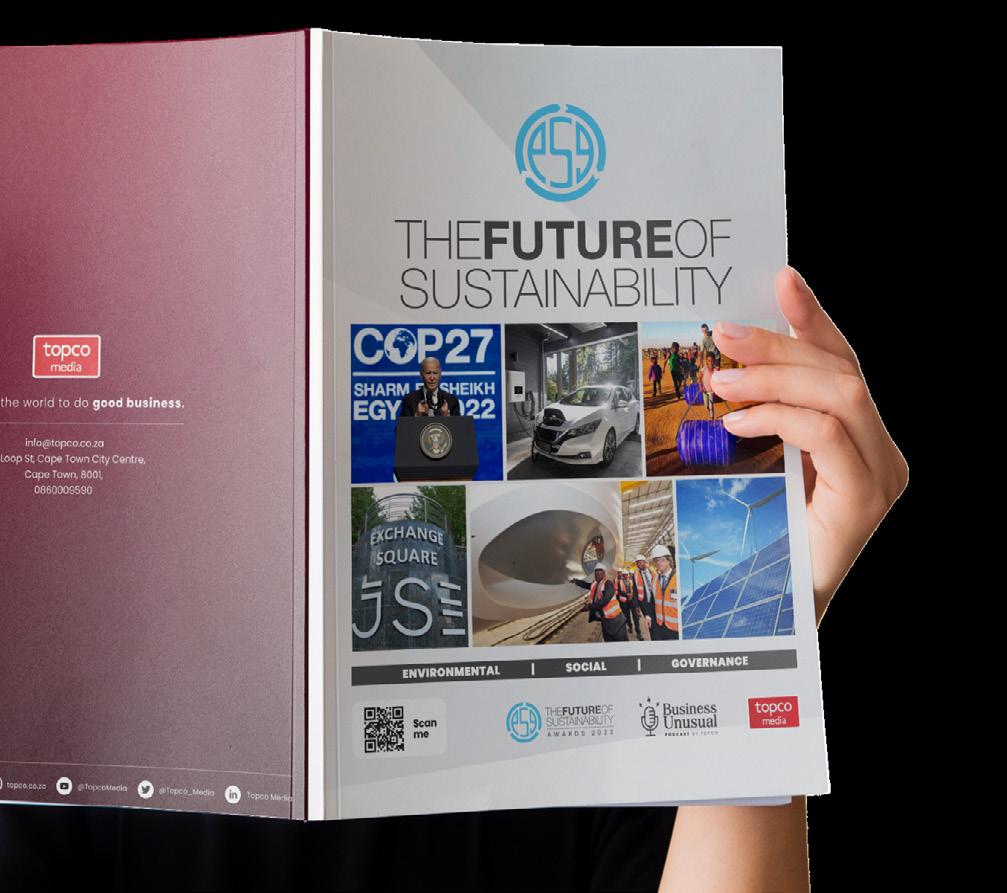
BY JESSIE TAYLOR

Safeguarding the nation strengthening fraud prevention in South Africa’s public sector
As South Africa’s economy continues to digitise, fraud has emerged as one of the most pressing threats to public and private institutions. With scams growing more sophisticated and financially damaging, fraud prevention is no longer just a concern for banks and businesses - it is a strategic imperative for government and public sector leaders.
In 2024 alone, the Southern African Fraud Prevention Service (SAFPS) reported that its efforts helped prevent financial losses exceeding R5-billion for member organisations. This figure underscores the threat’s scale and the critical role fraud prevention services play in protecting national economic integrity.
The evolving fraud landscape
According to the SAFPS Annual Report 2024, identity fraud remains the most prevalent method criminals use, accounting for over 50% of reported fraud cases. What is more concerning is the growing complexity of scams, which increasingly exploit digital platforms, personal data breaches, and cyber vulnerabilities to target individuals and organisations.
South Africa’s fraud ecosystem has become a lucrative arena for cybercriminals due to low digital literacy, poor security controls in some sectors, and increasing economic desperation. Common scams range from phishing
emails and false job offers to fraudulent loans and synthetic identity creation.
The public sector is especially vulnerable. From social grants and pension disbursements to procurement and infrastructure budgets, government departments handle vast sums of money and personal data. A single fraud incident can drain millions from public coffers, erode public trust, and disrupt vital service delivery.
Notable breaches in recent years - including the compromise of the Companies and Intellectual Property Commission and attempted scams targeting the

Government Employees Pension Fund - have highlighted the need for more resilient fraud management strategies within state institutions.
Founded in 2001, the SAFPS is a not-for-profit body that assists organisations in identifying and combating fraud. While traditionally focused on financial institutions, the organisation’s services and insights are increasingly being adopted across other sectors, including public service.
Their Protective Registration feature is among the most effective tools for identity
fraud protection. Individuals who suspect their ID has been compromised can register their profile with SAFPS, alerting member organisations (such as banks and credit providers) to take extra precautions when processing applications involving that ID.
Another vital initiative is the Yima platform, launched as a centralised public resource offering tools for scam prevention, reporting, and education. Yima allows users to verify business listings, check banking details before transacting, and access educational materials on scam awareness. This holistic approach empowers citizens to proactively protect themselves — a crucial element in nationwide fraud prevention.
Technology: A doubleedged sword
The rapid digital transformation in South Africa has expanded access to services but also opened new doors for cyber fraud. Fraudsters now deploy machine learning algorithms to mimic legitimate customer behaviour or create synthetic identities using bits of real and fake data.
The same technologies, however, can also be used to counteract fraud. Institutions are increasingly adopting artificial intelligence (AI) and data analytics to detect anomalies, flag suspicious activity, and predict fraudulent behaviour before it causes financial harm.
The public sector can leverage these same capabilities. Fraud detection algorithms that scan procurement databases, grant disbursement systems, or employee payrolls can help identify irregularities early. For example, unusual vendor payments, duplicate beneficiaries, or ID numbers flagged on fraud watchlists can be automatically raised for investigation.
A significant barrier to fraud prevention is the lack of awareness among employees and the general public. Many scams continue to succeed not because of technological prowess but due to social engineering and human error. Simple mistakes like clicking on a malicious link, disclosing login details over the phone, or using weak passwords can lead to massive breaches.
To combat this, institutions must invest in regular training for employees. Fraud awareness sessions should be mandatory across all government departments, particularly in finance, procurement, and IT divisions. Public awareness campaigns, in collaboration with SAFPS and similar organisations, can help educate citizens on identifying and avoiding scams.
While the private sector is often quick to adopt advanced fraud detection frameworks, the public sector’s response can be hindered by outdated policies, insufficient budgets, or fragmented accountability.
Fraud prevention should be embedded into national governance frameworks. This includes developing and updating fraud risk management policies, integrating fraud response into public finance regulations, and ensuring that consequences for fraudsters — including internal staff — are consistently enforced.
An effective governance model involves cross-departmental coordination. For example, data shared between the Department of Home Affairs, the South African Police Service, and SAFPS can create a robust national fraud intelligence network. Authorities can proactively intercept fraud operations by connecting the dots between stolen identities, flagged banking activity, and known fraud rings.
BY WANDILE SIHLOBO
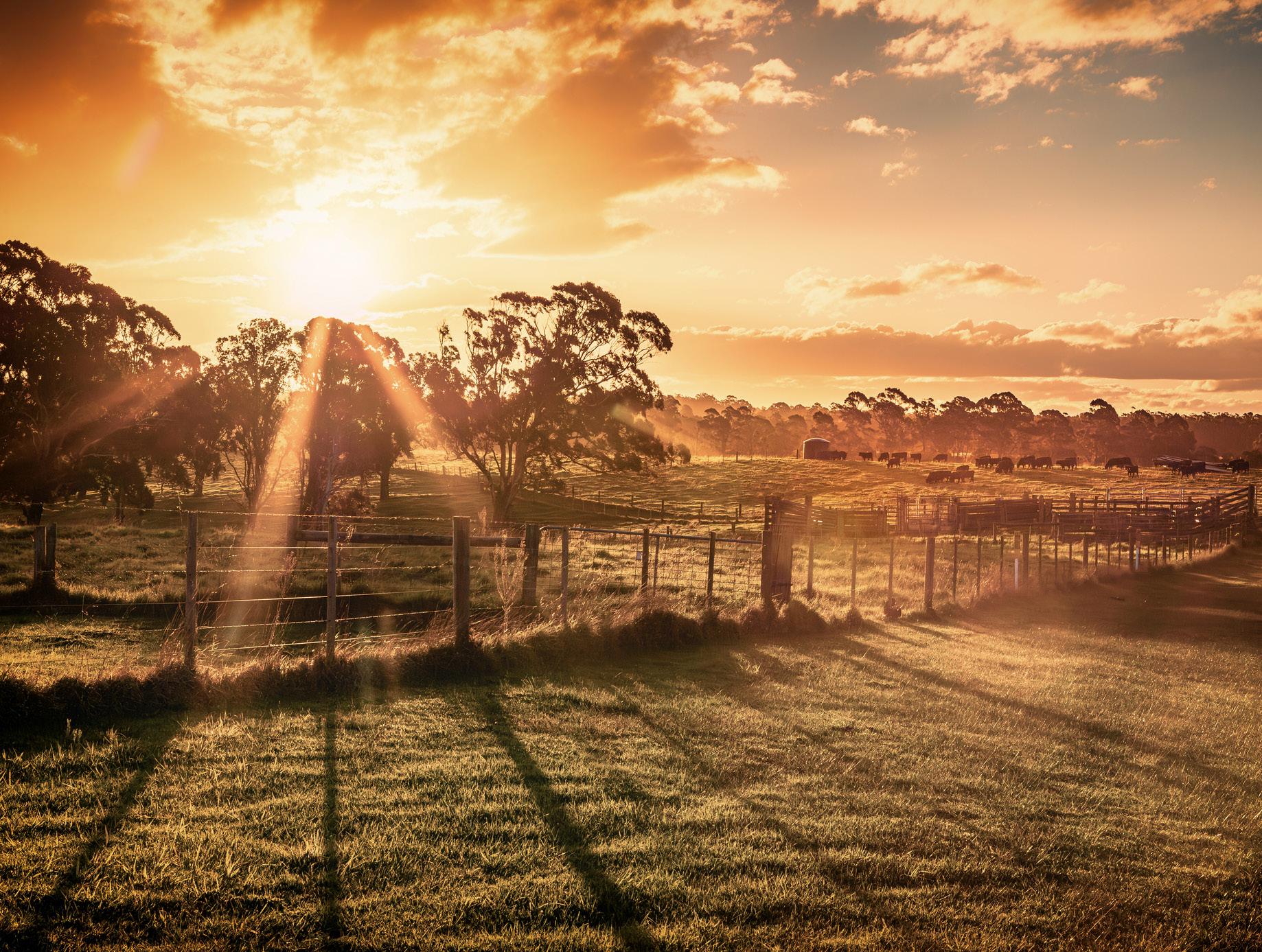
A robust first quarter for South Africa’s agricultural sector
In a year where trade has dominated the headlines since the U.S. started imposing higher tariffs against its trading partners, agricultural export activity is worth paying close attention to. Encouragingly, the start of the year has remained positive for the sector. In the first quarter of 2025, South Africa’s agricultural exports totalled US$ 3.36 billion, up 10% from the same period a year ago, according to data from Trade Map. This is a function of both higher volumes of various product exports and better commodity prices.
The products that dominated the exports list in the first quarter were mainly grapes, maize, apples,
pears, apricots, cherries, peaches, wine, wool, fruit juices, nuts, dates, avocados, pineapples, and beef, among other products. While the ports remain a challenge and require further improvement and investment, the agricultural export season in the first quarter experienced less friction than in the recent past.
From a regional perspective, the African continent maintained the lion’s share of South Africa’s agricultural exports in the first quarter of 2025, accounting for 45% of the total value. The products leading the exports list in the African continent were maize,
maize meal, sugar, apples and pears, fruit juices, wine, soybean oil, sunflower oil, oilcake, and wheat, amongst other products.
The EU was South Africa’s second-largest agricultural market, accounting for a 23% share. Grapes, apricots, cherries, peaches, nectarines, wine, apples and pears, wool, dates, figs, pineapples, avocados, mangos, guavas, fruit juices, and nuts were amongst the primary agricultural products South Africa exported to the EU in the first quarter of 2025.
As a collective, Asia and the Middle East were the third
largest agricultural markets, accounting for 16% of the total agricultural exports in the first quarter of 2025. The exports to this region primarily included apples and pears, grapes, wool, beef, apricots, cherries, peaches, nectarines, citrus, lamb, nuts, and strawberries, among other products.
The Americas region accounted for 6% of South Africa’s agricultural exports in the first quarter of the year. The main exported products include grapes, apricots, cherries, wine, fruit juices, nuts, apples and pears, and citrus.
Given ongoing concerns about South Africa’s participation in the AGOA (Africa Growth and Opportunity Act) trade arrangement and the current higher tariffs imposed by the U.S., it is worth highlighting that South Africa’s agricultural exports to the U.S. were still 4% in the first quarter of 2025 (which is part of the 6% exports to the Americas region we mention above).
The rest of the world, including the United Kingdom, accounted for 10% of South African agricultural exports in the first quarter of 2025.
South Africa does not engage in one-way trade. The country imports various agricultural products. In the first quarter of 2025, South Africa’s agricultural imports totalled US$ 1.94-billion, a 19% increase year-over-year, according to data from Trade Map. The increase resulted from higher value and volume of major products South Africa imports, such as wheat, palm oil, rice, poultry, and whiskies.
As we have argued before, South Africa lacks favourable climatic conditions for growing rice and palm oil and thus relies on imports of these products. Regarding wheat, South Africa imports nearly half of the annual consumption.
Meanwhile, imports account for around 20% of the annual domestic poultry consumption. Given the current ban on Brazil’s poultry imports, we may see an increase in volume from other regions, or a recovery in domestic production, as the local producers indicate.
Subsequently, when we account for the exports and imports, South Africa’s agriculture sector recorded a trade surplus of US$
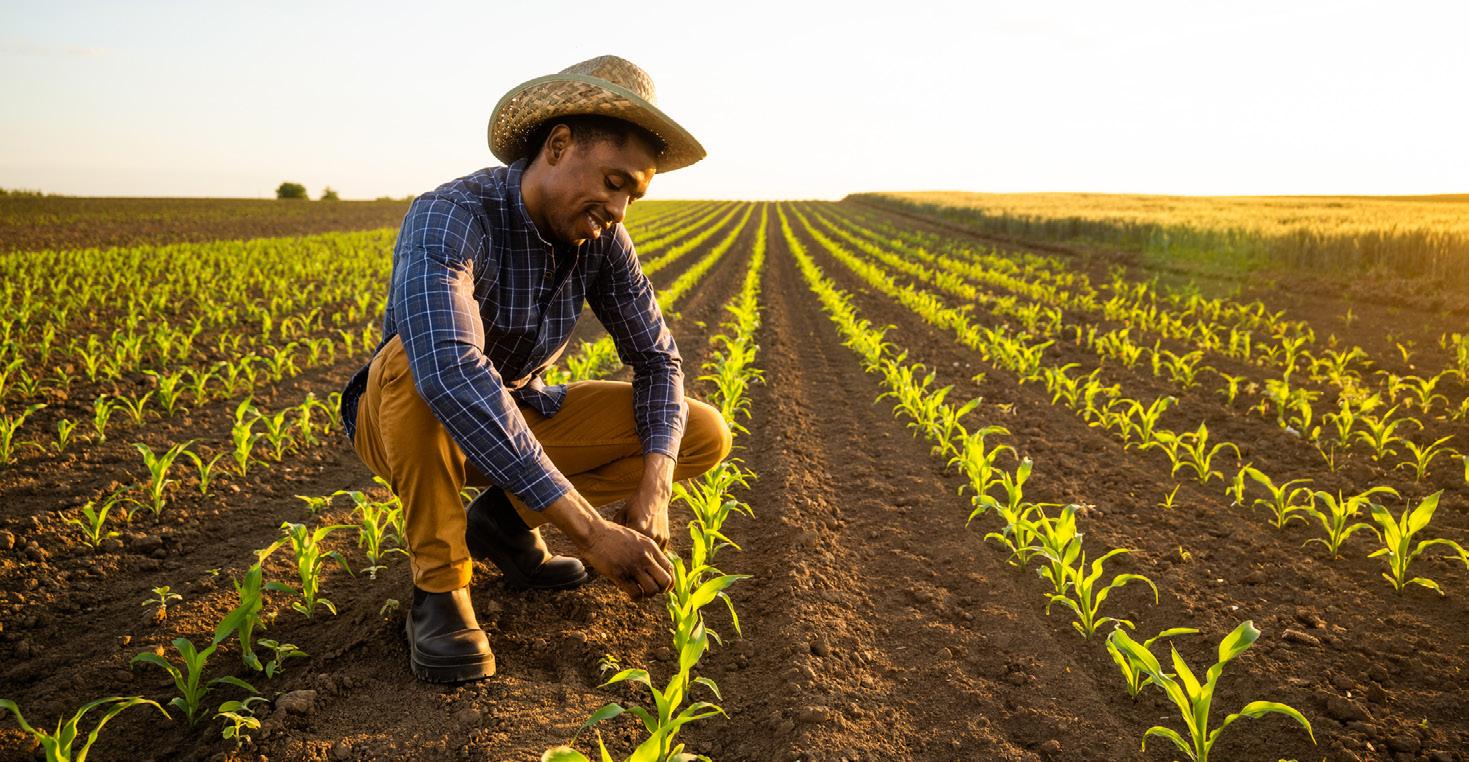
1.42-billion in the first quarter of 2025, down 1% from the previous year.
Policy considerations
In the current environment of heightened geoeconomic tensions, South Africa’s exportoriented agricultural sector must work to maintain its current export markets and expand into new ones. The focus for both policymakers and agribusinesses and organized agriculture should be on the following aspects:
First, South Africa should maintain its focus on improving logistical efficiency. This entails investments in port and rail infrastructure, as well as improving roads in farming towns.
Second, South Africa must work diligently to maintain its existing markets in the EU, Africa, Asia, the Middle East, and the Americas.
Lastly, South Africa should expand market access to some key BRICS countries, such as China, India, Saudi Arabia, and Egypt.
Wandile Sihlobo is the chief economist at the Agricultural Business Chamber of SA (Agbiz) and a senior fellow in Stellenbosch University’s Department of Agricultural Economics.

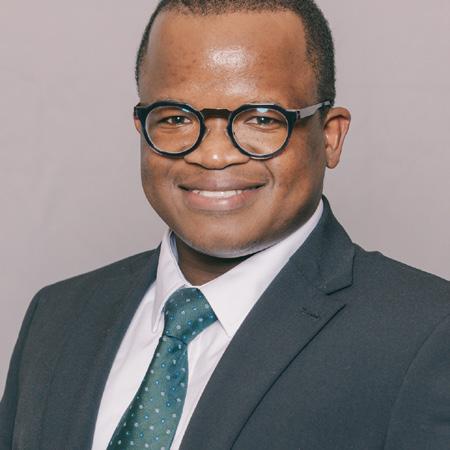
BY KOKETSO MAMABOLO
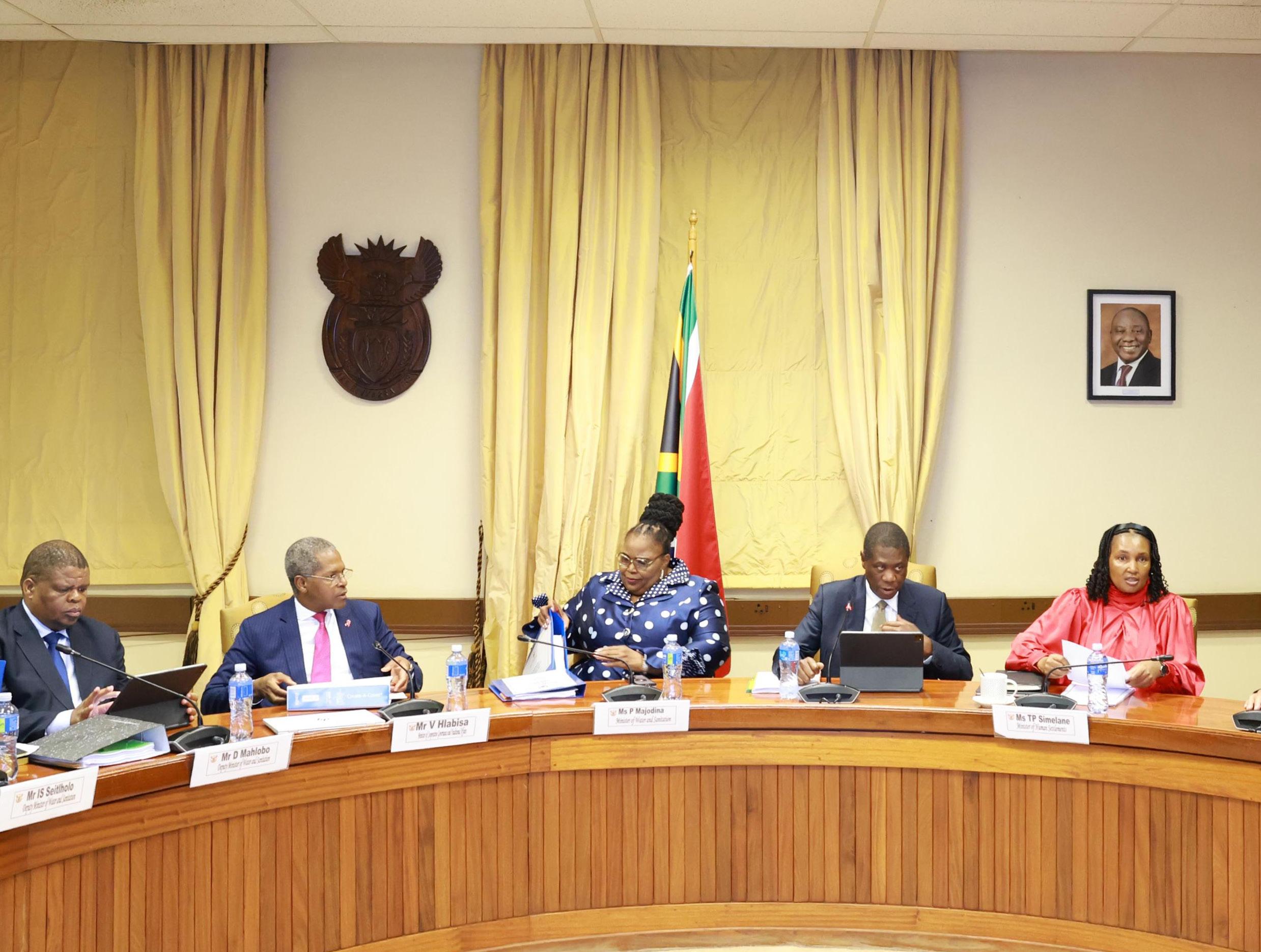
A green and digital future Operation Vulindela Phase II
Five years have passed since Operation Vulindlela was launched in response to stagnant growth and deficiencies in the state’s capacity as a result of the ‘nine wasted years’. The initiative’s goal is an ambitious one: implement structural reforms that could fuel much needed growth and create the kind of inclusive society which the Bill of Rights so eloquently describes.
The first wave - hailed as a success - prioritised 35 reforms in five areas which were chosen for their high-impact potential: electricity, logistics, telecommunications, water and the visa system. While government departments and agencies are responsible for implementing the reforms, a dedicated unit was created between National Treasury and the Presidency to monitor
progress and offer support. An impressive 94% of reforms have either been completed or on the way to completion and according to the Operation Vulindlela Unit, R500-billion in investment has been unlocked as a result of those reforms.
The energy system has been renewed through the Electricity Regulation Amendment (ERA) Act and last year saw the
A meeting of the Water Task Team established to deal with the municipal water crisis

establishment of the National Transmission Company of South Africa, to bring competition into the industry to reduce energy costs and improve efficiency. Notably, NECOM’s implementation of the Energy Action Plan has made loadshedding almost a thing of the past.
Along with the energy crisis, the logistics crisis has been another hindrance to economic growth. Transnet’s weakened capacity has resulted in a ballooning road freight subsector that has filled the gap which the rail network is unable to, and the same can be said for commuter rail which has been supplanted by the bus and
taxi industry which has resulted in a heavier financial burden on consumers.
The National Rail Policy, adopted three years ago, is aimed at reforming the sector with a focus on modernisation of the system, opening up third-party access to the freight rail network and decentrallising operational control of the local and regional passenger rail network. The ports system is also a target for reform with efforts already underway to enable private enterprises to operate container terminals.
There have also been positive developments in the water and telecommunications sectors, including over R50-billion investment unlocked through an overhaul of the water use license system and R14.4-billion generated from the auction of spectrum. The visa system is also being revamped as a way to attract talent and boost tourism.
Altogether, it is hoped that the reforms prioritised in Phase I will boost economic growth in the medium term. According to the Bureau of Economic Research, these reforms could increase real GDP to 3.5% in the next five years. To make this a reality, the reforms which are progressing well need to be completed but, admittedly, it is not enough. More needs to be done. Which brings us to Phase II.
The next step
Phase II builds on the momentum from Phase I, while adding a focus on improving service delivery at the local government level, addressing spatial inequality in cities and using digital public
infrastructure to stimulate growth and inclusion.
“South Africa’s growth over the next five years will be green and digital. By investing in the energy sector, particularly solar and wind resources, the country can reduce energy costs and support green manufacturing while driving growth and job creation,” reads the outline of Operation Vulindlela Phase II. “Additionally, with advanced infrastructure, South Africa is well-positioned to become a key player in the digital economy, creating jobs in business process outsourcing and digital services while encouraging a dynamic ecosystem for startups.”
While Operation Vulindlela is an initiative monitored and guided at the national level, it is at the local level where much of service delivery takes place. But more than half of the municipalities are in financial distress and 64 out of 257 are considered dysfunctional.
“The local government crisis reflects problems with the design of our local government system, leadership and internal capacity. Our system assigns a broader range of responsibilities and grants municipalities an unusually high level of autonomy compared to international norms.
“It is unusual by international standards for municipalities to be direct providers of water, sanitation and electricity services. These are typically provided by dedicated, professional utility companies. South African municipalities are expected to manage large and complex financial systems and to collect
BY KOKETSO MAMABOLO
a large proportion of their revenues, but few can do this successfully.”
Operation Vulindlela’s goal to move to a utility model, beginning with the metros, for supplying water and electricity. This could be in the form of a unit established within municipal or regional management or through concessions to private companies. The Municipal Systems Act already makes room for this process, with the amendment of the Water Services Bill being an example in the water sector.
“In the absence of professional utilities, municipalities often fail to invest adequately in infrastructure and lack the professional skills and systems required to operate efficient services.”
Measures will be put in place to professionalise the public sector at the local level which includes extending the Public Service Commission’s mandate to include enforcing regulatory compliance. The Department of Cooperative Governance and Traditional Authority has been tasked with reviewing the local government system and National Treasury will also be reviewing the fiscal framework to make it more
First Wave Progress
effective at the local level. The numbers show how important cities are for growth and job creation. They account for more than half of the country’s GDP and are home to more than 40% of the population. It is projected that the urbanisation rate will jump by 8% to 75% by 2030.
Operation Vulindlela’s goal is to address spatial inequality which has impeded full economic participation. Key to this is public transport, the direct and indirect costs of which place a heavy burden on households and make it difficult for job seekers to travel.
“Addressing spatial inequality and driving densification of urban areas is thus a key priority of of Phase II, enabling cities to be the drivers of economic growth and inclusion. Priority reforms include restoring passenger rail services to full capacity, strengthening housing policy, clearing title deed backlogs and utilising public land and buildings for affordable housing and development.
Digital transformation also has the potential to boost growth and promote inclusion through the use of technology to improve service delivery.
“To harness South Africa’s strengths in the digital and
• 94% - Number of reforms completed or progressing well
• R500-billion in new investment as a result of reforms
technology sector and drive digital transformation, a Digital Transformation Roadmap has been developed and approved by Cabinet.”
The roadmap includes plans for a new digital identity system, which will improve access to services such as healthcare, realtime data exchanges between departments, and a modern payment system which National Treasury and the South African Reserve Bank have already begun work on.
As the reforms from Phase 1 continue to bear fruit, Phase II is set to take South Africa into an inclusive future. As President Cyril Ramaphosa said at the launch:
“The process of reform is never easy. It is often contested, especially by those with vested interests. Yet we have a simple choice to make. If we do not reform our economy, it will not grow and we will not create jobs. Unemployment will rise and poverty will increase.
“On the other hand, if we implement these reforms – if we do so swiftly and boldly – we will place our economy on a path of growth and renewal.”
• 22 500 MW - Private investment in renewable energy projects in the pipeline
• 51% - Reduction in the cost of data
• 90 - Number of days it now takes to obtain a water use license
Source: National Treasury and the Presidency)

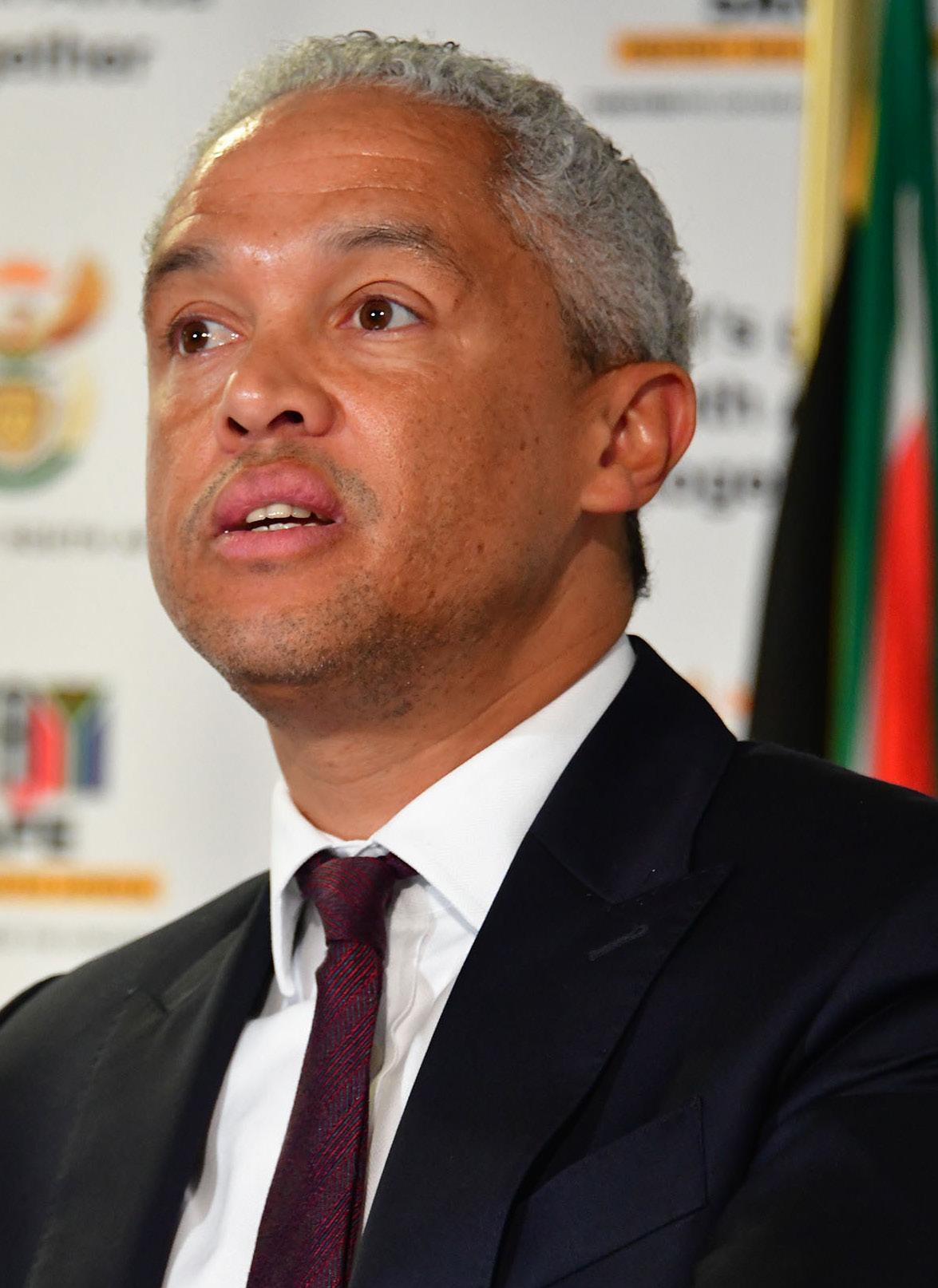
Treasury Director General, Duncan Pieterse, at the Phase II technical briefing
BY JESSIE TAYLOR

Air quality in South Africa
Balancing energy needs with health
South Africa stands at a pivotal juncture in its environmental and energy trajectory. The enactment of the Climate Change Act in 2024 signalled a national commitment to reducing greenhouse gas emissions and transitioning to a low-carbon economy. However, the subsequent granting of emissions exemptions to several Eskom coalfired power stations in 2025 has sparked significant debate over the country’s dedication to environmental health and sustainable development.
The tension between urgent energy needs and the imperative to protect air quality and public health underlines the complexity of South Africa’s energy landscape. Understanding the implications of the Climate Change Act alongside Eskom’s emissions exemptions is critical for public sector leaders, policymakers, and civil society as the country charts its path forward.
A legislative milestone
The Climate Change Act, assented to in July 2024 and operational from February 2025, is South Africa’s first comprehensive legal framework addressing climate change. It is designed to guide the country’s response to climate change mitigation and adaptation in a structured and accountable manner.
It allows for the establishment of carbon budgets for major emitters, including power utilities and industrial sectors, and spells out the mandates for provinces and municipalities to develop climate change response plans. The Act also cover the requirements for transparent monitoring, reporting, and verification of greenhouse gas emissions.
The Act aligns South Africa’s policies with the Paris Agreement goals, aiming for a peak in greenhouse gas emissions by 2025 and a net-zero target by 2050. It emphasises environmental justice and equitable economic transformation, recognising the disproportionate impact of pollution and climate change on marginalised communities.
In March, the Department of Forestry, Fisheries and the Environment (DFFE) granted temporary emissions exemptions to eight Eskom coal-fired power stations: Lethabo, Kendal, Tutuka, Majuba, Matimba, Medupi, Duvha, and Matla. These exemptions allow the plants to operate above the Minimum Emission Standards (MES) for defined periods - five years for six stations and until decommissioning for Duvha and Matla.
The DFFE emphasised that these exemptions are not indefinite or unconditional. They come with strict requirements including
• Enhanced air quality monitoring and reporting.
• Appointment of environmental health specialists to assess and mitigate health risks.
• Mobile health clinics to provide medical support to affected communities.
• Implementation of emissions reduction plans aligned with the Climate Change Act.
This decision reflects the current energy realities: Eskom’s aging coal fleet is central to South Africa’s electricity supply, and premature plant closures risk exacerbating load-shedding and economic instability. Eskom has argued that the financial burden of upgrading plants to comply with MES immediately is prohibitive, potentially diverting funds from the country’s renewable energy transition.

BY JESSIE TAYLOR
The human cost of coal
Despite these considerations, the health toll of coal-fired power plants remains a major concern. Studies by the South African Medical Research Council and international partners reveal elevated mortality rates, respiratory illnesses, and birth defects in communities near coal stations, particularly in Mpumalanga province.
Air pollutants such as sulphur dioxide, nitrogen oxides, particulate matter, and mercury have long-term impacts on lung function, cardiovascular health, and child development. Vulnerable populations - children, elderly, and those with pre-existing conditions - are disproportionately affected.
The exemptions raise fears that continued high emissions will exacerbate these health crises, increasing healthcare costs and undermining social development goals. Moreover, poor air quality affects labour productivity and educational outcomes, perpetuating cycles of poverty.

South Africa’s National Framework for Air Quality Management guides efforts to improve air quality through ambient air standards, emission inventories, and licensing of polluting activities. The Climate Change Act complements these efforts by integrating air quality with climate objectives.
Enhanced monitoring around Eskom plants, as required under the exemption conditions, is vital to track pollutant levels and health outcomes. Data transparency and community access to information can empower local action and ensure accountability.
New technologies such as low-cost sensors, satellite monitoring, and health impact modelling offer opportunities to improve understanding and management of air pollution risks.
South Africa’s journey towards cleaner air and sustainable energy is fraught with challenges but guided by a robust legislative framework. The Climate Change Act establishes a foundation for accountability and action, while Eskom’s emissions exemptions reflect the complexity of balancing immediate energy needs with environmental imperatives.
Sustained commitment, transparent governance, and inclusive stakeholder engagement are essential to realise the twin goals of energy security and improved air quality. Ultimately, the choices made today will determine the health, economic resilience, and environmental legacy of generations to come.






REGIONAL FOCUS: NORTHERN CAPE
BY JESSIE TAYLOR

Powering a sustainable future Renewable energy and its impact on the Northern Cape
The Northern Cape is fast becoming the heartbeat of South Africa’s renewable energy revolution. With its wide, open landscapes, abundant sunlight, and favourable wind conditions, the province is naturally positioned to lead the country’s transition towards cleaner, more sustainable energy sources. But beyond its climatic advantages, the Northern Cape’s commitment to renewables is also about socio-economic upliftment, skills development, and long-term infrastructure planning.
Renewable energy gains
A range of ambitious projects have put the province on the
map, including large-scale solar and wind farms that contribute significantly to the national grid. These initiatives are not only transforming South Africa’s energy profile but are also creating jobs, empowering communities, and attracting both local and foreign investment into the region.
• One of the most notable recent developments is the Scatec solar and battery storage facility in Kenhardt. This hybrid power project integrates 540 MW of solar photovoltaic (PV)
generation with 225 MW/1,140 MWh of battery storage capacity. What makes it groundbreaking is its ability to provide dispatchable electricity 24 hours a day - a key feature in stabilising the national grid. Under a 20-year agreement with Eskom, this project is not only helping to alleviate load shedding but is also setting new standards in renewable energy technology and reliability.
• Meanwhile, EDF Renewables has launched the Koruson projects, split into two

phases combining solar and wind generation with a cumulative capacity of over 940 MW. These multi-source projects offer a blueprint for integrated renewable energy models that can provide more consistent power and reduce reliance on coal. The development has also sparked auxiliary growth in the local economy, with increased demand for services, supplies, and skilled labour.
• SolarAfrica’s SunCentral project adds to the province’s growing portfolio. With an initial capacity of 342 MW and a roadmap to scale up to 1 GW, SunCentral is one of the largest solar developments in the Southern Hemisphere. The project is strategically located near De Aar, a town already playing a pivotal role in the national energy infrastructure. Besides the enormous potential for energy generation, such projects also signify a shift in how rural areas can be revitalised through green investment.
The economic impact of these projects on the Northern Cape is undeniable. Through the government’s Renewable Energy Independent Power Producer Procurement Programme (REIPPPP), more than 69 000 jobyears have been created, with the Northern Cape accounting for over 60% of them.
Promoting job creation
While many of these positions are tied to the construction phases of projects, there is a growing emphasis on sustaining jobs through operations,
maintenance, and component manufacturing. Furthermore, the renewable energy boom has led to the development of related industries, including solar panel manufacturing and localised supply chains, helping the province diversify its economic base.
In addition to job creation, community upliftment remains a cornerstone of the renewable energy agenda. Developers are required to allocate a portion of their profits toward socioeconomic development initiatives. These often take the form of educational support, health services, infrastructure upgrades, and support for small local businesses.
At the national level, President Cyril Ramaphosa has acknowledged the Northern Cape’s strategic importance in the country’s just energy transition. Speaking at the 2025 Sustainable Infrastructure Development Symposium South Africa (SIDSSA), the President reiterated the need to expand grid capacity to fully integrate the province’s renewable output into the national energy mix. He also called for increased investment in transmission infrastructure, warning that delays could hamper the full benefits of these green projects.
From an environmental standpoint, the benefits of renewable energy development in the Northern Cape are profound. By reducing the country’s reliance on coal-fired power stations, these projects are helping to curb greenhouse gas emissions and mitigate climate change. This is especially significant given that South Africa is one of the world’s most carbonintensive economies. The shift toward renewables also reduces local pollution, improving air quality and reducing health risks associated with fossil fuel use.
The Northern Cape is well on its way to becoming South Africa’s green energy capital. The provincial government, in partnership with national stakeholders, continues to prioritise the development of renewable energy hubs. Future plans include building a green hydrogen corridor and establishing localised energy storage facilities, positioning the province as a centre for energy innovation not just in Africa but globally.
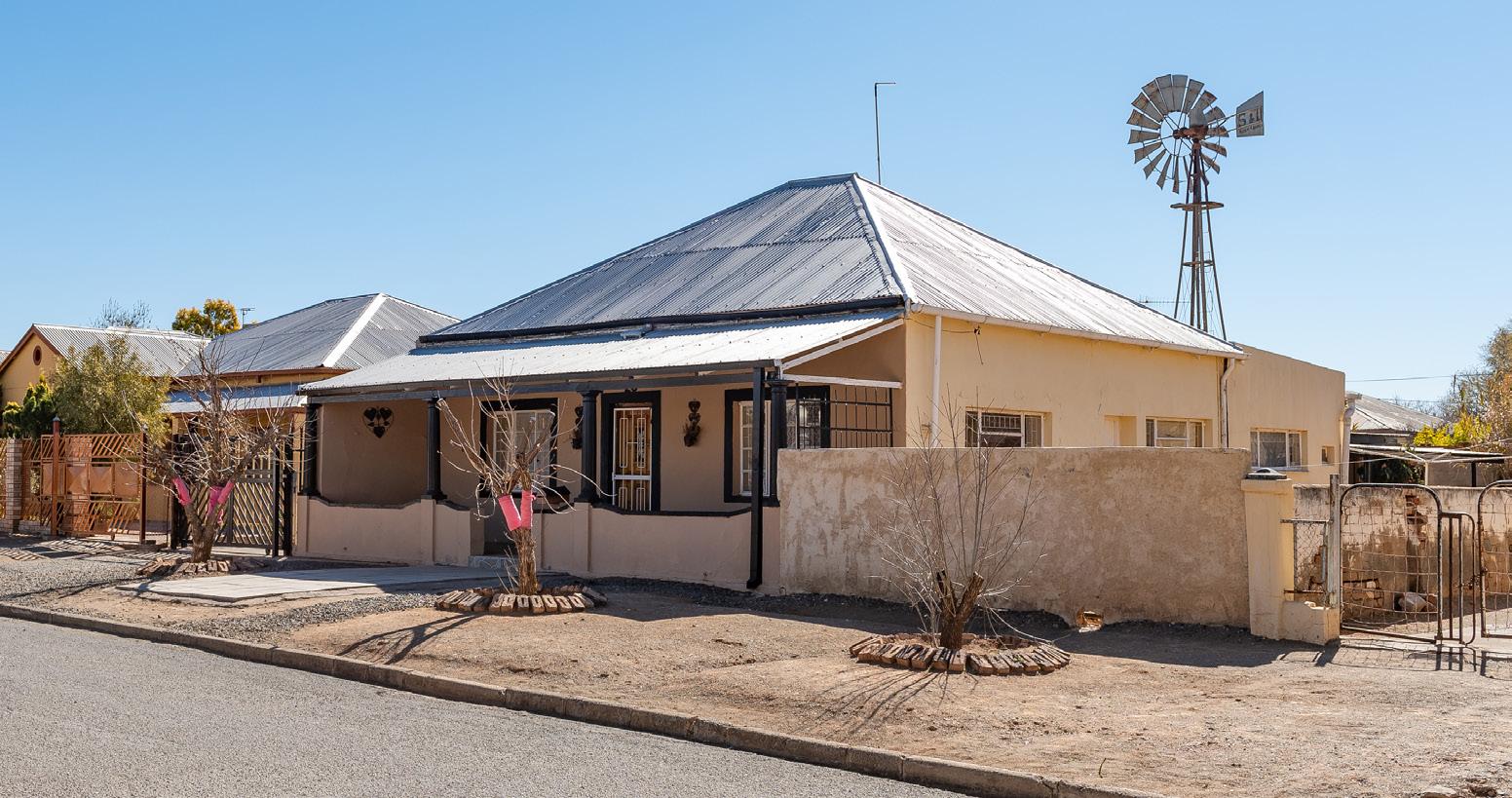
BY KOKETSO MAMABOLO

The world’s strongest man
Rayno Nel - South African Atlas
There he was in white takkies, fire engine red knee braces, wearing an orange tank top with his three letter name, Nel, in bold on the back above a South African flag. Next to the 1.91m, 148kg colossus was a man just as big, probably even bigger: the defending World’s Strongest Man, Tom Stoltman. Five pillars and five spherical stones stood between them and glory.
Each of the Atlas Stones is heavier than the one before, from 100kg to 160kg. The aim is to test both strength and endurance - to test the athletes physical limits. Lifting all five stones onto the pillars used to be rare, now it’s the standard. These are athletes who push their muscles to the edge - close to failure.
“It’s difficult to explain because you have to be able to get strong enough to get to this point where you can fatigue your central nervous system so I think there’s very few people who will understand what I’m explaining.”
Nonetheless, he’s been embraced like a hero from the moment he won. From breakfast television shows to radio interviews, YouTube channels and the SABC, Rayno has been big news, figuratively and literally.
Like many South African athletes he almost immediately takes on the role of an ambassador in a way that most of his fellow competitors aren’t required to - they become a different kind of civil servant. Here sport is a unifier because of a fractured past, and in that light athletes representing the country have a mission beyond just winning, they are also working to strengthen ties among all those who live in the country by giving them something to be proud of and to identify with. It’s bigger than sports.
“To represent [South Africa] in any way whatsoever, it feels surreal. I mean, we’re a small country with a lot of struggles. To have something like this I know means a lot to my people,” said Rayno, following his victory in Sacramento, California, becoming the first African to win the World’s Strongest Man competition, traditionally dominated by Europeans and North Americans, and part of an exclusive club of people who have done it on their first try.
All he needed was half a point to beat England’s Stoltman who finished second with 46.5 points with Canadian Mitchell Hooper coming in third with 43.5 points.
He will take home millions in prize money as he prepares for the Strongman Champions League finals with 6 wins in 7 competitions under his belt since his career began.
He hadn’t expected to win the big one, World’s Strongest Man, so soon, just two years after his professional rugby career came to an end. He was a burly flanker for the Cheetahs after a three-year stint as captain of CUT’s Varsity Cup side. Had his rugby career not ended in 2023, this director of engineering at Enfin Energy Finance - now doing his Masters in electrical engineeringwould not have been representing his country, nine days after his 30th birthday, just hitting the prime age for professional strongmen.
Akani Simbine flies the flag with his running cleats. Tatjana Smith does it through the water. Tasneem Solomons does it with a cue stick. Rayno does it with brute strength amplified by the kind of mental strength one needs to move such heavy objects. There’s the Flintstone Press, the Hercules Hold, the Knaack Carry and Hoist, and the Atlas Stones. He didn’t win every event, but he didn’t need to.
RAYNO’S RUN
BY KOKETSO MAMABOLO
Under the capable guidance of coach Raymond Mdaka, Amajita will head to Chile in September with confidence of being the best in Africa. They will need it with tough games ahead against European giants France, the USA, and New Caledonia. SPORTING ACTION
Amajita take over Africa
After a flat start, Bafana Bafana’s little brothers, Amajita, overcame Morocco in the final of U20 African Cup of Nations, having lost to the same opponents in the 1997 final which included the likes of Benni McCarthy. They lost their first outing in the tournament against Egypt, on Freedom Day, and then beat Tunisia (1-0) in the next game with a goal from Shakeel April. Amajita made light work (4-1) of the Sierra Leone side which had come off a 4-1 win over Egypt. Substitute Thabang Mahlangu’s goal was enough to beat Congo in the
quarter-finals, adding to the two he’d scored against Sierra Leone, and booking Amajita’s ticket to the FIFA World Cup which will be held later this year in Chile. They had another close encounter in the semi-final against Nigeria. In the end it was Stellenbosch FC defender, Tylon Smith, who was later voted player of the tournament, who scored the only goal of the game that sent Amajita to the final.
Gomolemo Kekana scored the only goal in the final with an assist from Golden Glove winner Fletcher Smyth-Lowe, the only overseas-
based player in the squad, who was also voted best goalkeeper at the COSAFA Cup tournament last year. He finished with four clean sheets and only three goals conceded in 7 games.
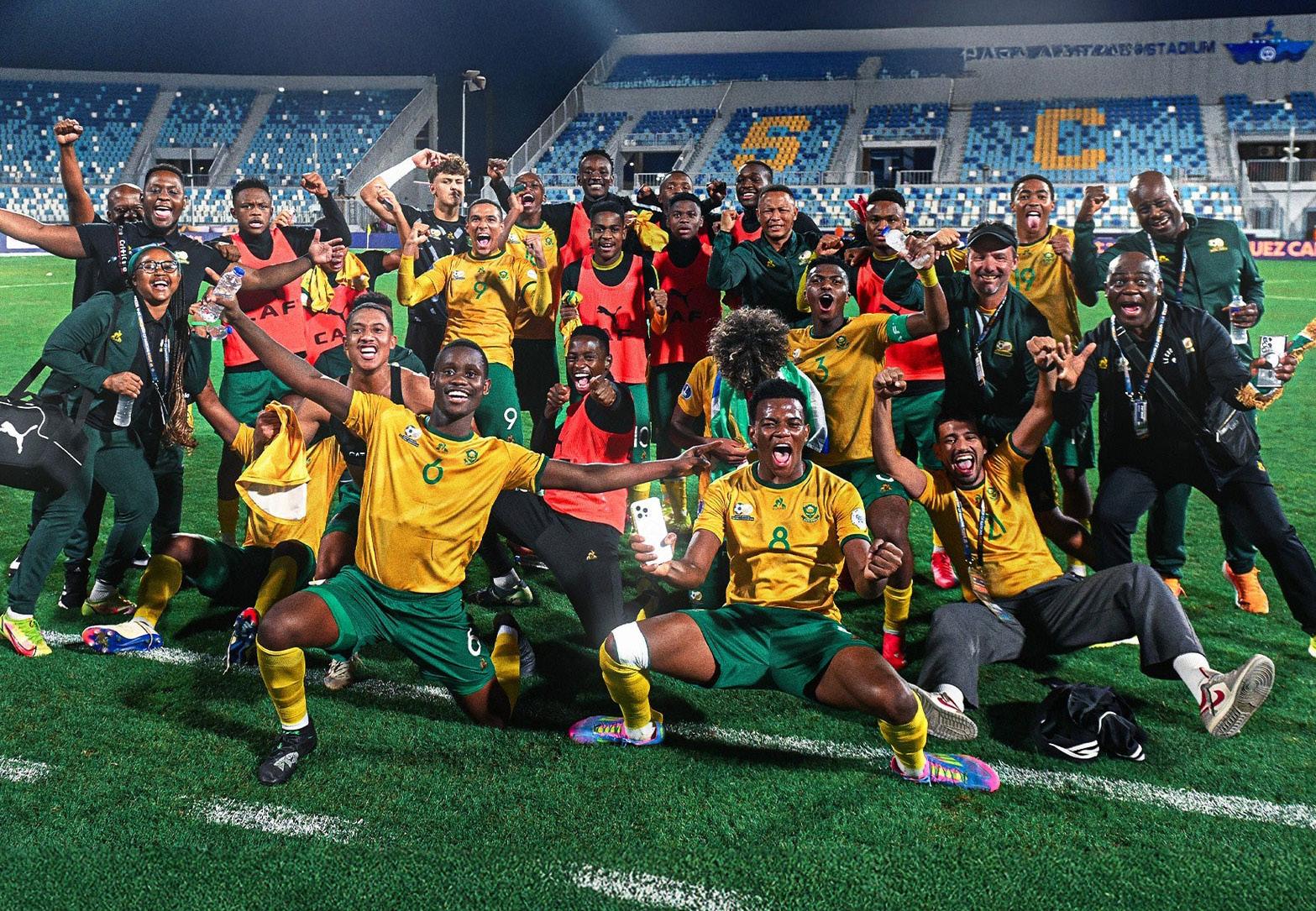
WHAT’S ON IN JULY
South Africa U19 vs Bangladesh U19 (1st ODI) 17 July
Men’s U20 World Championship
England U20 Men vs South Africa U20 Men
South Africa U20 Men vs Scotland U20 Men
9 July
July Internationals
Springboks Men vs Italy Men
5 July Rugby
Springboks Men vs Italy Men
12 July
Springboks Men vs Georgia Men
South Africa U19 vs Bangladesh U19 (2nd ODI) 19 July
Zimbabwe Men vs South Africa (T20) 20 July
SA U19 vs Bangladesh U19 (3rd ODI) 22 July
New Zealand Men vs South Africa Men (T20) 22 July
19 July Motorsports Cricket
Zimbabwe Men vs Proteas Men (2nd test)
6-10 July
Belgian GP 27 July
4 July Formula 1 Great Britain GP 6 July Moto GP German Cup 13 July
Zimbabwe Men vs Proteas Men (T20) 14 July
Proteas Men vs New Zealand Men (T20) 16 July

Czech Cup 20 July


BY JESSIE TAYLOR
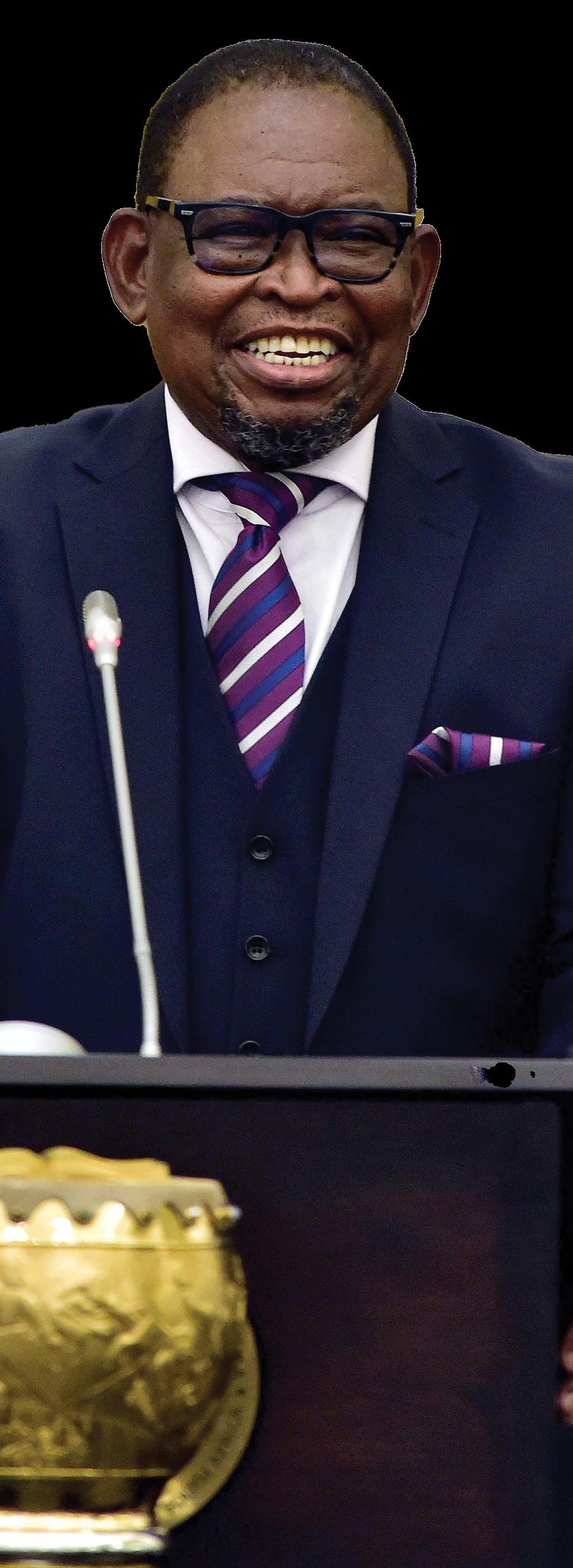
A pocket guide to Budget 3.0
South Africa’s latest budget, presented by Finance Minister Enoch Godongwana in May 2025, arrives at a critical juncture marked by economic uncertainty, political friction, and rising living costs. While the budget aims to balance fiscal discipline with social support, its implications for everyday South Africans are multifaceted, affecting everything from fuel prices and taxation to social grants and public services.
South Africa’s 2025 budget journey has been anything but straightforward. Initially tabled in February, the budget faced significant political resistance, particularly concerning a proposed 2% increase in Value-Added Tax (VAT). This opposition led to a postponement and subsequent revisions, culminating in what has been termed “Budget 3.0”. This final iteration reflects a series of compromises aimed at balancing fiscal responsibility with socioeconomic realities.
Here’s how the new budget could affect your pocket:
• Temporary reprieve of the VAT hike reversal
Initially, the government proposed a phased increase in the Value-Added Tax (VAT) rate, intending to raise it by 0.5 percentage points in 2025 and another 0.5 percentage points in 2026, elevating the rate from 15% to 16% over two years. This move aimed to generate
approximately R13.5-billion in additional revenue during 2025. However, the proposal faced significant opposition from coalition partners and the public, leading to its reversal in April 2025. While this decision provided immediate relief to consumers, it also resulted in a R75 billion shortfall in the national budget.
• Silent tax increase
While the VAT increase was withdrawn, the budget did not adjust personal income tax brackets for inflation. This omission results in “fiscal drag,” where taxpayers pay a higher effective tax rate despite no real increase in income. For example, an individual earning R33 078.75 per month will see their annual tax liability increase by nearly R10 000, effectively reducing their disposable income and purchasing power.
• Fuel levy increase
To compensate for the revenue gap left by the scrapped VAT hike, the government increased the general fuel levy by 16 cents per litre for petrol and 15 cents per litre for diesel - the first such increase in three years. This adjustment is expected to generate R3.5 billion in 2025/26. However, it indirectly affects consumers by raising transportation costs, which can lead to higher prices for
Hon. Enoch Godongwana, Finance Minister
goods and services across the economy. The Economic Freedom Fighters (EFF) have challenged this increase in court, arguing that it disproportionately impacts the working class and that proper parliamentary procedures were not followed.
• Higher costs for alcohol and tobacco
The budget introduced significant increases in excise duties on alcohol and tobacco products, exceeding the rate of inflation. These “sin taxes” are designed to discourage consumption of these products and generate additional revenue. For consumers, this translates to higher prices for alcoholic beverages and cigarettes, impacting household budgets.
• Incremental social grant increases
Recognising the financial strain on vulnerable populations, the budget includes above-inflation increases in social grants. The old age and disability grants have been raised to R2,315, while the child support grant has increased to R560. Additionally, the COVID-19 Social Relief of Distress grant has been extended for another year, providing continued support to those affected by the pandemic’s economic fallout While these increments provide some relief, they may not fully offset the rising cost of living, especially considering other budgetary
measures that indirectly increase expenses.
• Healthcare and defence: strategic allocations
In response to reduced international aid, particularly from the USA, the government allocated an additional R28.9 billion to healthcare, focusing on expanding HIV treatment programmes and supporting medical personnel. Additionally, R5-billion was earmarked to strengthen military capacity amid regional instability. These allocations aim to bolster essential services but also contribute to the overall fiscal pressure.
• Implications for small and medium enterprises
The budget presents a mixed bag for small and medium enterprises (SMEs). On one hand, the withdrawal of the VAT increase alleviates immediate cost pressures. On the other, the lack of personal income tax relief may reduce consumer spending, potentially impacting sales. However, increased infrastructure spending and new public-private partnership regulations could open up opportunities for SMEs to participate in government contracts and projects.
The National Treasury projects economic growth of 1.4% for 2025, down from the 1.8% forecasted in March. This subdued growth is
attributed to global economic uncertainties and domestic challenges, including high unemployment and energy supply constraints.
This slower growth, coupled with increasing debt servicing costs, limits the government’s ability to invest in infrastructure and social services. The budget deficit is expected to widen to 4.8% of GDP, and gross debt is projected to stabilise at 77.4% of GDP in 2025/26.
These figures underscore the delicate balance the government must maintain between stimulating growth and managing debt. The budget aims to address these issues through structural reforms and targeted investments, but the path to robust growth remains fraught with obstacles.
Budget 3.0 presents a complex landscape for South African consumers. While certain measures, like the reversal of the VAT hike and increased social grants, offer immediate relief, other adjustments, such as the fuel levy increase and unadjusted tax brackets, impose additional financial burdens. For consumers, this means carefully managing personal finances in an environment of cautious optimism and ongoing economic adjustments.

BY JESSIE TAYLOR
Fixed-term contracts Balancing flexibility with fairness in the workplace
In South Africa, employment relationships are governed by a framework that ensures fairness and clarity for both employers and employees. Central to this framework are contractual agreements, which set out the terms and conditions of employment.
Among these, fixed-term contracts are particularly common, especially in sectors where temporary staffing solutions are required. However, the law has imposed strict conditions on the use of these contracts to prevent potential exploitation and ensure equitable treatment.
Understanding fixed-term employment contracts
A fixed-term employment contract specifies a set duration of employment. This period may be defined by time, the completion of a specific project, or the occurrence of a particular event. Once the term ends, the contract naturally expires unless both parties agree to renew or extend it.
Several key pieces of legislation underpin the legal use of fixedterm contracts. These include the Labour Relations Act (LRA), the Basic Conditions of Employment Act (BCEA), and the Employment Equity Act (EEA).
The LRA, particularly Section 198B, directly addresses fixed-term employment and outlines the rights of employees under such agreements. The BCEA provides the foundation for minimum working conditions, including hours, overtime, and termination procedures. Meanwhile, the EEA promotes equal opportunity and
fairness in employment practices. Together, these laws create a structure within which fixed-term contracts can be legally and ethically applied.
Section 198B of the LRA is particularly important in determining how and when fixed-term contracts may be used. It requires that employers


have justifiable reasons for employing someone on a fixedterm basis. Common acceptable justifications include replacing an employee on leave, meeting a temporary surge in workload, fulfilling the needs of a specific project, or seasonal work demands.
Where a fixed-term contract exceeds three months, the employer must provide a valid reason for the extended term. Failing to do so may result in the contract being considered permanent.
Additionally, the law mandates that all fixed-term contracts must be in writing, outlining the contract’s duration, the reason for its fixed term, and any other relevant details. Employees under fixed-term contracts are also entitled to be treated no less favourably than their permanent counterparts doing similar work, unless a sound reason exists for the difference.
Should an employee be engaged under a fixed-term contract for more than 24 months, they are entitled to severance pay when the contract ends, unless they are offered permanent employment instead.
The employer’s obligations Employers must exercise caution when using fixed-term contracts to avoid violating employment legislation. Repeatedly renewing fixed-term contracts without valid reasons may lead to legal claims of unfair dismissal.
In such cases, employees may argue that their ongoing work created a reasonable expectation of permanent employment. To avoid this, employers must clearly communicate the temporary nature of the employment and the specific conditions under which the contract may be renewed or terminated. Compliance with labour laws is critical, not only to protect
employee rights but also to shield employers from legal disputes and potential reputational damage.
To manage fixed-term contracts effectively and reduce legal exposure, employers should adopt several best practices:
• All contracts should be documented in writing, clearly stating the duration and the justification for the fixed term.
• Employers should avoid excessive contract renewals. If the work becomes ongoing or permanent in nature, offering permanent employment may be more appropriate and legally sound.
• Fixed-term employees should enjoy equal access to benefits and opportunities as those in permanent positions, unless a justifiable reason dictates otherwise.
• Legal advice should be sought regularly to ensure that employment practices are up-to-date with current legislation.
Fixed-term employment contracts are a useful resource for organisations that require temporary staffing flexibility. However, their use is heavily regulated to ensure fairness and protect employee rights.
Employers who understand and comply with the provisions of the LRA, BCEA, and EEA will be better positioned to use fixedterm contracts responsibly. By doing so, they not only minimise legal risks but also contribute to building fair and equitable workplaces.
& WELLNESS
BY SUE RAMAUTHAR

Mind over muscle
How mental health influences performance and physical wellbeing
The body and mind are inextricably linked, and mental health can impact not just emotional wellbeing, but also physical function, movement, and overall vitality. As a physiotherapist working within a holistic framework, I see firsthand how psychological and physical health are two sides of the same coin.
Mental health challenges such as stress, anxiety, burnout, and depression often manifest in the body long before they’re fully acknowledged. People may present with unexplained muscle tension, headaches, back pain, jaw clenching, digestive issues, or chronic fatigue. These are not just physical complaints; they are the body’s way of expressing emotional distress.
Chronic stress, for instance, activates the sympathetic nervous system— the “fight or flight” response. When this becomes the body’s default mode, it leads to persistent muscle tension, reduced circulation, poor sleep quality, and impaired recovery. Over time, this can increase the risk of injury, reduce physical performance, and slow rehabilitation outcomes.
From a physiotherapy perspective, optimal performance is rooted in mobility, stability, strength, and recovery—all of which are compromised when mental health is poor. Clients under high emotional strain often exhibit:
• Poor posture and body mechanics, due to muscle guarding and stress holding patterns
• Decreased exercise tolerance and increased perception of pain
• Lower motivation to engage in physical activity
• Delayed healing and reduced adherence to rehab programmes
In athletes and employees alike, this mental-physical disconnect can result in reduced productivity, a greater risk of injury, and higher rates of absenteeism.
Movement as medicine
The good news is that the connection works both ways. Just as poor mental health can negatively affect physical wellbeing, physical movement can be a powerful tool for supporting mental health.
Exercise and physiotherapy-based movement strategies stimulate the release of endorphins, serotonin, and dopamine—chemicals that help regulate mood and emotional resilience. Even gentle stretching, breathing exercises, and mindful movement can shift the nervous system into a more relaxed, restorative state.
At the core of physiotherapy is functional movement—helping individuals move with less pain, more confidence, and greater freedom. As we improve physical
Sue Ramauthar is a corporate wellness practitioner and physiotherapist at SuedeWellness
mobility and reduce discomfort, we also help people reconnect with their bodies, regain a sense of control, and rebuild emotional confidence.
Holistic health means seeing the person as an individual, not as an injury, symptom, or diagnosis. As physiotherapists, we work collaboratively with dietitians, psychologists, and wellness professionals to address all aspects of a person’s wellbeing.
Health is not merely the absence of illness, but a state of dynamic equilibrium between the body, mind, and spirit. At work, on the sports fields, and in everyday life, supporting mental health is essential to enhancing physical performance and overall quality of life.
As we shift towards a more integrated understanding of health, physiotherapy plays a vital role in bridging the gap between physical and mental wellbeing—helping people move better, feel better, and ultimately live better.

BY JESSIE TAYLOR
5 JUNE
World Environment Day
World Environment Day is the United Nations’ principal platform for encouraging worldwide awareness and action to protect our environment. In 2025, the Republic of Korea will host the event, marking its second time leading the global celebration. The day serves as a reminder that time is running out to address environmental challenges, with nature in emergency mode due to climate change, biodiversity loss, and pollution. The 2025 campaign urges individuals, communities, and governments to take decisive action to restore ecosystems and promote sustainable living. By participating in World Environment Day, stakeholders can contribute to a global movement to make peace with nature and ensure a healthier planet for future generations.
8 JUNE
World Oceans Day
World Oceans Day highlights oceans’ critical role in sustaining life on Earth. The 2025 United Nations Ocean Conference, scheduled for 9 to 13 June in Nice, France, will focus on finding solutions to conserve and sustainably use the oceans, seas, and marine resources. The day serves as a call to action to protect our oceans from the growing threats of pollution, overfishing, and climate change. By raising awareness and encouraging global collaboration, World Oceans Day aims to foster a sense of responsibility and stewardship for the health of our oceans, which are vital for food security, climate regulation, and biodiversity.
16 JUNE
Youth Day
Youth Day in South Africa commemorates the bravery and activism of thousands of students who participated in the Soweto Uprising of 1976. On that day, young people took to the streets to protest against the apartheid regime’s imposition of Afrikaans as a medium of instruction in schools. The peaceful protest turned violent when police opened fire, killing hundreds — most notably, 13-year-old Hector Pieterson, whose image became an iconic symbol of resistance. Youth Day is more than a memorial; it is a powerful reminder of the role young people have played, and continue to play, in shaping South Africa’s democratic journey. It highlights the importance of giving youth a voice in decision-making and ensuring their access to quality education, employment opportunities, and mental health support. Each year, the South African government uses Youth Day to launch programmes to empower young people and address issues such as unemployment, skills development, and social inclusion. The day also inspires new generations to become active citizens who contribute positively to the country’s growth and transformation. In remembering the past, Youth Day encourages a commitment to justice, equity, and opportunity for all young South Africans.

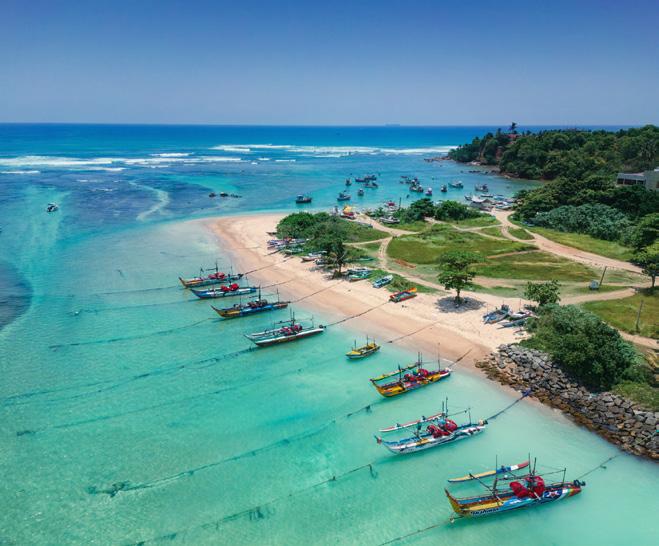

Calendar
20 JUNE
World Refugee Day
World Refugee Day, observed on 20 June, honours the strength and courage of people who have been forced to flee their home countries to escape conflict, persecution, or natural disasters. The day serves as a reminder of the resilience of refugees and the importance of providing them with support and protection. It also highlights the need for global solidarity and shared responsibility in addressing the challenges faced by refugees. By raising awareness and fostering empathy, World Refugee Day encourages governments, organisations, and individuals to take action in creating inclusive communities and ensuring that refugees have access to the resources and opportunities needed to rebuild their lives.
27 JUNE
Micro-, Small and Medium -sized Enterprises Day
Micro-, Small and Medium-sized Enterprises (MSMEs) Day recognises the vital role that small businesses play in achieving sustainable development goals, promoting innovation, and providing employment opportunities. MSMEs are often considered the backbone of economies, especially in developing countries, where they contribute significantly to job creation and economic growth. The day aims to raise awareness about the challenges faced by MSMEs, such as limited access to finance, markets, and information, and to promote policies that support their growth and sustainability. By empowering MSMEs, we can foster inclusive and resilient economies that benefit all members of society.
30 JUNE
International Day of Parliamentarism
The International Day of Parliamentarism commemorates the establishment of the InterParliamentary Union (IPU) in 1889. The day celebrates the role of parliaments in strengthening democracy, promoting transparency, and ensuring that governments are accountable to the people. It also serves as an opportunity to reflect on the progress made by parliaments in becoming more representative, including efforts to increase the participation of women and young people in political processes. By recognising the importance of parliamentary institutions, the day encourages continuous improvement in legislative practices and the promotion of democratic values worldwide.


